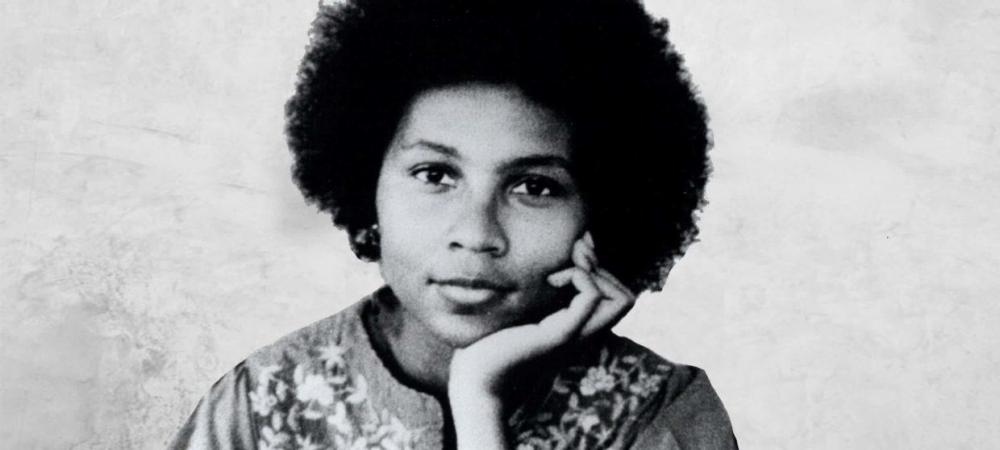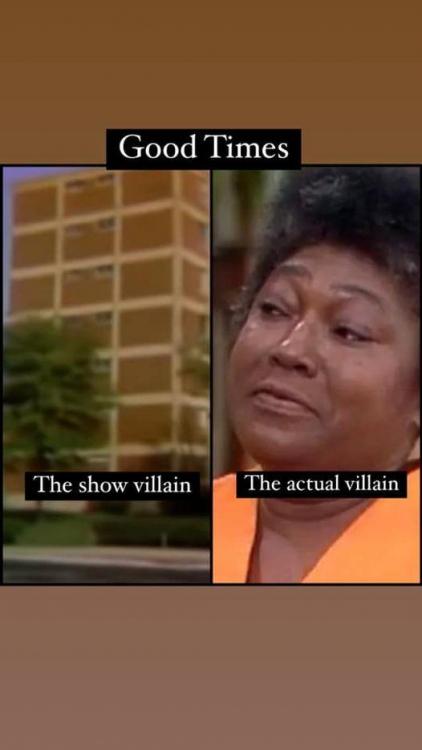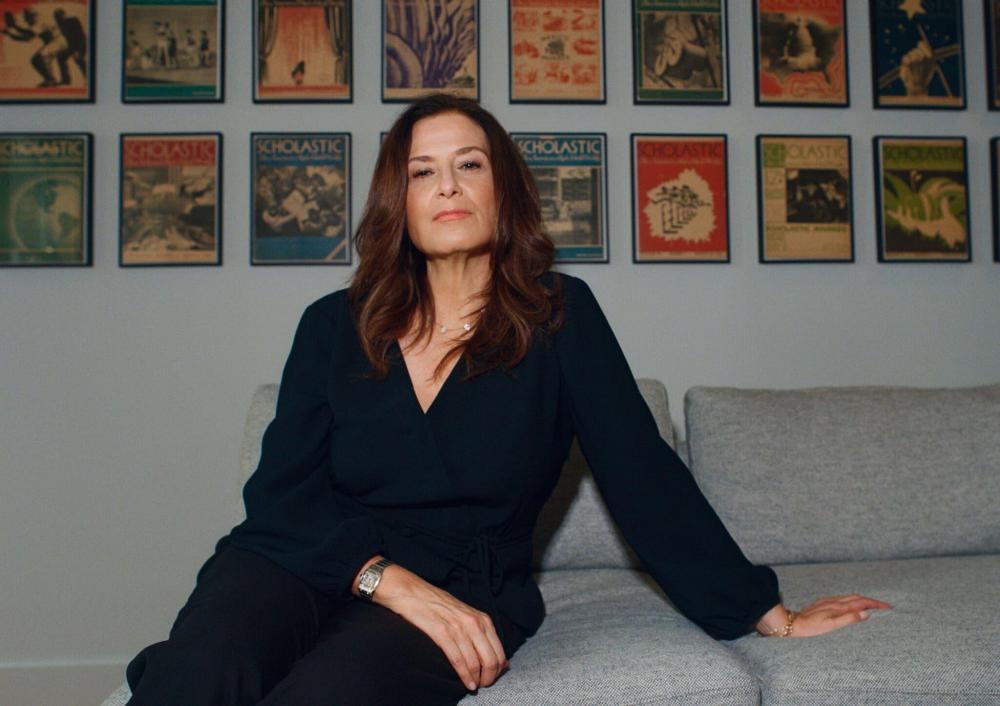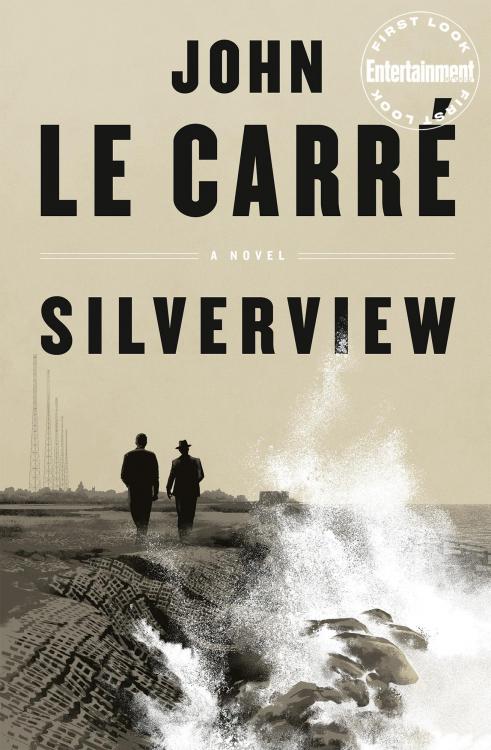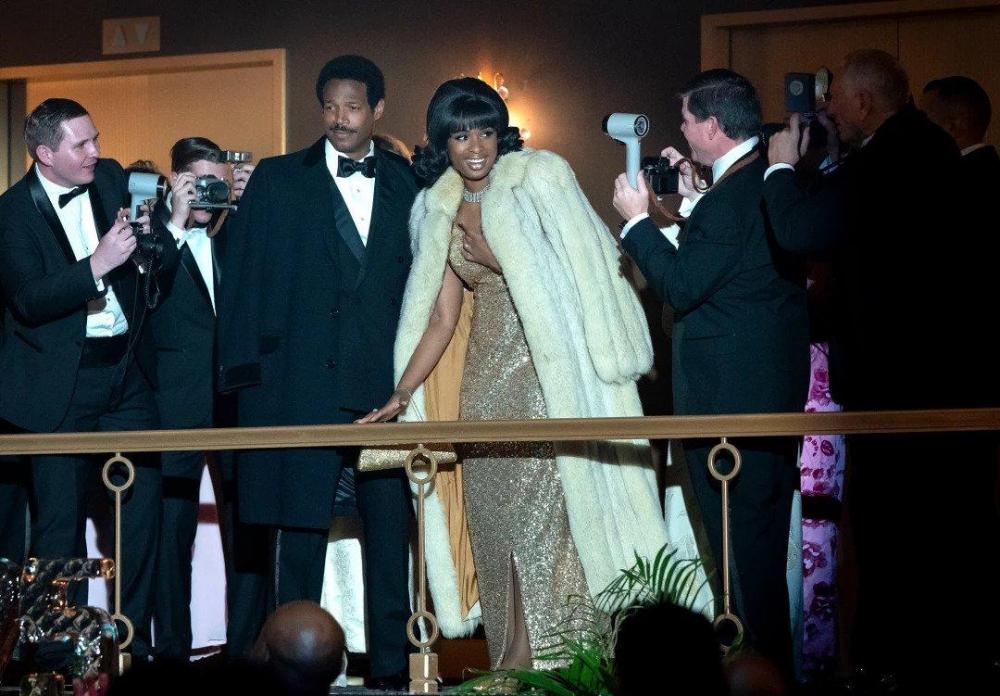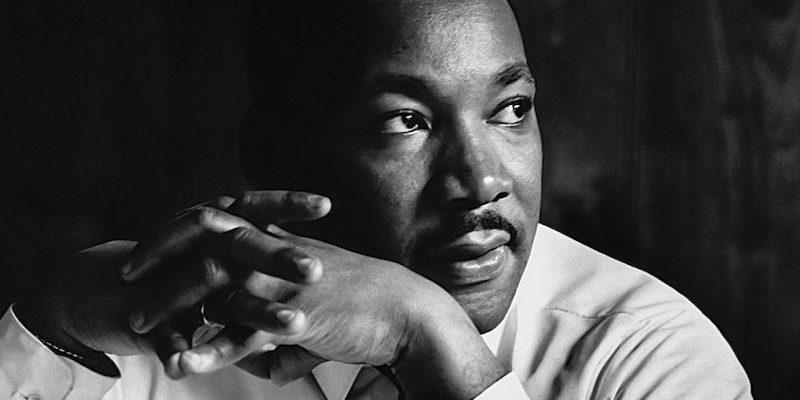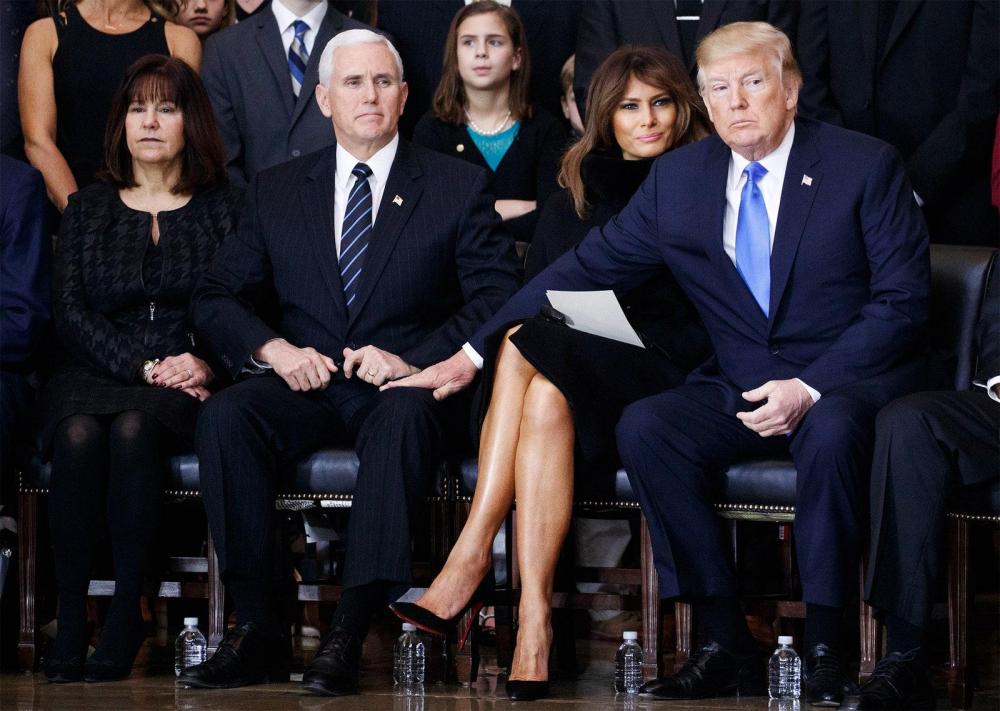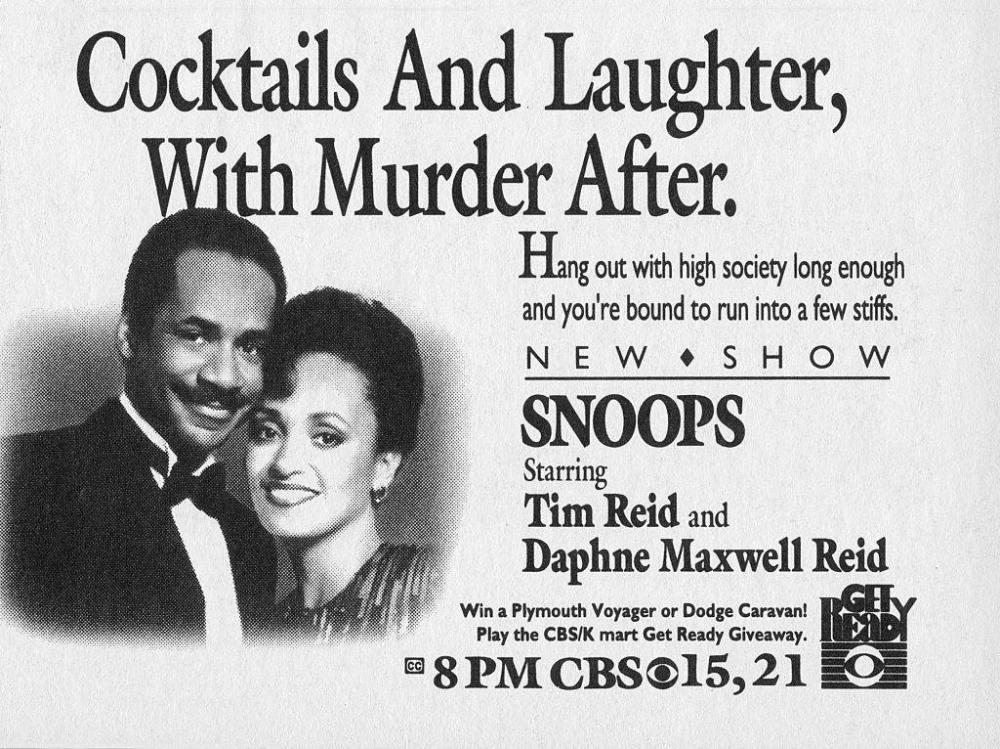Search the Community
Showing results for 'frank james' in content posted by richardmurray.
-
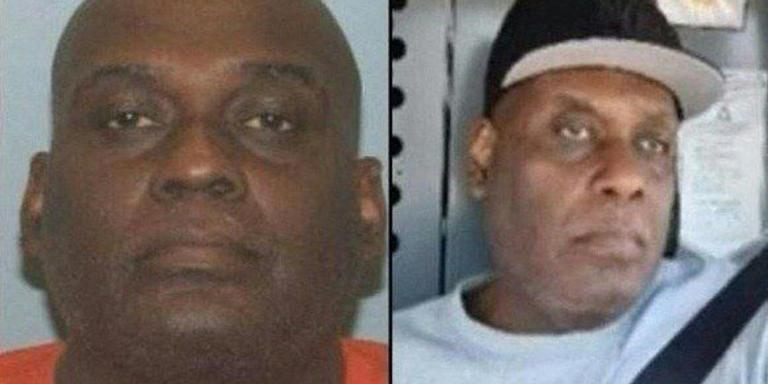
I don't know if Frank James was the shooter in the subway, but if he was, he offers an interesting query challenge.
NYC's black community always had black people in it, who love to suggest a usage of violence is incorrect. The reason why is complicated, it isn't merely about right or wrong. But, one of the juxtaposes between white controlled media of nyc /the black church in the black community of NYC/black employed class in NYC is the idea of gun violence in the Black community as something of youth. The narrative is, the youth must get the violence out of them. But, Frank James is sixty something years old. Frank James was an elder teen in the 1970s. So Frank James is not a Black person who is without a decades long look at the Black community in NYC, in NYS, in the USA and with that a high potential for a very honest while negative appraisal of many things in this area.
Many will suggest mental imbalance, as in NYC that is suggested for anyone who is violent. From white media to many or most black homes in NYC, mental dysfunction or imbalance is always the reason behind any violence as if, being violent can not be from a mentally sane person, which of course is a lie.
A FORUM POST
- Show previous comments 6 more
-

@Stefan It all boils down to a simple question.
Is the Black Individual free to do as they want in the USA today? For many black people, I don't think most but I can be rong, in the usa the answer is yes. I say this with offline conversations in mind side other Black folk in the usa. Sequentially, if you are Black in the usa and you feel the Black Individual is free to be in the usa, then you may view the power of the White collective is between nonexistent/mute/irrelevant.
White power is not an individual force. It is collective, and thus the only way Black people can defend themselves from it is with Black power. but Black power requires a Black communalism/collectivism that by default is against how many Black people in the USA interpret being an individual in the USA.
-
Dude, please stop using that word sequentially. Because you're employing it incorrectly.
And cut down on your word count. Stop insulting your readers as if they are completely clueless about the world.
You honestly sound as if you are speaking to fourth graders or folks who were magically transported here from a hidden jungle or a cave. -

-
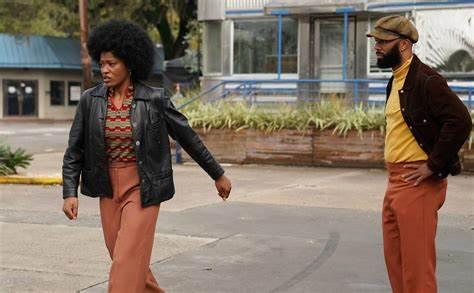
MY THOUGHTS to Alice 2022
First to history,
Mae Louise Walls Miller is the name of the Black woman whose life, in my opinion, was a prime source to the research from Antoinette Harrell, who spanned many Black individuals in slavery or criminal bondage. I must say that first as the authors or content creators to many, most I viewed or read, articles/videos about the alice 2022 film didn't seem able to mention the Black woman in question, whose real life story inspired the video fable or the black woman who researched her.
The story of Miller, in the articles below in more detail, displays one of the large problems when we assess usa history. Most problems in the USA are publicly known, but financial profit or fear blockade any action. The White community profited from black enslavement before or after the 13th amendment, and thus white individuals or groups were against opposed in any form, including merely speaking, to stand against abuses to blacks from the white community.Second to the law
Like mandates, proclamations are not laws in the usa legal system. Proclamations are public announcements by the government. Mandates are public orders by the government. Proclamations or mandates by default are contestable in a court of law as they are not laws. The 13th amendment is a law, and it ended slavery throughout the entirety of the usa but the penal system.
I quote:
"Section 1
Neither slavery nor involuntary servitude, except as a punishment for crime whereof the party shall have been duly convicted, shall exist within the United States, or any place subject to their jurisdiction.
Section 2
Congress shall have power to enforce this article by appropriate legislation."
Sequentially, the emanicpation proclamation has to stop being referred to as the moment slavery ended. From a legal standpoint, slavery has never ended, so black people saying it has is not being honest to the situation of the black community in the usa.Third to the video fable,
I keep hearing Donny Hathaway's to be young gifted and black in my head, when I see Common. Am I wrong?
Many of the articles seem focused on suggesting this as a faux history, when I see more of a Black film fiction circa 2000. For me the story of this film of a black women who thinks she is in the 1800s but is in truth, 1960s is clearly modern Black horror in the space of Get Out or US.
The poster and the words of the director clearly show this is a movie worthy of the roles Pam Grier played in the 1970s. A good revenge romp for fans of that genre or those with a penchant for black heroes in film.ALice 2022
written and directed by Krystin Ver Linden
Keke Palmer as Alice
Jonny Lee Miller as Paul Bennet
Common as Frank
Gaius Charles as Joseph
Alicia Witt as RachelARTICLES
TITLE: Black People in the US Were Enslaved Well into the 1960s
AUTHOR(S):Antoinette Harrell , at told to Justin Fornal
TIME OF PUBLISH: February 28, 2018, 12:00am
CONTENT: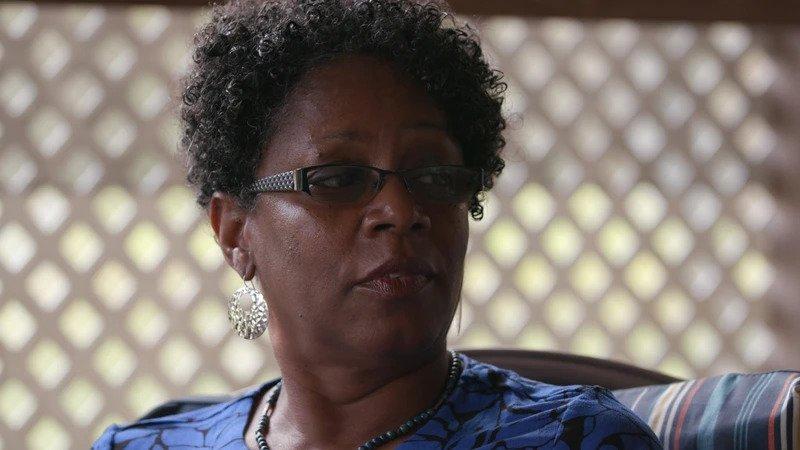
More than 100 years after the Emancipation Proclamation, there were black people in the Deep South who had no idea they were free. These people were forced to work, violently tortured, and raped.Historian and genealogist Antoinette Harrell has uncovered cases of African Americans still living as slaves 100 years after the signing of the Emancipation Proclamation. The 57-year-old Louisiana native has dedicated more than 20 years to peonage research. Through her work, she's unearthed painful stories in Southern states like Louisiana, Mississippi, Arkansas, and Florida. Over a series of interviews, she told Justin Fornal about how she became an expert of modern slavery in the United States.
My mother always talked to me about our family history and the family members who had passed on. She only knew so many stories, so oftentimes she would tell the same ones over and over again. Each time she repeated a story, I felt like she was trying to give me a message. It was like she was trying to tell me that if I wanted to know more about who we were, I would have to dig deeper.
We knew our family had once been slaves in Louisiana. In 1994, I started to look into historical records and public records. I found my ancestors in the 1853 inventory belonging to Benjamin and Celia Bankston Richardson. Written down alongside other personal belongings that included spoons, forks, hogs, cows, and a sofa were my great great grandparents, Thomas and Carrie Richardson.
Carrie and her child Thomas had been appraised at $1,100. Seeing my ancestor’s perceived value written on a piece of paper changed me. It also set forth the direction of my life. It was terribly painful, but I needed to know more. What did they do after Emancipation in 1863? Where did they go? I tracked down Freedmen contracts of the Harrell side of my family that proved that they were sharecroppers. Word started spreading around New Orleans about how I was using genealogy to connect the dots of a lost history. Soon enough people started requesting that I come and speak about how I was uncovering my family’s story so they could do the same for themselves. It became a chance to find out who we were and where we came from as descendants of enslaved people. This was a chance to learn a history we were never taught in school.
The only fact that seemed certain was that slavery ended with the passing of the Emancipation Proclamation in 1863. But even that turned out to be less than true.
One day a woman familiar with my work approached me and said, “Antoinette, I know a group of people who didn’t receive their freedom until the 1950s.” She had me over to her house where I met about 20 people, all who had worked on the Waterford Plantation in St. Charles Parish, Louisiana. They told me they had worked the fields for most of their lives. One way or another, they had become indebted to the plantation’s owner and were not allowed to leave the property. This situation had them living their lives as 20th-century slaves. At the end of the harvest, when they tried to settle up with the owner, they were always told they didn't make it into the black and to try again next year. Every passing year, the workers fell deeper and deeper in debt. Some of those folks were tied to that land into the 1960s.
I couldn’t believe what I was hearing. Most shocking of all was their fear. I saw time and time again, people were afraid to share their stories. They were afraid to give this information to me, even behind closed doors decades later. They believed that they might somehow get sent back to a plantation that wasn’t even operating anymore. As I would realize, people are afraid to share their stories, because in the South so many of the same white families who owned these plantations are still running local government and big businesses. They still hold the power. So the poor and disenfranchised really don’t have anywhere to share these injustices without fearing major repercussions. To most folks, it just isn’t worth the risk. So, sadly, most situations of this sort go unreported.
Six months after that meeting, I was giving a lecture on genealogy and reparations in Amite, Louisiana, when I met Mae Louise Walls Miller. Mae walked in after the lecture was over, demanding to speak with me. She walked up, looked me in the eye, and stated, “I didn’t get my freedom until 1963.”
Mae's father, Cain Wall, lost his land by signing a contract he couldn’t read that had sealed his entire family’s fate. As a young girl, Mae didn’t know that her family’s situation was different from anyone else’s. The family didn’t have TV, so Mae just assumed everyone lived the same way her brothers and sisters did. They were not permitted to leave the land and were subject to regular beatings from the land owners. When Mae got a bit older, she would be told to come up to work in the main house with her mother. Here she would be raped by whatever men were present. Most times she and her mother were raped simultaneously alongside each other.
Her father, Cain, couldn’t take the suffering anymore and tried to flee the property by himself in the middle of the night. His plan was to register for the army and get stationed far away. But he was picked up by some folks claiming they would help him. Instead, they took him right back to the farm, where he was brutally beaten in front of his family.
When Mae was about 14, she decided she would no longer go up to the house. Her family pleaded with her as the punishment would come down on all of them. Mae refused and sassed the farm owner’s wife when she told her to work. Worrying that Mae would be killed by the owners, Cain beat his own daughter bloody in hopes of saving her. That evening still covered in blood, Mae ran away through the woods. She was hiding in the bushes by the road when a family rode by with their mule cart. The lady on the cart saw the bush moving. She got off to find Mae crying, bloodied and terrified. That white family took her in and rescued the rest of the Wall’s later that night.
These stories are more common than you think. There were also Polish, Hungarian, and Italian immigrants, as well other nationalities, who got caught up in these situations in the American South. But the vast majority of 20th-century slaves were of African descent.
When I met Mae, her father Cain was still alive. He was 107 years old, but his mind was still incredibly sharp. A few times we sat together with Mae and the other siblings. It was a brutal catharsis for them to speak about what happened on that farm. I’ll never forget the look in their eyes when one would speak about a horror they endured. It was clear they had never shared their individual stories with one another. It was something that was in the past so there was never a reason to bring it up. One day Cain was watching the television, and there was a Caucasian man with stark white hair on the program. The way he looked must have reminded Cain of someone from the farm. Cain believed that because he had told me what happened on the farm that the man on the TV was going to come to his house and drag him back. Opening the suppressed memories upset him so much he ended up in the hospital. The family kept me away for a while after that.
But Mae and I became good friends and would lecture together. There were unusual ticks she had from her upbringing. Sometimes, when we would be at an event where there was free food, she couldn’t stop eating. She told me this was from years of not knowing when she would eat again. There were other times she would need to take her shoes off. She had grown up not wearing shoes and said sometimes her feet felt uncomfortable when she wore them. The nuances of Mae’s PTSD from growing up as a slave gave me a look into what life must have been like for many of our ancestors who were held under such inhumane conditions.
Mae died in 2014. She was a fearless beautiful spirit and has left a gigantic void. I am glad her brother Arthur is continuing to tell the Wall’s family story. People who hear these stories will often say, “You should have gone to the police.” “You should have run sooner.” But the land down here goes on forever. These plantations are a country unto themselves. The property goes from can't see to to can't see. Even if you could run, where would you go? Who would you go to?
Do I believe Mae’s family was the last to be freed? No. Slavery will continue to redefine itself for African Americans for years to come. The school to prison pipeline and private penitentiaries are just a few of the new ways to guarantee that black people provide free labor for the system at large. However, I also believe there are still African families who are tied to Southern farms in the most antebellum sense of speaking. If we don’t investigate and bring to light how slavery quietly continued, it could happen again.
There were several times when I returned to the property where Mae and her family were held. There isn’t much there anymore in terms of the farm.
One day I walked with Mae deep into the woods to see the old green creek she always spoke about. That filthy patch of water where the cows pissed and shit was the same water that Mae and her family drank and bathed in. As we stood together looking into the water Mae’s words were forever seared into my soul.
“I told you my story because I have no fear in my heart. What can any living person do to me? There is nothing that can be done to me that hasn’t already been done.”U.R.L.: https://www.vice.com/en/article/437573/blacks-were-enslaved-well-into-the-1960s
TITLE: The enslaved black people of the 1960s who did not know slavery had ended
AUTHOR: ISMAIL AKWEI
CONTENT: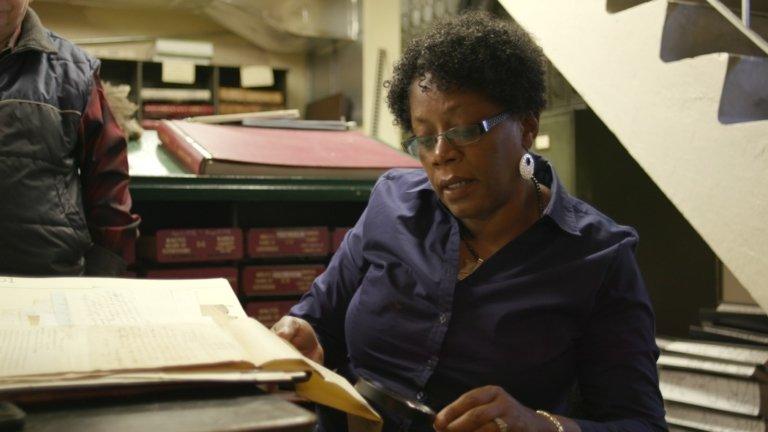
The Emancipation Proclamation of 1863 which changed the status of over 3.5 million enslaved African Americans in the South from slave to free, did not emancipate some hundreds who were slaves through to the 1960s.
This was revealed by historian and genealogist Antoinette Harrell who unearthed shocking stories of slaves in Southern states like Louisiana, Mississippi, Arkansas, and Florida over hundred years after the Emancipation Proclamation.
She told Justin Fornal that her 1994 journey of historical truth revealed the stories of many 20th century slaves who came forth in New Orleans when they heard that she was using genealogy to connect the dots of a lost history.
She said a woman introduced her to about 20 people who had worked on the Waterford Plantation in St. Charles Parish, Louisiana, as slaves until the 1960s.
“One way or another, they had become indebted to the plantation’s owner and were not allowed to leave the property … At the end of the harvest, when they tried to settle up with the owner, they were always told they didn’t make it into the black and to try again next year. Every passing year, the workers fell deeper and deeper in debt,” she said.
Many of them were afraid to share their stories as they believed they will be sent back to the plantation which isn’t even in operation. “People are afraid to share their stories, because in the South so many of the same white families who owned these plantations are still running local government and big businesses. They still hold the power.
“So the poor and disenfranchised really don’t have anywhere to share these injustices without fearing major repercussions. To most folks, it just isn’t worth the risk. So, sadly, most situations of this sort go unreported,” she told Justin Fornal and was published in art and culture magazine website Vice.
One of the 20th-century slaves was Mae Louise Walls Miller and she didn’t get her freedom until 1963. Her father, Cain Wall, lost his land by signing a contract he couldn’t read that enslaved his entire family.
They were not permitted to leave the land and the owners subjected them to beatings and rape. Mae and her mother were most times raped simultaneously alongside each other by white men when they go to the main house to work.
According to Harrell’s narration, Mae and her family did not know what was happening outside the land as they had no TV. Her father tried to flee the property, but was caught by other landowners who returned him to the farm where he was brutally beaten in front of his family.
When Harrell met Mae, her father was alive and he was 107 years old with a sharp memory. He beat Mae when she was 14 for attempting to flee the farm, an action whose consequence was beating of the entire family.
Mae, covered in blood, still run into the woods in the evening and hid in the bushes where a white family took her in and rescued the rest of her family later that night.
Harrell said the family suffered from PTSD as a result of their experiences. Mae died in 2014.
“I told you my story because I have no fear in my heart. What can any living person do to me? There is nothing that can be done to me that hasn’t already been done,” Mae told Harrell when they visited the property she and her family were held.
Antoinette Harrell believes “there are still African families who are tied to Southern farms in the most antebellum sense of speaking. If we don’t investigate and bring to light how slavery quietly continued, it could happen again.”
< https://video.vice.com/en_us/video/vice-the-slavery-detective-of-the-south/5a947b9cf1cdb3764f3eee86?jwsource=cl >
URL: https://face2faceafrica.com/article/the-enslaved-black-people-of-the-1960s-who-did-not-know-slavery-had-endedTITLE: Made in Frame: Inside Krystin Ver Linden’s Fiery Sundance Debut, “Alice”
AUTHOR: Lisa McNamara
CONTENT:
Utilize the link for the content, but the videos are placed immediately below< https://www.youtube.com/watch?v=rHqrOSTIovU >
< https://www.youtube.com/watch?v=OibZx09HYAA>
U.R.L. : https://blog.frame.io/2022/02/14/sundance-alice-krystin-ver-linden/
TITLE: Keke Palmer to Star in True-Story Thriller ‘Alice’
AUTHOR: Chris Gardner
CONTENT: Utilize the url below to read but I placed an image of Keke palmer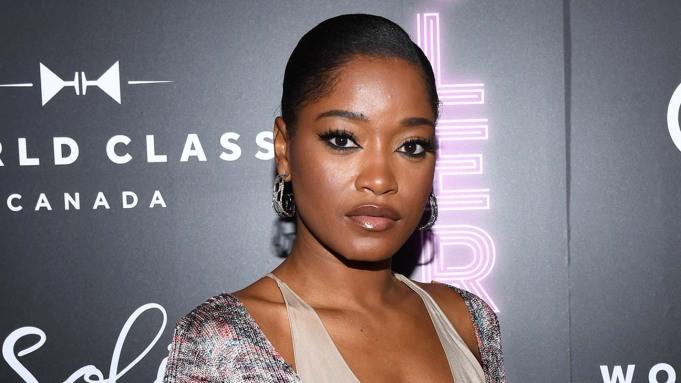
TITLE: ALICE (2022) Movie Trailer: Keke Palmer Escapes from Jonny Lee Miller’s Plantation in Krystin Ver Linden’s Film
AUTHOR: ROllo Tomasi
CONTENT: Utilize the url below to read the article, I placed the trailer and movie poster beneath.
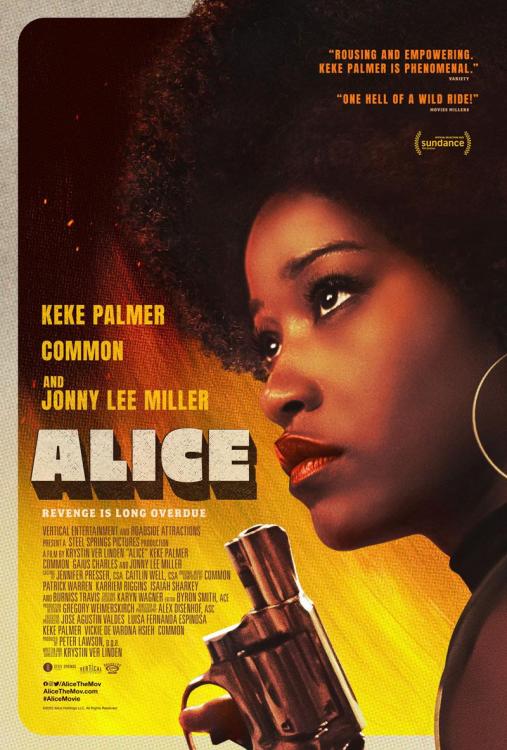
< https://www.youtube.com/watch?v=h5CHq89MPnE >
-

Brooklyn’s Lost Black City Of Weeksville: A Hidden Gem Of Pre-Civil War Black Excellence
Tucked away deep inside the history of one of New York City’s most famous boroughs is the extraordinary story of a little town called ‘Weeksville’.
Bilal G. Morris
Written By Bilal G. Morris
Posted January 17, 2022Many of our stories of Black Excellence are buried beneath the sands of time, never to truly be uncovered. But history leaves breadcrumbs, and if you follow them, you’re bound to find an amazing story.
Tucked away deep inside the history of one of New York City’s most famous boroughs is the extraordinary story of a little town called ‘Weeksville’.When we think of slavery we don’t usually think of New York, but the state didn’t end the practice until 1827. In 1801, Kings County, which today is known as the borough of Brooklyn, was still primarily under Dutch rule. More than one-quarter of the inhabitants were Black slaves. Nearly 60% of households in Kings County were slave owners.
Slavery in Brooklyn was vastly different than the plantation-style slavery adopted by southern whites. It was more ingrained into the northern culture and economy. Families usually owned a smaller number of slaves and the slaves usually lived in the same house as their owners. Families who did not own slaves would regularly rent them from their neighbors.
Although slavery was on its way out in New York, it was a way of life for thousands of Blacks who called Brooklyn their home. By 1820 there were just 518 slaves in New York City and a thriving free Black population of over 10,000. But in Kings County, there were 879 slaves, almost the same amount as free Blacks in the county.
During The Panic of 1837 wealthy white landowners began liquidating their holdings in fear of losing money on their assets and properties. Smart and savvy free Black men saw this as an opportunity and began to buy plots of land from wealthy whites who would sell.
In 1837 The Abolitionist and Black community leader Henry C. Thompson purchased 32 lots from wealthy Brooklynite John Lefferts. The Lefferts family estate was comprised of most of what is now known as Bedford Stuyvesant and Crown Heights section of Brooklyn.
A year later, Thompson would begin to sell the lots to free Blacks in Brooklyn, selling two of the lots to James Weeks a longshoreman with a vision of a self-sufficient Black community hidden within the slopes and valleys of Bedford Hills, secluded from the rest of Brooklyn. The seclusion would not only keep the town’s residents safe from the white and dangerous world around them but would also grant them the freedoms to build a self-sufficient community with education at the forefront.
By The 1850s Weeksville was home to more than 550 free Black People. It was the second-largest free Black community in Antebellum America. The town had one of the highest property and business ownership rates for any Black community in the country.
Weeksville was steeped in Black American history. The town’s school, Colored School No. 2, would eventually become PS 68, which after the Civil War would become the first integrated school in America. Weeksville was also home to the nation’s first Black newspaper the ‘Freedman’s Torchlight.
Susan Smith McKinney Steward, the first Black female doctor in the state of New York was a resident of Weeksville. Her sister, Sarah Smith Tompkins Garnet was Brooklyn’s first female school principal. Sarah Smith would also found the Equal Suffrage League of Brooklyn, the first suffrage organization for Black women in the nation’s history.
Along with economic prosperity, Weeksville also brought political opportunities for Blacks who had been strategically kept out of the process. In 1821 there was a $250 property requirement for Black men to vote. Establishing land in Weeksville gave Black men the opportunity to vote in elections they hadn’t been privy to in the past.
The community thrived and continued to grow throughout the 19th century, but Brooklyn was growing and would soon swallow Weeksville whole. By the 1880s, Weeksville was secluded no more and the Eastern Parkway was built leaving residents not much choice but to leave. By the 20th century, the town was nothing more than a memory.
But history has its breadcrumbs and if you take the time to follow them you can create a way to keep that history alive forever. In 1968, Pratt researchers found remnants of the lost city while flying over Brooklyn in an airplane. They located four homes on Hunterfly Road, which were the only homes left from the original town of Weeksville. In 1970, the Hunterfly Road Houses were designated New York City Landmarks and in 1971, all four houses were added to the National Register of Historic Places.
In 2005 The Weeksville Heritage Center was created, which offers tours of the homes, as well as public programs and exhibits to learn more about the history of Weeksville.
Thankfully, what was left of this pioneering small town will be preserved so that future generations can see that Black Excellence is sprinkled all over American history.
MY THOUGHTS
Black people whose forebears were enslaved in the American continent <canada to argentina> have a challenge in finding positive little towns where black people were happy but the reason why is against the theme of the article. the reason why shows how many black people were enslaved. The question is simple, do those black people whose forebears were enslaved focus on the majority of black people who were miserable/in pain , or do they focus on the one percent of the population of blacks who lived happy with a level of freedom whill ninety nine percent of black people were in living hell?Another interesting thing in media, when black people compose articles, why can't we say whites. The article writer used the word families, as if families could had been black/white/ or other. WHite families loaned Enslaved blacks. The aphenotypical linguistic or literary choices from black people in usa based media explains a lot.
Black American, Black being a phenotypical range, American being of the American continent <canada to argentina> , history is part indegenous/part enslaved/part european invader/part modern global economy immigrant
But for the most part the history of Black people in the white europan imperial age of the american continent is negative. That negativity shouldn't yield happiness in the hearts or minds of black people.
The only solution to lessening that negativity isn't a battle of philosophy or opinions, it is collective results, successful group actions, and the absence of successful collective results or group actions is the source of the continuance of anger/hatred/bitterness in the black american village.
So , what have you created with other black people most recently?
ARTICLE
https://newsone.com/4277359/weeksville-black-town-brooklyn/ -
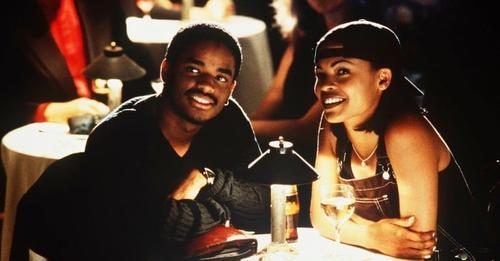
All were asked to the following article in the group Movies That Move We < https://www.youtube.com/channel/UCqYM90UgloorX_NbqqZRCfw >
Is there a film you would add to this list? Is there a film that you think shouldn’t be on this list? Name them and tell us why!
ARTICLE BEGIN
Five films that could never come out in 2022
OPINION: These movies aged like cottage cheese left out in the sun.
Dustin Seibert Jan 21, 2022
Being a Gen X-er/elder millennial all but demands that we scrutinize the media from our formative years.Unlike our Baby Boomer parents, who don’t really care as much about evolving social propriety, we tend to have an almost visceral response to the stuff we enjoyed in the 1980s and 1990s that didn’t age well. Presumably, it’s happened to us all: We watch the digital version of a film we used to wear out on VHS, or we stream a jam we used to own on cassette, only to clutch our teeth and let out an “Eeeeeeee.”
Below are several of those films that elicit such a response. In some cases, it’s one scene or plotline; in one case, you can just throw the entire film away. Note that this list is far from exhaustive and doesn’t include films in which the offensiveness is intended. (see: Blazing Saddles)Purple Rain (1984)
My favorite terrible movie of all time. I’ve seen Purple Rain more times than I can count over the last 38 years since my mama’s massive Prince fandom circumvented any concerns about her kid watching R-rated content.
But it was as an adult that I realized no one involved in the making of this film gave even a tincture of a damn about women. From The Kid’s interminable petulance (and ultimate violence) toward Apollonia (Apollonia Kotero) to tricking her into jumping topless in “Lake Minnetonka” to the marginalization of Wendy (Wendy Melvoin) and Lisa (Lisa Coleman) until it benefited The Kid, Albert Magnoli’s musical drama is steeped in Olympic-level misogyny.The worst scene, however, is when Morris (Morris Day) is confronted with one of his “sexies,” whom Jerome (Jerome Benton) picks up and tosses in a dumpster. Twitter would be on fire if, say, Bruno Mars made a movie pulling this s— in 2022.
The Best Man (1999)
Perhaps not as egregious as the other films on this list, but The Best Man delves into the Madonna-whore complex and what constitutes a “good” man, and, I think, inadvertently hoists up outmoded ideas.
The core conflict lies in a semi-fictional book that Harper (Taye Diggs) wrote based on his quartet of homies. Professional athlete and recovering man-whore Lance (Morris Chestnut) learns just before the wedding that fiancé Mia (Monica Calhoun) smashed Harper back in college while he was cheating on her left, right and sideways and is ready to blow the whole wedding to pieces over it. Because God forbid a woman demonstrates some sexual agency before she hangs it up.Shelby (Melissa De Sousa) is a one-note shrew of a girlfriend, and while the first film did well with Candy, the stripper with a heart of gold (Regina Hall) linking with the pusillanimous “good guy” Murch (Harold Perrineau), they throw the goodwill of that plotline out the window in the sequel, The Best Man Holiday, when Murch jeopardizes their marriage after receiving a video of Candy living her best sexual life before they met. Meanwhile, the capricious “bad guy” Quentin (Terrence Howard) is the only character living out their truth in either film.
The Best Man isn’t exactly unrealistic in its core depictions, but the original would light up social media if it were released in 2022.
Love Jones (1997)
Perhaps the most divisive film on this list (read: you might get cut amid debates), the entirety of Love Jones isn’t terribly problematic, and I appreciate the way it handles the complicated nuances of marriage via Isaiah Washington’s character.
But one sequence is a no-go: Larenz Tate’s Darius Lovehall shows up at the house of Nina Mosley (Nia Long) only because he jacked Nina’s address from a check she writes at the record store. And Darius’ girl, Sheila (Bernadette L. Clarke), who works at the record store, allows it.
The film presents it as a noble whatever-it-takes romantic gesture. But it screams “stalker,” and the 2022 version of Nina would’ve likely tased Darius in the nuts and called the cops.
Ace Ventura: When Nature Calls (1995)
Both of Jim Carrey’s star-making Ace Ventura films wouldn’t fly in the Age of Twitter—the first movie is rife with homophobia. But the sequel features a plotline involving a fictional indigenous African tribe whose customs are played for laughs in contrast to Ace’s western sensibilities. Any African stereotype you’d imagine white Westerners harbor is probably in the film.
Tommy Davidson portrays tribe member “Tiny Warrior,” speaking no actual words in lieu of animal noises meant to portray him as less human, more rabid rodent. That the film has the distinction of being America’s first exposure to the lovely Sophie Okonedo doesn’t absolve it of its sins.
Soul Man (1986)
The apotheosis of obsolete filmmaking, the most offensive thing about this film isn’t the fact that the protagonist Mark Watson (C. Thomas Howell) complains about tuition and fees at Harvard Law School totaling just over $10,000 (which will probably buy you one textbook and a sandwich in 2022).It’s that the entire conceit of the film involves a white man exploiting affirmative-action scholarship benefits by enrolling in and attending the school in blackface. Considering we’ve had a blackface reckoning in recent years that even caught up the beloved prime minister of Canada and that we’re forced to have the same god—m conversation with white folks every Halloween, Soul Man wouldn’t have made it past a first script draft in 2022.
Apparently, the film was even controversial when it dropped in the mid-1980s. But social media was decades away from being a thing, so it wasn’t around to prevent Soul Man from becoming a commercial success.
BONUS: Every black film that exploited LGBTQ+ people
It would probably blow the mind of your average 20-year-old to see how reckless Hollywood was with the LGBTQ+ community a couple of decades ago. Film and television were full of either latent or blatant examples of rank homophobia.A Low Down Dirty Shame (1994) featured Wayman (Corwin Hawkins), a gay Black man who existed only to be demeaned by Keenan Ivory Wayans’ Shame. The entire talky twist of The Crying Game (1992) involves the “reveal” of the deceitful trans woman.
Also, figure every film and television show involving a dude dressing up as a large, “unattractive” Black woman is predicated on some degree of transphobia. I’m looking at you, Wanda and Sheneneh.
ARTICLE END
A QUICK THOUGHT TO THE ARTICLE
It start with a lot of negative bias to those in certain age ranges, while supposes support to women from the physical violence or subjegation of men. It also has a large amount of cultural negative bias. Remember, race is any form of classification/rank/ordering from phenotype to gender to age to cultural beliefs to geography to releigion to religion to... you comprehend.
MY THOUGHTS TO EACH FILM IN THE LIST
Purple Rain is interesting. I remember hearing, a video recording of Prince, speak on a real event where a member of his team threw Vanity/Denise into his pool, and when I heard that story I thought of this scene. In the context of the article, it opens up alot in terms of the level of mysogyny.
But, the greater issue is misogyny. I saw a halftime show in which Purple Rain was chanted by many people who clearly were in the ambiance of the artist formerly known as Prince as well as their thoughts of loving ones whose spirits have flown, which the song alludes too.
Suggesting that this movie can not be seen, for a scene of abuse toward a woman from a man, is discounting how many people heard that song through the movie. Is it a wareranted sacrifice, I wonder?
As for Prince's characters mimicry of his father's abuse, that is actually the stories point. Prince's character was evolving in a film. Like bobba Fett from being the lone man killer that many of the characters fans demand or want to the killer who has gained from priceless experience a level of growth that in all living things, takes time.
The question is, does Prince's characters modulation not warrant to be seen? Is the argument from the philosophy the article writer espouses that the modern audience can not handle watching the change in a character, they can only accept witnessing the final result?I only saw a few scenes of the Best Man. I admit, I have little liking or patience to these black group film dramas. To those who enjoy that style of art it is entertaining but for me, I can't stomach it long as a genre.
I do know of the basic plot though. I don't see how the movie will be banned for portraying characters that share traits with many living people, in the same way, purple rain does to.
But that leads to another question, is this about presenting fantasy humans? I rephrase, is this movement of cancelling culture to only allow one cultural mold? if so, how can art be deemed in it free to express all culture?Love Jones scenario is like in the Best Man. Stalking is human, is it denied by not showing it in a film? and by not showing it is art improved.
I never saw any Ace Ventura film, so I admit, I can have it expunged as I am not a fan of jim carrey's comedy for the most part in general, yes I never saw Dumb and dumb series as well.
But to the theme, people who dislike homosexuals is not new nor will go away throughout all humanity. And, though few to no movies offer the reverse insult, many black people don't think positively of white communities.I want to speak about Rae Dawn Chong and James Earl Jones, when it comes to the film "Soul Man". Rae Dawn Chong contends the film isn't negatively biased. And this goes to the penultimate issue. In the end, who determines how another is meant to see the world/humanity/life?
This battle over what art should be viewed from the times when non white europeans were disallowed under white european domination or in the complex multiracial landscape of the usa, with each tribe trying to make one cultural perspective dominant, shows the dysfunction of the attempt. No culture ever truly dies, it at the most diminished becomes a private culture, but cultures never die.
Spike Lee and the impotent N.A.A.C.P. made this film a battleground but the issue of black owned film production or black people in the mechanics of the industry had no words from said people except one day it will happen or beg whites. Rae Dawn Chong was right, it was all talk. Talk for media points.A bonus, Al SHarpton who I do not usually concur too explained the idea behind the self righteous non violent movement, brilliantly. I paraphrase him. The non violent mantra is not merely about stopping those who utilize violence against you but not allowing yourself to utilize violence. This paraphrasing is the entire idea behind the bonus section in the article.
But, that is self righteous. To tell someone to hold themselves to a cultural view, regardless of anything is not only self rightoeus but goes back to the entire flaw of the cancel culture strategem or similar cultural blocks from the past from one community to another.
WHy don't black parents speak of Nat Turner or Jean Jacques Dessalines? what did either do wrong that does not warrant mention? they acted violently against those who were violent towards them?
Their actions have been cancelled by many black people long before cancel culture, but has that improved the collective lot of the black community, has it changed the lot of the white community ? the answer is no.NAME THE FILMS I WILL ADD? NAME THE FILMS THAT SHOULDN'T BE ON THIS LIST?
None and All. I will paraphrase a white jewish female writer: art can not be the battleground for culture.
I know she is right. Not seeing an action, does not delete an action. On the other hand, seeing an action does not embolden an action.
The whole concept of not showing certain arts based on the messages in them, is based on the idea that it will influence culture. But is that true?
I use two scenarios in human history as my proof they do not.
The Sars-Cov-2 era in NYC, specifically, when the city had a near total shut down of activity.
During that time in New York City, the advertised freethinking capitol in the United States of America, the levels of abuse from men to women, from adult male children to their senior female parents , rose by a huge percent. Was said increase of a certain activity based on a film? was said increase based on a music video or video game?
What does the first scenario prove? That misogyny's source is not media. When people were forced into their homes side their supposed loving ones they got more violent, not less. In particular men showed a increased dislike toward the women they live with, being forced to be next to them. IS media the source of the misogyny... or is it how we humans build or maintain relationships? The last point being, can not showing an action in media help to yield better relationships. I say no.The second scenario is media by people of color, people of color defined as non white europeans, in the age of white european imperial power. MEaning from the 1400s to the end of world war two < which began the first phase in the era of white statian imperial power, commonly called the cold war >
In the white european imperial power age people of color, made art that was often chastized, or burned, or blockaded from the view of people of color themselves, but they made it. This artwork didn't free people of color or stop white european power. But it was symbols of another culture than the one in power.
What does the second scenario prove? art doesn't change the alignments in humanity. It comes from the soul, and can inpsire humans, but can not deflect bullets, can not make laws. And it is bullets and laws that dictate the alignment of humans in humanity.Sequentially, I add no film to this and think all films should not be present in it. The list is dysfunctional.
I am not a NAzi, I have no desire to be white or german or aryan. But I think the night marches are beautiful from the nazis. The premise of waging cultural war through art is suggesting, the human individual or collective can be so moved by art that it dictates who they are or who they want to be. I oppose that viewpoint. I think history proves my opposition correct.Article U.R.L.
https://thegrio.com/2022/01/21/five-films-that-could-never-come-out-in-2022/
-
May your spirit fly high Bell Hooks
hooks’s family said contributions and memorials can be made to the Christian County Literacy Council < https://www.paypal.com/donate/?hosted_button_id=CGQPNACBYNRZA > , which promotes reading for children, or the Museums of Historic Hopkinsville Christian County < https://www.paypal.com/donate/?hosted_button_id=CGQPNACBYNRZA> , where a biographical exhibit is on display.
ARTICLE
https://lithub.com/bell-hooks-generous-feminist-thinker-has-died-at-69/
What It’s Like to Have Your Book Banned by the School Board
BY MARY HARRIS
DEC 13, 20213:06 PM
Ashley Pérez used to teach English, down in Texas. Back in the early 2000s, that meant assigning the so-called classics—To Kill a Mockingbird, Of Mice and Men, Shakespeare. I asked her whether there were any books she wouldn’t teach. “I didn’t teach from my district literature textbook at all. Actually, we used them as doorstops,” she said. “I think that when literature is put in a textbook, it stops seeming alive.”Pérez writes young adult books now, but the way she said that last bit—the way she talks about literature being “alive”—I felt like I was back in the classroom with her, feeling the muted thrill of AP English. Because Pérez taught mostly Black and Latino kids, she thinks a lot about how to make books like hers welcoming for all kinds of readers. That means thinking about the hidden messages her stories can send.
But finding Pérez’s book in a school library has gotten a lot harder over the past year. That’s because, as careful as she is about being inclusive when she writes, some people say they feel left out of the narrative. And those people are showing up at school board meetings, demanding books like hers get pulled off the shelves. The American Library Association has called this year’s spike in book banning a “moral panic.” On Monday’s episode of What Next, I spoke with Pérez about what it’s like when your book is the one getting yanked out of libraries. Our conversation had been edited and condensed for clarity.
Mary Harris: Before we get to the backlash over your book, Out of Darkness, can you describe the work, in your own words?
Ashley Pérez: Out of Darkness is a love story. It’s an interracial romance between a Mexican American girl named Naomi, who comes to East Texas from San Antonio, and an African American boy named Washington—Wash is what he goes by. And it’s set against the backdrop of a historical event that occurred about 20 minutes from where I grew up, which is the New London School explosion. A lot of people have never even heard of this event, but in March of 1937, there was a natural gas leak in the school that, when it ignited, caused a huge explosion and the estimate of deaths is close to 300. They never knew for sure because all the school records were destroyed in the explosion.
Something else I noticed when I was reading about Out of Darkness is that I don’t think it’s an easy read. The New York Times review is written by a pretty grizzled reporter, and he wrote, “I actually had to close the book at one point to seek respite with Facebook. And puppies.”
Yeah, I remember that. I agree completely. And often when I hear from folks about the challenges of reading it, I can only respond with understanding, because I lived inside that story world. My heart is still buried in that book. But it is a challenging narrative. It’s a book for a student who is willing, wishing to engage with some very difficult histories. They’re histories of racial violence, histories of sexual abuse, histories of misogyny—those things are all there in the book. There is also a lot of love and family and playfulness and joy that’s happening in spite of those ever-intensifying pressures and constraints.
Pérez says when Out of Darkness was released back in 2015, she braced herself for some kind of pushback. But in the six years the book had been out, she never really got any. That is until she got word back in the spring that it had been put on a “pause” in a Central Texas school district. Then, over the summer, a video emerged. It shows a parent, Kara Belle, objecting to a passage in Pérez’s book. She’s speaking at a school board meeting just outside of Austin.
The words Belle’s quoting in the video do appear in Out of Darkness, but she is compressing an entire scene into a string of buzzwords. In this scene, Naomi, the main character, has walked into a new school. Her classmates recognize she’s the prettiest girl there. But they dismiss her because of her race. “A Mexican is a Mexican is a Mexican,” one girl says. And the boys? They daydream about sexually assaulting Naomi.
In September, I had the pleasure of seeing Kara Belle do a dramatic reading of a series of snippets from a chapter of Out of Darkness in a school board meeting in a video that went viral. It circulated with headlines like, “Texas Mom Loses It Over Anal Sex.” She was reacting to the inclusion of the word cornhole in a passage that was from the perspective of white high school students in this 1930s Texas school who were objecting to the arrival of a Mexican American student in their class and we were seeing how the young men in the class were viewing her as a sexual object, etc.
And we should contextualize the video. This mother goes to a school board meeting. She’s just yelling words at you, and you don’t really know what she’s talking about
Nor does she know what she’s talking about, right? Because she definitely hasn’t read the book.
When I reacted to this, my brain was just kind of scrambled because I was like, “What is going on here?” But those are your words. How did you react?
It’s so painful to hear something that you’ve worked incredibly hard to shape and to present in a way that is part of a literary whole—to see someone just yank those phrases as if any of the phrases that she’s using are things that I endorse. Several of the things are dialog, and the whole point of the passage is to show readers what the main character has to endure, what she has to navigate, the ideas and perspectives and limiting beliefs that are circulating in the school space where she has to spend eight hours of her day.
But this parent is not interested in the function of that passage in the work as a whole, nor is she interested in the work as a whole. There’s a reason she’s reading from something in the first 30 pages. These parents have been steered toward particular books by websites like No Left Turn or Moms for Liberty, so they’ve already decided that this book needs to go, and they’re just looking for what will be the most attention-grabbing. Particularly this individual knew, I think, that her presentation of the topic was going to grab attention. And that was the goal.
You pointed out too that what the district did here—because this woman did win, and the book got taken off the shelves—violated their own policy. Their policy was that they might review a book, but during that time, the book would remain on the shelves. That’s not what happened here.
No. And unfortunately, in these challenges that are happening all over the country, we’re seeing that over and over. Districts have these policies for a reason. If I, as an English teacher, was afraid that one parent complaining would mean that all the books I was teaching were going to be removed, then what am I going to teach? I’m not going to teach the thing that’s challenging and controversial in some way. I’m going to teach the most unobjectionable thing. And that’s kind of the goal here is to chill discourse and intimidate teachers and librarians. So it’s not even just about removing Out of Darkness from the library. It’s about creating an environment in which the librarian, the next time they order books, is going to think twice before choosing a book that engages with difficult histories in our nation or that engages with LGBTQ identities or that engages with teen sexuality in some way, even if that book is highly recommended in professional journals for school libraries.
Another thing that bothers Pérez is that while parents are often complaining to their schools about the sexual content of books like hers, that doesn’t seem to be their true objection to what she’s written. And she feels like that because she sees the books that aren’t getting banned.
I portray these events to challenge them, not to endorse them. Now, I often bring up the Bible because I grew up in a Bible church and I know that book really well, and I ask, “Do you think that the Bible is grooming young people to be sexually abused or gang raped or to engage in incest, because all of those situations occur in that text?” There’s just no denying the pattern of which books are being targeted. Even though the most common reason given is sexual content, it is not the sexual content that these books have in common. These books have in common centering characters or experiences from nonwhite, nondominant communities. If I could make a stack of all of the books in the high school library with sexual content and make a stack of those that feature straight white middle class characters, that’s going to be the highest stack. But those are not the books that are being challenged. And every middle school and high school in Texas, I’m willing to venture, has copies of the Bible. So this idea that this content is unacceptable in some books but fine in others is where I feel the actual intentions, and what kind of message is really being sent becomes clearer.
Part of the reason I wanted to talk to you was this statistic from the American Library Association, which found that these conversations about banning books in schools, they’re happening more often this year than last year. And it seems like a major spike. Given that statistic, I had this question for you: Do you think there are any books that should be banned from schools?
No, I think once a book is included in a school library, I trust the librarian’s judgment. Although there’s no comparison in terms of volume of challenges coming from folks who identify as conservative versus folks who identify as liberal, there have been a handful of cases where there was a call for the removal of To Kill a Mockingbird or Of Mice and Men. And I firmly believe that those books do belong in school libraries.
We should be clear that the reason why I think many educators have become uncomfortable with To Kill a Mockingbird is that it puts forward a white savior narrative.
Yeah, but discomfort is not danger. Teaching To Kill a Mockingbird in an unqualified way, without contextualizing those issues, is at this point irresponsible. But to teach it in ways that highlight and address those problems can be very powerful. And frankly, our literature is full of narratives that are problematic in many of these ways, and we don’t have to teach every one of those problematic narratives. But to find opportunities—even if it’s saying, OK, I’m teaching this other novel, but I’m going to step to the side and have my students read a chapter or two from To Kill a Mockingbird so we can talk about the difference. What’s different when African American characters are portrayed as having agency in their own lives versus when they are portrayed as secondary to the actions of a white character?
One parent in Houston who successfully petitioned her school into getting rid of a couple of books, not your book, explained herself by saying that she’s not into censoring. That’s not what this is about for her. She sees this more as we filter students internet access. We have keywords and trigger words. We know people shouldn’t have access to certain things as a minor. Why isn’t this the same process in school libraries? And I wonder what you’d say to that.
Well, what’s missing from that is attention to what is the material. It’s not a website, it’s a work of literature.
What’s the difference?
Whenever folks are talking about, “We have filters for these other things,” I want to say libraries have those filters, too. They come in the form of professional reviews, librarians referring to the recommendations of professional journals. They can’t read every book. That’s true. But there are resources that guide their selection. So there’s already been filtering. And in the case that they include something that has sexual content, like Out of Darkness, there is a track record of professional, trustworthy organizations evaluating that content and saying, “Yes, this is functioning as part of a literary whole.” It’s not there to glorify the situation. It is part of a story that complicates and challenges that.
It’s not the same as accidentally clicking on pornography.
Exactly, and to imply that it’s the same just reveals a lack of understanding about what it is to engage with literature.
The increasingly heated rhetoric I’m hearing right now when it comes to what kids can and can’t read, the entry point for a lot of parents—what seems to get them so upset—is sex. I wonder a little bit what you make of this sexual panic that is focused on books that deal with race. If you look at the Virginia governor’s race, there was a lot of talk about the book Beloved. Another book that has gotten a lot of attention in the past year was this book Lawn Boy. There’s a very similar school board meeting to the one that happened for your book, where a woman gets up and reads passages where it’s really frank conversations about gay sex, being a queer kid, being a fourth grader having sexual thoughts—stuff that’s tough and stuff that’s challenging.
It’s stuff that’s tough. It’s stuff that’s challenging. But it’s also real. And again, that’s where I come back to: Who am I serving? And I certainly care about parents and their perspective, but I am not writing to please parents. And also, you can’t create literature if you are trying not to offend people. Literature has always taken me to the far, far edge of what I can bear. I’m never comfortable when I’m writing because the things that are worth writing about challenge us.
Can you tell me how your life changed after this video went viral of a woman just dragging your work?
Yeah, my editor called it vandalism, and I appreciate that. The most significant effect has been that because this was so high-profile, my book, which is perhaps more widely read in Texas, since it’s set in Texas, all of a sudden is on the radar of basically every parent participating in this kind of orchestrated challenge. I have been sent lots of materials from private Facebook groups in these communities where my book’s been challenged, removed, or banned. And this is going to sound cynical, but the reason so much of this focus is on sexual content is because folks know they can’t challenge something with a focus on the race of characters or the sexual orientation of characters.
What do they say in the Facebook groups that makes you think that?
I’m going to paraphrase this, but basically, “When you challenge these books, focus on the sexual content, do not use the words gay sex, do not use LGBTQ, do not talk about race. Books can’t be removed for those reasons.” It’s that clear. So while some parents may be there objecting because of the sexual content, there’s clearly an agenda that’s about other issues. It’s about reclaiming this idea that somehow education has been taken away from conservative communities, or that their stories are no longer central. It is really that explicit.
I’ve heard from many school leaders that they’re overwhelmed and exhausted with public information requests. Parents are showing up, even though they’ve passed the number of requests you can make for free, who have no issue running up bills of $500, $600 because they have funding.
And they were requesting like emails or communications?
Purchase orders from the library, beginning of year surveys to check if teachers ask students for preferred pronouns, things like that. They are basically looking for signs that the way things are being conducted in the school somehow violates the principles that they think should govern education.One thing I always want to say really clearly and strongly, especially when being asked about my experiences with this situation, is that what we as authors are going through when these books are removed is a fraction of the struggle and suffering that is occurring for the librarians and the teachers and, above all, the students in these communities. Because trying to learn, trying to teach in an environment of such hostility and opposition is unfathomably difficult. And I hear from teachers and librarians all the time who are at their limit.
The thing I wish I could say to middle-of-the-road parents—parents who might hear a video like that and think, Oh, I don’t think anal sex is the best thing for middle school. Maybe that parent has a point. I would want them to understand that what is happening is that teachers’ and librarians’ and schools’ resources are being pulled away from teaching students and being sucked into these manufactured controversies.
ARTICLE
https://slate.com/news-and-politics/2021/12/texas-school-board-banned-books-ashley-perez-out-of-darkness.html?utm_source=Sailthru&utm_medium=email&utm_campaign=Lit Hub Daily: December 15%2C 2021&utm_term=lithub_master_listPRH and S&S call the lawsuit against them “legally, factually, and economically wrong.”
By Walker Caplan
...
Besides wanting the merger to happen, Penguin Random House has another incentive to fight the DOJ’s lawsuit: according to the New York Times, if the merger doesn’t go through, Penguin Random House will have to pay ViacomCBS, Simon & Schuster’s seller, a termination fee of about $200 million.
...
ARTICLE
https://lithub.com/prh-and-ss-call-the-lawsuit-against-them-legally-factually-and-economically-wrong/REFERRAL ARTICLE
https://kobowritinglife.com/2021/12/17/a-misguided-lawsuit-barack-obamas-faves-and-the-loss-of-two-literary-giants-this-week-in-book-news/
-
FROM : MAd SKillz < skillzva on facebook>
I may get crucified for this but its how I feel.(just jokes)
 I grew up in a similar situation...no father tho. And I NEVER IN MY LIFE seen a woman with this many morals. EVERRR BRUH. Being that poor and having those kind of morals never made sense to me. Black Jesus brought yall good luck? You made James take him down. James finds 5k? You make him give it back. They wanted yo ass to star in a PAID Vita Brite commercial? You didnt do it cuz it had alcohol in it. James going to the pool hall cuz yall bout to get evicted? You made him put the pool stick back. They pass JJ up to the 12th grade? You made him go back to the 11th. Preacher wanted to take James on the road to do the "Im healed" scam? You made him stay home. The projects were not the villain of this show. FLORIDA WAS. YOU WERE THE BIGGEST HATER ON TELEVISION.
I grew up in a similar situation...no father tho. And I NEVER IN MY LIFE seen a woman with this many morals. EVERRR BRUH. Being that poor and having those kind of morals never made sense to me. Black Jesus brought yall good luck? You made James take him down. James finds 5k? You make him give it back. They wanted yo ass to star in a PAID Vita Brite commercial? You didnt do it cuz it had alcohol in it. James going to the pool hall cuz yall bout to get evicted? You made him put the pool stick back. They pass JJ up to the 12th grade? You made him go back to the 11th. Preacher wanted to take James on the road to do the "Im healed" scam? You made him stay home. The projects were not the villain of this show. FLORIDA WAS. YOU WERE THE BIGGEST HATER ON TELEVISION. 

 check my story for the proof.
check my story for the proof.
MY REPLY
Where do I begin?
Lets start with his points and he made many.
I will iterate the points
POINTS
1) he grew up similar to the scenario in good times, and he mentioned no father specificially.
2) he never knew a woman with this many morals
3) being fiscal bottom and having high morals never made sense.
4) the projects, the white system, wasn't the criminal, Florida, the specific moralled black matriarch wasMY THOUGHTS TO EAH POINT
1)If I ask the average person in the usa today, who are the richest people in the usa as a group, what is their phenotype. They will say, most fiscally rich people are white, a label referring to their average skin tone , which does merge into the mulatto range, ala passing. The next question is, how do they get their money? Most will say the truth, inheritance, their forebears had money and gave it to them.
Now, if I ask most people, why are black people poor? Most will say, Black people don't know how to play the game. Black people are lazy. Black people need to improve themselves, learn to strive more. Few will say the simple truth, Black people have no one to inherit money from. The next question is why? And this goes to history.
One of the problems with the black community in media, is that our poverty is rarely comprehended as simple as it needs to be. Two cultural institutions in the usa didn't allow for black inheritance. First was slavery, second was jim crow. Slavery predates the usa, which is another truth I find most in the usa don't seem to comprehend. Slavery is from the european colonial era but it survived in tact , unblemished, after the creation of the articles of confederation or the constitution, thus why most free blacks fought against the usa in its earliest wars. Slavery ended with the thirteeth amendments and the destruction of the southern states, and the desire of the northern states to eliminate the financial competition with a slave based society utilizing industrial tools. But after a very short respite <solid seven years > called reconstruction commonly, Jim Crow was born from the dead carcass of slavery and continued the goal of denying inheritance to black people.
That is why the black community in the usa is fiscally poor. Jim crow ended , in my assessment, in the 1980s. So from before the usa was founded till the 1980s, Black people were in majority <yes, exceptions always exist in life but they are not stnadards or pathways or rules> denied inheritance. The projects themselves were never meant for black people. If you know the history of the projects, they were meant for poor working whites to have a place in an urban setting to refind their fiscal bearings, starting in the 1950s. White flight from big cities and continual movement to big cities by non whites made the white city governments change course and offer projects as dens for people not white mostly to congregate in the city. A eternal source of cheap labor and fiscally poor people. Whereas projects in the 1950s had storefronts, the latter ones did away with that and just became housing.
Did you know that when the vietnam war ended, vietnam had hundreds of thousands of orphans from usa soldiers and vietnamese women living in orphanges? now, why does this matter?
It connects to slavery/jim crow, and relationships between child bearers. Slavery plus Jim crow denied inheritance for black people. The primary tool was violence. but a secondary tool was separation. To be blunt, during slavery black people were not married in majority. Black women were property of the master. the master, to use crude language, tapped that ass , more than the property of the white man she called her black husband. So since the community of the usa is from the european imperial era, for most of the history of the usa or what preceded it , black children have not had either parent. I am not saying that to reject anyone's emotions, but to bring a historical reality to black people's narrative around child raising which rarely admits reality about our community in the usa. Jim crow is what rebuilt the south and spurred the usa industrial machine. That is another historical fact that goes absent. Jim crow was powered by black men in prison on false charges. These men were given sentences meant to be for life, for the purpose of rebuilding the usa. The 13th amendment says slavery can still exist in prisons so white people in power ushered black people, specifically black men, into prisons.
I was raised by both my parents who are still together and loving, through many challenges. And my family is upper poor, not the fiscal bottom.
But, white or black filmmakers push two narratives, for different reasons that are lies. The narratives are: black people's poverty is a modern thing not from a lack of inheritance over centuries, the black family unit has its members to blame for its history of fissure.
Good times, written by whites, uniquely has a loving black father, who died because of Amos disagreement with the studios. But his death fits the truth, the environment for the black community which has been engineered by whites over centuries has successfully hindered black people, is not meant to, has hindered. And, the black people who traveled to the north to escape being burned alive and possibly find work, found fewer fires up north but less fiscal potential. But whether in the south or north the reason is a lack of inheritance, not lazyness or anything else.2)+3) I must combine. His comments prove how many black people either do not know the history of black people in the usa or have a false interpretation of it.
The Club Women was a group of black christian women who believed that if black people educated themselves and showed utmost manner that will overcome white violence. The sit-ins was based on a similar principle. This was black people saying I will go into a story where a sign outside says for people like me to NOT ENTER. The result is obvious, you enter a place where you are told by its owners for you not to come, you get your ass beat. Hell, most people know about romeo or juliet but what do you think the capulets and the mantagues were like? What is funny about the usa and the sit-ins and the club women is how , in human history it is so common for groups of people to ban others. In northern ireland they have many places where catholics can't go and protestants can't go.
So, When he says he didn't know any woman with this many morals, I will not deny his statement. But it proves he didn't know enough older black people who could tell him of many who did such things. Remember, non violence isn't merely about the white man not being violent to blacks but it is about blacks not being violent ourselves even when faced with reason to be.
Most black leaders, including MLK jr, never prescribed to such extreme views of non violence personally. but, the black community in the usa from the time of reconstruction has a long history of it.
Now is, Florida a caricature? of course she is. BUT, she reflects the truth of the black community from the end of the war between the states to the 1970s. I know that some black people who were land owners told relatives to not fight whites and sent them away. I do not concur to the idea of fighting wars with morals, but that was and is a residual from slavery and jim crow.
And that comes to his dysfunctional allusion. Black people were not merely poor during slavery or jim crow, we were impotent. Fiscal poverty is one thing, but when one is fiscally poor PLUS under constant assault. It changes ow you view things. Again, I can tell you I know of black people off line who were alive in decades past and admitted that every black women in their town was raped by whites. every black woman.
When your community is under assault , and under watch for any action that is deemed illegal /criminal/amoral, it can teach you to desire morality not for god but for self. if you can't stop your wife from being raped, your child from being spat at, yourself, from being put in prison, and you don't have arms, you don't have resources, you don't have a community enabled, then following a higher moral code can be deciphered as your only defense.
Again, Florida is a caricature, but what she represents is truth. Any one's Esther Rolle's character's age knew that the system will destroy any black person it finds doing a simple crime. My great proof of that is the rockefeller laws, initiated in the 1970s. In NYC, white men could sell cocaine in mountainfulls and get lesser to no sentence that black men selling a bag of marijuana. That is why Florida feared crime, feared illegality. IT wasn't cause she feared or opposed money. But what if? What if the white man knew? what if the white man discovered? Just remember, the chicago police department went into fred hamptons house and murdered him, absent any crime. In that kind of environment, you are so keen to risk?
Some, yes, but Florida is not that big a caricature. She is, but not that big a caricature based on the black community in the usa.
The problem with black or white filmmakers is black goodness is touted as religious, spiritual, never historical, never based on life.
The goodness isn't about christianity , it is about a fear of the system treating you unfairly, which it will, which it proved over centuries it will do and is still doing. Movies from all sort of directorso or writers make is religious, and that is the flaw. Florida is scared. She has been scared her entire life and will die scared.
In the great Daughters of the Dust, the gullah live in those spare island lands, surrounded by bayou and absent any infrastructure, but will rather that than live exposed to whites. That is fear. The people of Tracadie in nova scotia, survived cause they lived so far away , in a wilderness, they were free from assault, whether they committed an illegality or not, and that is why Florida feared in her urban project surrounded by whites, in the heart of the white kingdom.
His point is to invalidate her fears by suggesting her morality is based on morals, but her morals are based on fear.4)LAstly, his final thought. The criminal wasn't the white system , it is the black moralled matriarch.
Of course he is wrong, he admitted he is joking. But, I will defend his hypothesis with a little fortune telling. Slavery plus Jim crow denied black inheritance. But, after jim crow, I will call it the rainbow era, Black people in the usa have acquired and started to inherit fiscal wealth. Florida's fears was suitable in the days where black people were denied by white people the ability to inherit fiscal wealth. But, when one is wealthy, one must take risks, and though most risks fail in fiscal capitalism , some will succeed.
The black community isn't potent. My proof is simple. Name me one city with a financial growth in the usa, where over half the cities fiscal quality/industry is owned by blacks? I will help you, you can't find one. So, Black people are not in some place of suitability yet. But, it will happen eventually. That is why whites blockaded black inheritance. when one inherits, money is different.
Back to movies, hollywood hasn't found a way to approvingly display multiracial wealth. We all know in modernity, black millionaires or billionaires exists in the usa. But, hollywood usually places fiscally wealthy black characters in fiscally white characters roles. The problem storytelling wise is simple. Being rich is being rich but in different communities, the collective path to being rich matters. The black fiscal elite, live as gluttonous as the white, but they have subtle variances and hollywood or independent film, has not found a set of films to visualize that difference. In the show atlanta, the black rich are ugly, but mirrors of white rich and that is not exactly true. As F Scott fitzgerald said, the wicked rich, I concur to that, but they have variances. My proof is fiscally rich white jews in film. in films, fiscally rich white jews are as corrupt as other fiscally rich white people but their is anuance to their design which shows, the other.
Films have yet , black or white made, to solidify the other aspect to the black fiscal rich which is clear to see, but not such a great selling pointIN CONCLUSION, history is important, but also challenging. The challenge in history is when it forces you to look at scenarios you can't control or undo that are not merely negative, but have a lasting communal impact. The nonviolent community , based in the black church, near 170 years ago, rejected violence, rejected a mass movement away, rejected a foscused movement in the usa. The nonviolent movement had three main strategies. No violence against whites, a focus on individual liberty to black people wherever we live, a responsibility on black individuals or the black community to maintain the nonviolent stance while moving ever upward in the fiscal or governmental halls in the usa.
Today is the result of that plan in the usa. it didn't fit all black people, it wans't meant to. It had casualty, though all black paths were and will have casualties. But, in the same way, Florida is chided while Mrs. Huxtable is beloved, the modern reality has meant a cultural precipice has been reached that isn't defined by either woman or their larger media spaces. Neither is an enemy, but neither reflect a black community that can finally , in peace, inherit.-

Was Florida Evans the criminal? is the question.
Lets take a look at her crimes. All her crimes he listed involve her hesitation at opportunities from luck,system, illegality.
Luck is black jesus/finding 5,000/Vita brite commercial
System is JJ passed up a grade
James Pool stick/Preacher scamFrom Slavery which predates the founding of the usa and was unchanged through the founding, thus why most free blacks fought against the usa, to the end of Jim crow, which in my view ended in the 1980s as a holistic system, but started immediately after slavery ended, Black people were denied the ability to inherit/have stable homes. Remember, the murdering and imprisonment of blacks, who mostly lived in southern states, started while the war between the states was finalizing. And before said war was slavery, where most black people were property not free. The black woman who calls that property her husband is in error. That black man who calls that property his wife is in error. The child in her belly is not their's. Their child is property of the person who owns them.
Now you can say, Rich, you just said Jim crow ended in the 1980s. Goodtimes is 1970s, can't Florida Evans let all the past go. Florida evans is a caricature, any extremity in any human character is a caricature, but her problem isn't morality or living in the past, her problem exists in most black people. Said problem is fear.
Florida is afraid. Black people today, who live better than black people ever before, as a community, in the usa, don't seem to realize, most black people in the usa or the european colonies that preceded it were terrorized. Slavery or Jim crow are mostly remembered as fiscal scenarios. One is absent money, but these scenarios also came with an equal share of terror. You cut the foot off a slave to terrorize, you whip a female slaves skin off to terrorize, you burn black towns or communities down to the ground to terrorize. You place false and exorbitant charges on a suspect to terrorize. The goal is to make the person you are terrorizing fear everything.
This is what the poster miss about Florida Evans. Just remember, Fred Hampton was murdered in his home no different than medgar evers was murdered outside his.
The christian god gives you luck, but what about the devil. You find 5,000 but what happens if someone comes to claim it. You are in a commercial but what if your hungry neighbors find out or your fellow church members see you in an alcoholic commercial. JJ is passed up a grade, but what has he truly merited. James is gambling but what happens if he wins and someone kills him for it.
Fear. And Black fear in the usa is well founded. Yes, Florida is a caricature. But, the history of the black community in the usa is full of reasons to fear, especially to those of her age.
Sequentially, why Mrs. Huxtable is beloved far more than Florida Evans. MRS Huxtable is afraid to. Why do you think she acts like the governess to everybody? She is no different than Florida in fears or matriarchal tactics. The difference is her husband was fortunate/lucky to become a doctor at a time when whites were willing to pay black doctors. Remember, black doctors have been in the usa since the 1800s, but getting paid fairly, fairly, was a modern inviention circa the 1980s.
Florida is a woman of her times, reflecting, even as a caricature, the warranted fears of a nonviolent community in majority denied: income/inheritance.
Black people for the first multiple of decades in the history of the usa or the european colonies that preceded it can now inherit. With that inheritance and all that it implies comes a lofty perch that it is easy to look down on those far less fortunate. Even if you are merely joking.
-
-
One black wins and that is enough.. One black becomes president, one black becomes a billionaire, one black becomes a mayor. One black false accusation gets overturned.
It is amazing how the black community in the usa has positive news dominated by individual results.
It is never the black community gets and all black people can have something tangible, it is always a black individual gets and all black people need to cheer for them.
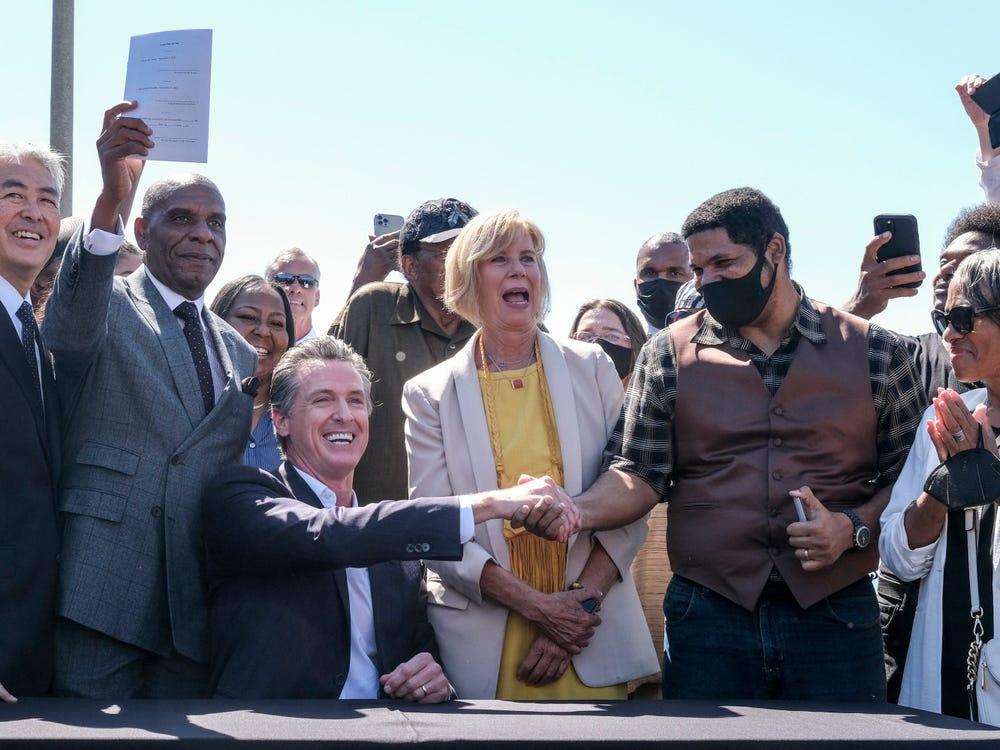
A California court just returned real estate it took from a Black family in 1924. It could be the beginning of a wave of redistribution.
Jason Lalljee Dec 6, 2021, 5:46 PM
The Bruce family is getting their land back. It's the first time Black Americans have successfully reclaimed land that the government took from them, raising hopes for families like them who have lost their homes throughout US history.The family is retrieving ownership through a law signed by California Governor Gavin Newsom in September. In 1924, the city of Manhattan Beach used eminent domain to seize land from the Bruces, Newsom's office says. Eminent domain is a law that allows the government to take land that is privately owned and re-appropriate it for public use. The process involves compensation for the previous landowners, but they are otherwise given no choice in surrendering their property.
Newsom signed the land over to the descendants of Willa and Charles Bruce, who left Manhattan Beach after facing racial harassment by the Ku Klux Klan and their white neighbors in the early 1900s. Willa and Charles turned the property into the first resort for Black people on the West Coast, calling it "Bruce's Lodge," when segregation kept them out of most other beaches.
The KKK tried to burn the resort down. White Manhattan Beach residents harassed the resort's customers.
The city seized the land, claiming that they wanted to turn it into a public park — they never did. It remained as an empty plot before being transferred to the state, then LA County.The Manhattan Beach government explicitly acknowledged the racist motive for seizing the Bruce's Lodge twenty years later in an article by one of the city council members who voted to take it, Frank Doherty, for the Redondo Reflex newspaper.
"We thought that the Negro problem was going to stop our progress," he wrote in 1945. "We had to acquire these two blocks to solve the problem, so we voted to condemn them and make a city park there. We had to protect ourselves."
Barriers still exist to reclaiming Black land nationwide
The Bruce family's landmark case is inspiring others who hope it acts as a precedent. Experts say that proving original ownership, however, may be a fraught challenge.
Kavon Ward, the co-founder of the group Where is My Land, helped lead the fight on behalf of the Bruce family. She told The Washington Post on Monday that she's heard from more than 100 people ready to argue that they have a rightful claim to property that's not currently theirs.The Bruce's Manhattan Beach land was relatively clear-cut — their historical claim to the property was well-documented through their resort and the violence they faced. Few other cases are supported by written history.
The historical seizure of Black property rests at the center of contemporary disparities between Black and white wealth in the US. In the first quarter of 2020, 44% of Black households owned their homes, according to the US Census Bureau, while 73.7% of white families owned theirs. That gap is worse in individual cities — only about 25% of Black families in Minneapolis own their homes, for instance, according to a study by Redfin.
The typical Black family only has about 10% the wealth of the average White family, according to the
Federal Reserve
. Phenomena such as redlining, blockbusting — whose impacts still linger even after the passage of the Fair Housing Act of 1968 — are also responsible for the way that Black homeownership and wealth have stagnated in the US.
When it comes to eminent domain, that kind of relationship with formerly Black-owned land lingers in plain sight: even our most sprawling national icons, like Central Park in Manhattan, aren't immune.
https://www.businessinsider.com/california-gives-land-back-to-black-family-raising-hopes-others-2021-12
-
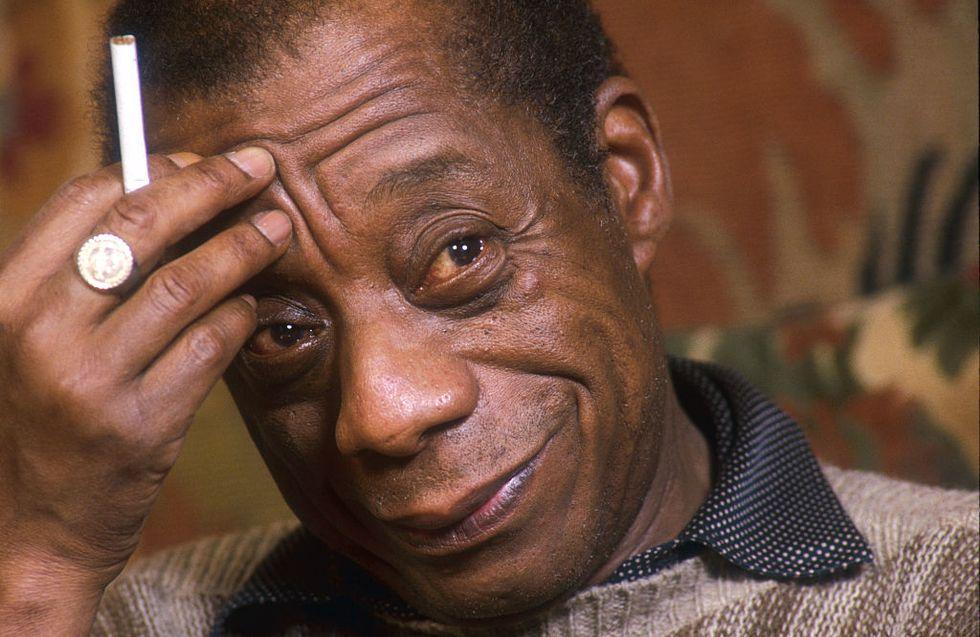
Watch a Never-Before-Aired James Baldwin Interview From 1979
Buried by ABC at the time, the segment reveals a unique glimpse into Baldwin’s private life—as well as his resounding criticism about white fragility, as blisteringly relevant today as it was in 1979.
By Adrienne Westenfeld < https://twitter.com/adriennemwest >When Lovett received the assignment, he was excited to meet one of his heroes: “I had been reading [Baldwin] since I was a teenager. I thought he was brilliant and brave and speaking to the moment of history that we were all living in. I was thrilled; I was beyond thrilled.”
Lovett and his crew arrived early, woke Baldwin, shared breakfast with him, and rolled the cameras before Baldwin, a heavy drinker, had a chance to imbibe. “He hadn’t had a drop to drink and he was brilliant, utterly brilliant,” Lovett said. “We couldn’t have been happier. He was such an eloquent, masterful speaker, with such a great mind. It was such a privilege.”Conducted by the late Sylvia Chase, the interview took place at 137 West 71st Street—the Manhattan apartment building Baldwin bought for himself and his family in 1965, following the success of his early books. It showcases rare footage of Baldwin relaxed and gregarious at home, surrounded by a large and close-knit family. In a private conversation with Baldwin’s mother, Emma Berdis Baldwin, in the kitchen of her apartment, Chase asked if she always knew that her son would be a wildly successful writer; Baldwin's mother responded, “I didn’t think that. But I knew that he had to write.”
The segment also takes viewers behind the scenes of Baldwin’s play, The Amen Corner; during a rehearsal for the Lincoln Center production, Baldwin is shown beaming as he watches the performers. The production was produced and directed by Val Gray Ward, founder of Kuumba Theater, who is featured in the clip along with her Kuumba cast. To see Baldwin laughing and smiling in the thick of rehearsal is a welcome, joyful sight. Yet it’s his words about white fragility and white fear that rise above the 1979 milieu, remaining achingly relevant all these years later.“White people go around, it seems to me, with a very carefully suppressed terror of Black people—a tremendous uneasiness,” Baldwin said. “They don’t know what the Black face hides. They’re sure it’s hiding something. What it’s hiding is American history. What it’s hiding is what white people know they have done, and what they like doing. White people know very well one thing; it’s the only thing they have to know. They know this; everything else, they’ll say, is a lie. They know they would not like to be Black here. They know that, and they’re telling me lies. They’re telling me and my children nothing but lies.”
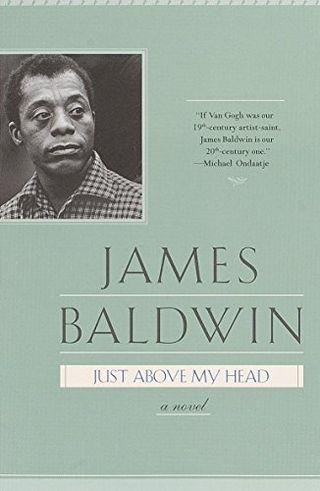
The far-ranging interview was a resounding success, and Lovett was eager to see it air. Yet as he was called away on other assignments, including interviewing Michael Jackson, nothing came of the Baldwin segment. When he inquired about the delay, ABC reported that it had been scrapped, because, “Who wants to listen to a Black gay has-been?”“I was stunned,” Lovett said. “I was absolutely stunned, because in my mind, James Baldwin was no has-been. He was a classic American writer, translated into every language in the world, who would live on forever, and indeed he has. His courage and his eloquence continue to inspire us today.”
In a portion of the segment filmed at the Police Athletic League’s Harlem Center, Baldwin addressed a group of student reporters, telling one young student, “Nobody wants a writer until he’s dead.” Uncovering this interview over forty years later, Baldwin’s unnerving words seem frighteningly prescient. Lovett will discuss the 20/20 segment further on June 24 at 8:00 PM, when he moderates a free virtual panel titled James Baldwin: Race, Media, and Psychoanalysis, featuring psychoanalysts Annie Lee Jones and Victor P. Bonfilio, as well as Aisha Karefa-Smart, Baldwin’s niece. RSVP here to help Baldwin’s legacy live on.
-
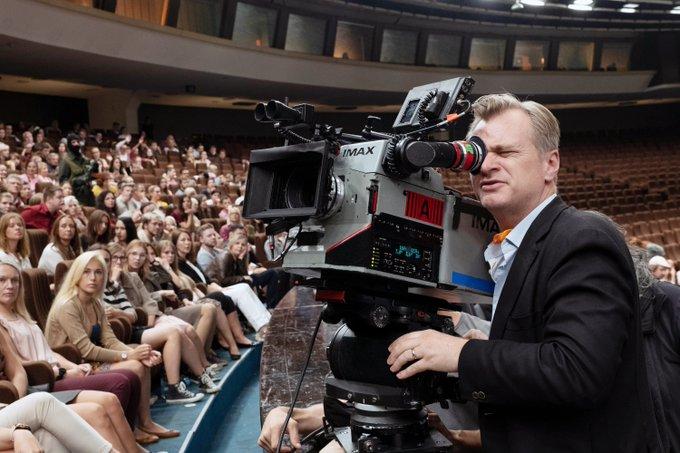
I quote Variety:
By backing #Oppenheimer, Universal is making a bet that the right director can still get audiences excited to visit cinemas for original content. The film, which isn’t due in theaters until 2023, will need to defy the odds to become commercially successfulThe article
Why Christopher Nolan’s $100 Million WWII Drama ‘Oppenheimer’ Could Be the Last of Its Kind
By Rebecca Rubin < https://variety.com/author/rebecca-rubin/ >
Christopher Nolan’s next movie “Oppenheimer,” a $100 million-budgeted historical drama about physicist J. Robert Oppenheimer and the creation of the atomic bomb, could be considered one of an endangered species.
These days, it’s rare for traditional studios to pump nine figures into a film that isn’t inspired by popular toys, novels or comic books. Even before COVID-19 upended the moviegoing landscape, audiences had been gravitating toward superheroes and science-fiction spectacles — and not much else. That reality has made it increasingly difficult for Hollywood to justify the economics of greenlighting expensive movies that aren’t based on existing intellectual property. They’re a bigger risk, not only in recouping investments for studios, but also in generating profits, spawning sequels and leveraging consumer product riches. No matter how well people receive Nolan’s film, it’s unlikely J. Robert Oppenheimer’s face will adorn t-shirts or lunch boxes.
By backing “Oppenheimer,” Universal Pictures is making a bold bet that the right director can still get audiences excited to visit cinemas for original content. The film, which isn’t due in theaters until 2023, will need to defy the odds to become commercially successful. On top of its $100 million production budget, the studio will need to spend $100 million more to properly promote the film to global audiences. Because Nolan’s contract guarantees he receives first-dollar gross — an increasingly uncommon perk that grants the filmmaker a percentage of ticket sales — it will take $50 million to $60 million more to achieve profitability than it would take another film of similar scope. Consequently, insiders at rival studios estimate “Oppenheimer” will need to generate at least $400 million at the global box office in order to turn a profit.
That box office benchmark is one that Nolan’s films haven’t had trouble clearing in the past decade, with the exception of “Tenet,” which opened in theaters at a time when COVID-19 vaccines were still months away. And despite the circumstances, the Warner Bros. cerebral thriller — starring John David Washington and Robert Pattinson — managed to collect $363 million worldwide. “Tenet” cost more than $200 million, making it nearly impossible to turn a profit in those conditions. When it comes to Nolan’s other original properties, 2010’s “Inception” grossed $836 million globally, 2014’s “Interstellar” made $701 million globally and 2017’s “Dunkirk” collected $526 million globally. In other words, Nolan is a filmmaker with an enviable box office track record.
Those who closely follow the industry point out that “Oppenheimer” won’t be the kind of gripping mind-benders that audiences have come to expect from Nolan, such as “Inception” or “Memento.” Instead, it’s a historical drama that’s firmly rooted in fact and physics. Unlike “Dunkirk,” which captures the heroism of British forces during the early days of World War II, “Oppenheimer” tells a darker story, one that exists in the moral murk of the past and is not only divisive, but firmly American. That could limit interest overseas, where Nolan’s films tend to make the bulk of their revenues.
None of this means people in the movie theater business are betting against Nolan. The reason that Universal’s chairwoman Donna Langley made it her mission to court Nolan after his relationship with Warner Bros. grew strained is that he’s one of the few directors who can take a bold swing and rake in hundreds of millions at the box office. It’s especially valuable at a time when Hollywood appears to be scraping the bottom of the barrel for IP that can be spun into cinematic gold. Case in point: There are (real) movies in the works based on the card game Uno, the crunchy snack Flamin’ Hot Cheetos, and the invention of Viagra. Because not every project can be derived from Marvel, Star Wars, James Bond, Jurassic World and Fast & Furious, studios are turning to filmmakers with unique perspectives who can launch a film based on their name alone. Privately, other Hollywood players have voiced their desire to see “Oppenheimer” succeed because it would encourage studio executives and financiers to take more chances on new ideas.
“[Nolan] is a unique talent with a very loyal fanbase. If you were to say someone else was doing a period piece about J. Robert Oppenheimer, I would say it would be difficult to get made,” says producer Peter Newman, the head of NYU’s Tisch School of the Arts’ MBA/MFA program. “Here, you know you’re going to get something different and original.”
There aren’t many filmmakers who are given the opportunity to create movies around new and unfamiliar ideas at that budget level, at least, not at traditional studios. (In a sign of changing times, Steven Spielberg, once a streaming service skeptic, forged a partnership for his company Amblin to produce new feature films yearly for Netflix.) When they work, in the case of Quentin Tarantino’s ode to 1960s showbiz “Once Upon a Time in Hollywood,” the studio and filmmakers alike can reap the benefits. Sony shelled out roughly $90 million to produce “Once Upon a Time in Hollywood,” which starred Leonardo DiCaprio, Brad Pitt and Margot Robbie and grossed $375 million at the global box office. When they flop, like Ridley Scott’s big-budget period piece “The Last Duel,” starring Ben Affleck, Matt Damon and Adam Driver, or Roland Emmerich’s $100 million-budgeted war drama “Midway,” the losses can be ruinous.
Filmmakers like Jordan Peele and Judd Apatow have a similar ability to churn out hits, but their movies don’t cost nearly as much to make. Recent would-be blockbusters or adult-targeted movies with sizable budgets, such as Michael Bay’s “6 Underground,” Aaron Sorkin’s “Trial of the Chicago 7,” David Fincher’s “Mank” and “Red Notice” starring Dwayne Johnson, Ryan Reynolds and Gal Gadot, were set up by or sold to Netflix. The streamer, as well as its competitors, doesn’t report box office grosses and relies on luring subscribers with fresh content, so it’s impossible to know what kind of financial impact those movies had.
Nolan could have easily sold “Oppenheimer” to a streaming service, which would have guaranteed him a massive payday without being subjected to the scrutiny of box office reporting. But he’s a big supporter of the big-screen experience and the struggling film exhibition industry.
Since “Oppenheimer” isn’t expected to debut in theaters until summer 2023, plenty could change in the movie theater business by then — for better or worse. There’s a chance it could launch in an environment that’s even more hostile to tentpoles that aren’t of the comic book ilk. Or, moviegoers could be ready to look beyond the constant drip of Batman, Superman and Spider-Man adventures and watch something that doesn’t involve grown men in tights.
With an original property, marketing executives have to familiarize audiences with the property while also enticing them to watch the story in theaters. In the case of “Oppenheimer,” Universal has to make people aware that Nolan has a new movie and convince them they simply must watch the story behind the Manhattan Project on the big screen. Nolan is assembling an A-list ensemble — Emily Blunt, Matt Damon and Robert Downey Jr. — around Cillian Murphy (who is playing J. Robert Oppenheimer) to elevate the movie’s profile.
Another challenge will be reaching its target demographic of adult crowds. They may be more eager to go to the movies two years from now, but while COVID-19 is still lingering, the age group has been most hesitant to visit their local cinemas.
“There used to be at least one level of uncertainty in how movies perform: execution dependent,” Newman says. “Now, it’s not only execution dependent, it’s pandemic dependent. It takes over a year to make a movie like this, and nobody knows what the health situation will be [at the time it comes out].”
MY THOUGHTS
If I am honest, I think this movie dies hard. When M Night Shamala did Lady In The Water or Last Airbender, it sounds a lot like Oppenheimer from Christopher Nolan. A director with a set of fans who expect a certain kind of narrative in a film and who will not be happy of the course change. The article says directors like Nolan can be banked on money but admitted, the failures of big budget films, like Ridley scott's , The Last Duel, or similar are examples to show it doesn't work and has many recent examples of failures.
The one name the article doesn't mention is clint eastwood. It refers to Jordan Peele or Judd Apatow but to be blunt, Clint Eastwood is the quiet king of the low budget hit machine, starting decades ago. And to that end is where I think directors like ridley scott/christopher nolan/shamala all made the mistake. The reality is, big budget movies from the usa need to be the providence of comics/superheroes/fast and the furious/toys. The article didn't even mention Villaneuve, who did the Bladerunner sequel and Dune and in both cases, you can argue for failure financially.It is an art directing a low budget picture , it demands the director stop all the bells and whistles and simply tell a good story and pick wise actors to present their characters as compelling within the framework of said story. Nolan will get paid regardless, but I expect this film will be an end and I don't think it is a problem.
I end with a simple truth. No one is stopping original ideas from being made into films. if viewerships or audiences are too stupid or too manipulated to give movies a chance beyond metacritic scores and various judgements of others, then the audience or viewership is the problem.
POST SCRIPT
The point they made about Netflix's films is very poignant. Who can know a streaming service has success with a film? is it number of streamers growth? If quantity of streamers, people who paid for a subscription, doesn't elevate then how is a film on a streaming service financially profitable, outside stock price speculation
-
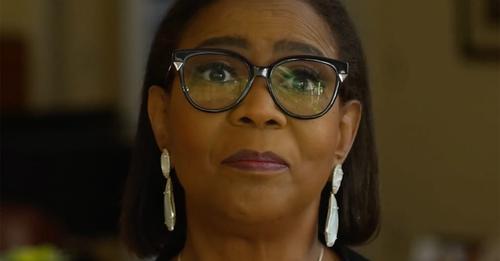
a doc on Louis Armstrong’s secret child, comes to ABFF
Matthew Allen - Nov 12, 2021
https://thegrio.com/2021/11/12/little-satchmo-louis-armstrong-abff/Sharon Preston-Folta is a senior account executive at WUSF Public Media in Tampa, Florida. She also happens to be the daughter of the late Louis Armstrong. That latter revelation was not public knowledge during the musician’s lifetime, but now her story is the subject of Little Satchmo, a documentary that’s playing at the American Black Film Festival (ABFF).
Since Armstrong was married to his fourth wife, Lucille Wilson, from the time Preston-Folta was born until his death, he chose not to disclose the existence of his daughter publicly. However, as evident in the trailer, he acknowledged her in private, sending video recordings and letters asking about her.Preston-Folta, who worked in advertising sales and marketing for companies like ABC/Disney, CBS Radio, and Ennis Communications for over 30 years, didn’t come forward about being Armstrong’s daughter until 2012, as reported by The Telegraph.
“Publicly fawning over a child fathered with his mistress wasn’t exactly an option for Louis Armstrong,” Preston-Folta says during the trailer. “He always wanted to be a father, but we had to keep it all secret.”
Bandleader, vocalist, and trumpeter, Armstrong was a beloved musician who was one of the first African-American celebrities who enjoyed widespread crossover appeal.
Aside from recording American music standards like “What a Wonderful World,” “Stompin’ At The Savoy” and “Hello, Dolly,” he was a global ambassador for American jazz music. Armstrong’s public reputation was impeccable and he collaborated with other star musicians of the time including Frank Sinatra, Barbra Streisand, and Ella Fitzgerald.
So, having a child from an extramarital affair that lasted for more than 20 years would not have been good for his public image.
The documentary, narrated by Preston-Folta, is adapted from her 2012 memoir, Little Satchmo: Living In the Shadow Of My Father, Louis Daniel Armstrong, and its release corresponds with the 50th anniversary of Armstrong’s death. Armstrong died of a heart attack in 1971 in New York City after experiencing numerous health problems. He was 69.
Not only does she provide more insight on her famous father through her unique vantage point, but Preston-Folta also shares her own journey as well, revealing the warm relationship between her and Armstrong that will resonate with those who have grown up in fatherless households as well as those seeking to better understand their familial heritage.
Glad to know Satchmo had a child, I wonder if his daughter had any children. I hope she did.
-

Cool resource alert: Variety has reported that Solange, through her Saint Heron studio, is launching a community library of “esteemed and valuable” books by Black creators. Readers can borrow any book from the collection of rare, author-inscribed and out-of-print literary works to up to 45 days, free of charge in the U.S. According to Saint Heron’s materials, the library’s focus is “education, knowledge production, creative inspiration and skill development through works by artists, designers, historians, and activists from around the world . . . We believe our community is deserving of access to the stylistically expansive range of Black and Brown voices in poetry, visual art, critical thought and design.”Rosa Duffy, founder of For Keeps Books, an Atlanta-based community bookstore and reading room, has guest curated the first season of the Saint Heron Library; in collaboration with Saint Heron, Duffy has curated over 50 available titles including a signed first edition of In Our Terribleness by Leroi Jones, Meren Hassinger 1972-1991, a signed The Meeting Point by Austin Clarke, My One Good Nerve Rhythms, Rhymes, Reasons by Ruby Dee and Ossie Davis, inscribed by the authors to Maya Angelou, and more. The first season, supported by Aesop Skincare, will run from October 18th until the end of November.
“The Saint Heron Library continues the work we have been building by preserving collections of creators with the urgency they deserve,” said Solange in a statement. “Together we seek to create an archive of stories and works we deem valuable. These works expand imaginations, and it is vital to us to make them accessible to students, and our communities for research and engagement, so that the works are integrated into our collective story and belong and grow with us. I look forward to the Saint Heron library continuously growing and evolving and over the next decade becoming a sacred space for literature and expressions for years to come.”
You can read an interview with Rosa Duffy, guest curator of Saint Heron Library’s first season, on Saint Heron’s website.
SAINT HERON website: https://saintheron.com/
ARTICLE By Walker Caplan
https://lithub.com/solange-has-launched-a-community-library-of-rare-books-and-art-by-black-creators/When her phone buzzed on June 6, Iole Lucchese was still absorbing a shock that had come the day before. Her longtime boss, M. Richard Robinson Jr., the chairman and chief executive of the Scholastic publishing company, had died suddenly while taking a walk with one of his sons and his former wife on Martha’s Vineyard.
Now, Scholastic’s general counsel, Andrew Hedden, was on the phone, delivering a second surprise.
He had called to inform her that Mr. Robinson, 84 — who turned his father’s book and magazine business into the largest publisher and distributor of children’s books in the world, known for thousands of beloved series, including Clifford the Big Red Dog, Hunger Games and Harry Potter — had left Ms. Lucchese 53.8 percent of Scholastic’s Class A stock. The company where she had worked for 30 years, rising from a junior employee in the Canadian market to one of its top executives, was now a company she controlled.
“It was overwhelming,” Ms. Lucchese said in an interview at Scholastic’s headquarters in SoHo, water towers punctuating the cityscape behind her.
Being handed control of the company, which is valued at $1.2 billion, has made Ms. Lucchese, 55, one of the most powerful women in book publishing, and the stock provides her — the daughter of a construction worker and a homemaker — with significant wealth. The gift also shifts the business, which had been passed from father to son, to a person outside the family and puts Scholastic in an extremely unusual position for a public company: adapting to a succession plan many key players did not know was coming.
In his will, Mr. Robinson described Ms. Lucchese (her name is pronounced YO-lay lew-KAY-zee) as “my partner and closest friend.” But an article in The Wall Street Journal described them as “longtime romantic partners.” Six former employees, who spoke on the condition of anonymity because they were reluctant to cause further embarrassment to Mr. Robinson’s sons, confirmed to The New York Times that the romantic relationship between Ms. Lucchese and Mr. Robinson had been well known among many Scholastic employees.
“We were great business partners and close friends,” said Ms. Lucchese, a senior executive responsible for strategy and the company’s entertainment division.
She declined to address The Journal’s claim that she and Mr. Robinson had been involved in a relationship, which the employees believe ended a few years before his death.
This was Ms. Lucchese’s first interview with the news media since the death of Mr. Robinson, whom everyone called Dick. She was joined at a round conference table by Peter Warwick, the company’s new chief executive, and flanked by two publicists, one from Scholastic and another from the public relations firm Edelman.
“Dick understood that I shared his passion for Scholastic, and what this company means to the teachers we serve, to the children we serve, to everyone,” Ms. Lucchese said of his decision to leave his Class A shares to her. “He trusted me with that legacy, and I think it’s because we worked together and he knew that we were aligned.”
That bequest bypassed his two sons, John Benham Robinson, 34, known as Ben, and Maurice Robinson, 25, known as Reece. Mr. Robinson’s sons declined to comment for this article.
Scholastic said in a statement that the board had regular discussions about succession at the company.
The publisher's offices are in a warehouse-style building with exposed bricks, subway tiles and a giant sculpture of Captain Underpants busting through the lobby wall. On the day of the interview, the offices sat mostly empty as many employees continued to work from home because of the pandemic. Any silences in the conversation hung heavily in the air.
Sometimes confining herself to one-word answers, Ms. Lucchese discussed her career and the unusual situation of being both a longtime senior executive and now also the chairwoman. A stack of Harry Potter books kept watch from a large wooden bookshelf over Ms. Lucchese’s left shoulder.
“He’s the boss,” she said, motioning to Mr. Warwick, who, as chief executive, in one sense outranks her.
“But I do report to the board,” he answered.
Scholastic did not seek publicity for its new chair, the first woman and the first person outside the Robinson family to hold the position in decades. A few days after the news of the personal complexity around the succession had broken in The Journal, the company, known for its stable of beloved childhood classics, became an object of tabloid interest — “How ‘chameleon’ Iole Lucchese won $1.2B Scholastic empire,” read one New York Post headline.
When a reporter for The New York Times emailed Scholastic in August requesting an interview with Ms. Lucchese, Ira Gorsky, executive vice president at Edelman, the public relations company, called to inquire about whether Ms. Lucchese would be asked about “the alleged affair,” saying, “You can see how this is offensive, how the allegations implied that she has not gotten to her position because of merit.”
Mr. Gorsky said that as “a ground rule for giving an interview,” the Times reporter could not ask Ms. Lucchese about a personal relationship with Mr. Robinson. When the reporter declined to agree to such limitations, Mr. Gorsky responded: “Then we’re done.”
Ms. Lucchese did eventually agree to be interviewed, and no one representing her asked again for restrictions on topics or questions. Aside from an hourlong conversation with Ms. Lucchese and Mr. Warwick, preceded by a tour of the company’s archive led by a librarian, Scholastic declined to make any other employee available.
Her supporters say that as a 30-year veteran and a longtime senior executive of the company, she represents continuity and is qualified to lead it. Any skeptical reaction to Mr. Robinson’s choice of Ms. Lucchese is “laced with sexism,” said Erik Feig, the founder of Picturestart, a media financing and production company that Scholastic invested in and where Ms. Lucchese is a board member.
“She understands every brick of the literal and metaphorical building of the company,” Mr. Feig said.
Wall Street does not know her as well as some players in Hollywood do. Scholastic’s largest investor, after the Robinson family, was not aware of Mr. Robinson’s succession plan. “On a number of occasions, I asked Dick,” said David Wallack, a portfolio manager for T. Rowe Price, the Baltimore-based investment company, which holds more than 18 percent of the company’s common stock.
“He would tell me, ‘When I die, there is a safe, and there is an envelope in the safe, and the board of directors will open the safe and see what my wishes were,’” said Mr. Wallack, who was in regular touch with Mr. Robinson for 20 years. “I thought it was hyperbole.”
In its statement, Scholastic described the transition process this summer as smooth and efficient, saying that an interim team had taken over, as planned, immediately after Mr. Robinson’s death and that six weeks later, Mr. Warwick and Ms. Lucchese had been appointed to their new roles.
“Throughout this period — which was also set in the challenging landscape of schools reopening after Covid-shut downs — the company ensured the seamless continuation of operations, supporting teachers and students during a historic back-to-school season,” the statement said.
Mr. Wallack said he had hoped that after Mr. Robinson died, the board would conduct a broad search of internal and outside candidates for the chief executive role and elevate a board member to chair. He said that in July, when the board named Mr. Warwick, a board member since 2014, as chief executive and brought Ms. Lucchese onto the board as chairwoman, “we were shocked for sure.”
He said Mr. Robinson had never spoken to him of Ms. Lucchese and had never shared any information with him about her contributions to the company.
Mr. Wallack said that he couldn’t assess her skills himself. “I have never met her,” he said, “and none of my colleagues have met her.
After she was named chairwoman, Mr. Wallack waited to hear from Ms. Lucchese. “We are the largest shareholder after the family, and you would expect the company chairman to reach out and have a conversation with the shareholders she is supposed to represent.”
Mr. Wallack contacted an investor relations representative in June and again in September to request a meeting with Ms. Lucchese. “We were told they would let us know when she is available,” he said, adding that he was still waiting.
Mr. Hedden, the company’s general counsel, a board member until this summer, and the coexecutor of Mr. Robinson’s estate, said in a statement that he was not aware of Mr. Robinson’s plans. “From my knowledge of Dick, I know that he made his decisions around his will privately, as was his nature,” Mr. Hedden said, “and that he had the best interests of Scholastic and the continuation of his legacy in mind.”
But Mr. Robinson’s legacy includes a messy succession drama that spills into family drama as well. His will names Ms. Lucchese a coexecutor and gives her his personal property, “with the request, but not the direction” that she distribute it to his children in what “she believes to be in accordance with my wishes.”
The fact that the leadership of a public company hinged on the surprising bequest could represent a breach of duty on the part of the board, said Jeffrey Sonnenfeld, senior associate dean of leadership studies at the Yale School of Management.
“If he were 40 years old, they should have had a plan,” Professor Sonnenfeld said. “And when you’re talking about an octogenarian, the odds are not in his favor.”
Ms. Lucchese was raised in Toronto, the younger of two sisters, and went to the University of Toronto. In 1991, she recognized the Scholastic logo, a little flying book, on a job board at the university’s career center and applied for a position at its Canadian book club division. Since 1948, Scholastic has sold books to students through catalogs and fliers distributed in schools, and one of Ms. Lucchese’s tasks in those early days was to help make the fliers given out in classrooms, sometimes with X-acto knife and glue in hand.
It was through her new job that she met Mr. Robinson in the early 1990s. Ms. Lucchese said she had been walking through the office on her way to the graphic art department with book club paste-ups in her arms when Mr. Robinson stopped her and asked what was listed in the fliers. Her work at Scholastic — and connection to Mr. Robinson — began at a time when fewer rules and guardrails existed around what a relationship with a superior could mean for the course of one’s career.
Early on, Ms. Lucchese tried to expand the range of books offered through the club, moving beyond classics to include more contemporary and commercial titles students would be eager to read. “You can try to push them to read the classics or what was your favorite,” she said, “but it’s really going uphill until that spark happens with a book that they love.”
She worked her way up through the Canadian book club division and then the Canadian corporate office, becoming a co-president. In the years that Ms. Lucchese worked in Canada, annual revenue grew to 150 million Canadian dollars from 25 million Canadian dollars, according to her biography on Scholastic’s website.
She was made the corporation’s chief strategic officer, then added executive vice president to her string of titles, charged with duties like streamlining areas of the business. To compensate her for her growing role, the board gave Ms. Lucchese a raise and a bonus in 2019, which brought her total compensation to nearly $1.2 million.
Around the time she moved to New York, Mr. Robinson bought an apartment for Ms. Lucchese’s use in the same building in which he was living, according to someone involved in the transaction who spoke on the condition of anonymity because the person was not authorized to speak to the news media.
Ms. Lucchese has focused much of her attention in recent years on her additional role as president of Scholastic Entertainment, pouring her time into film and television projects like “The Magic School Bus Rides Again,” a Netflix series in which the eager teacher Ms. Frizzle takes her students on magical scientific adventures to places like outer space or to the bottom of the sea.
The goal, Ms. Lucchese said, is to focus on a small number of quality productions that reflect the vision of Scholastic and its authors, in hopes of converting watchers into readers. “Ultimately, for us, it’s about selling the books,” she said.
It was while discussing these ventures that Ms. Lucchese was most animated, describing particular projects like the forthcoming movie “Clifford the Big Red Dog.” She gave a little cheer (“Yay!”) when she learned that a reporter’s children were fans of “The Magic School Bus Rides Again.”
“Clifford,” which was filmed before the pandemic, is scheduled to be released in theaters and on a streaming service in November. The adaptation places Clifford in New York City, away from his usual home on Birdwell Island. Jordan Kerner, one of the producers, said he had given Ms. Lucchese credit as a “producer” rather than the more ceremonial “executive producer” to reflect her day-to-day involvement.
“We were worried that Scholastic would react to Clifford being in New York, but she understood the comedy of it, of New Yorkers looking at their phones and not looking up at 10-foot dog,” said Mr. Kerner, who also produced the 2006 live-action “Charlotte’s Web” film and “The Smurfs.”
In the interview, Ms. Lucchese did seem to have thought quite a bit about how the big red dog would find life in the big city, and how he would adapt.
“Clifford is as big as a house if you read the books, but in order to make him interactable in the live-action movie, he has to fit in a room,” she said. “So he had to be a puppy.”
Since M. Richard Robinson Sr. founded the company in the sewing room of his parents’ house in Western Pennsylvania in 1920, Scholastic has been a family business. Dick Robinson’s siblings still own about 47 percent of the Class A shares, which are held by trusts.
Barbara Buckland, one of Mr. Robinson’s sisters, said the two of them often had dinner together on Sundays, though he would cancel if he was able to dine with his sons instead. She said he had come to her home for dinner shortly before he died and had been “full of his usual vim and vigor and all kinds of questions.”
“We’re saddened, but we know the company is in good hands,” said Ms. Buckland. “Nobody has any intention of selling. Nobody is worried. We are all sad.”
Despite Mr. Robinson’s age, his death came as a surprise to many in his personal and professional lives. A daily exerciser, he was fit and in full control of day-to-day operations at Scholastic, and anyone who knew him even a little bit would say the company was his life’s obsession.
A cartoon of his face, showing him looking off into the distance like a superhero, hangs on a gallery wall in Scholastic headquarters, near portraits of Harry Potter and Clifford. Ms. Lucchese said that when the office was redesigned a few years ago, Mr. Robinson hadn’t wanted any pictures of himself displayed but Ms. Lucchese said she sneaked that one in.
Mr. Robinson made it no secret that he wished Scholastic to remain an independent company, even as consolidation within the publishing business sped up around him. Penguin Random House, itself the product of a 2013 merger, is in the process of trying to buy Simon & Schuster. If approved by federal regulators, that deal would create a colossus far larger than any other publisher in the country.
But the remaining large houses will want to bulk up to compete, especially by acquiring rich “backlists,” catalogs of older titles that are reliable, long-term money makers — which is sure to make Scholastic an attractive target.
The company’s new leadership team appears to share what was perhaps Mr. Robinson’s most precious goal: Ms. Lucchese and Mr. Warwick expressed no interest in selling.
“We’ve got the resources ourselves to go forward at the pace that we want to go,” Mr. Warwick said.
Given Mr. Robinson’s devotion to Scholastic, it was fitting that his memorial service was held there last month. A virtual event with just a few people in attendance, it included a video eulogy delivered by his son Reece. “We will cherish the memories of the holidays and weekends we spent with him during Covid when he wasn’t working 12-hour days,” Reece Robinson said of his family’s relationship with his father.
The service had all the star power of a Hollywood collaboration, with video messages from Goldie Hawn, Bill Clinton and J.K. Rowling punctuating remarks from former employees and board members. The final speaker, Alec Baldwin, described the friendship he had developed with Mr. Robinson as neighbors in a downtown apartment building and expressed his condolences to Mr. Robinson’s family, the Scholastic community and Ms. Lucchese. He was the only speaker who mentioned her name.
Mr. Wallack, the portfolio manager for the company’s second-largest shareholder, had twice contacted investor relations at Scholastic to request information about Mr. Robinson’s funeral, he said. But no one alerted him to the memorial service, he said. “I was hopeful to have been invited to that,” he said, or at least sent a link. (In response, a company spokeswoman said the event was publicized on social media and the company’s website.)
Ms. Lucchese, one of Mr. Robinson’s closest business associates and the woman in control of the company, chose not to deliver remarks herself. Instead, she wrote a note in the program that appeared under a picture of Mr. Robinson’s broad smile.
“Dick knew that Scholastic could uniquely empower children to overcome obstacles,” she wrote. “He knew this work was worth doing, and he inspired in all of us the passion to get it done.”
The message was signed, “Iole Lucchese, Chair of the Board.”
Susan C. Beachy contributed research.
Katie Rosman is a features reporter who covers a range of topics including media and celebrity. She joined the Times in 2014. @katierosman
Elizabeth A. Harris writes about books and publishing. @Liz_A_Harris
ARTICLE By Katherine Rosman and Elizabeth A. Harris
https://www.nytimes.com/2021/10/18/business/scholastic-iole-lucchese-succession-battle.html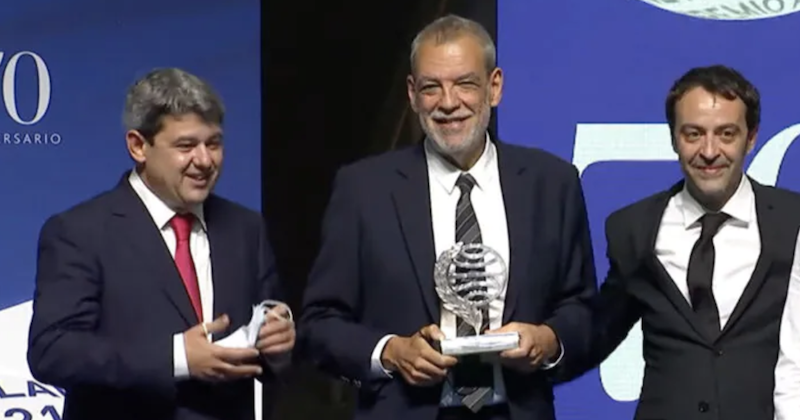
This week, the winner of the Planeta Prize, a Spanish 1-million-euro literary award, was announced: Carmen Mola, a famously private crime thriller writer. All that was known about Mola, often referred to as Spain’s “Elena Ferrante,” is that she was a university professor in her mid-40s living in Madrid with her husband and three children; three years ago, she told Spanish newspaper ABC that she used a pseudonym so as not to disrupt “an already-formed life that has nothing to do with literature.” But at the Planeta awards ceremony, the real reason for the pseudonym was revealed: Carmen Mola doesn’t exist. Instead, she is the product of three male screenwriters—Agustín Martinez, Jorge Díaz and Antonio Mercero—who showed up in person to pick up their prize money. According to The Guardian, their credits include television shows Central Hospital and Blind Date.
Some readers were irritated by the idea that the three men had used a woman’s persona to market their crime novels. Most of Carmen Mola’s novels center around detective Elena Blanco, a “peculiar and lonely woman, lover of grappa, karaoke, classic cars and SUV sex.” (The book that won the Planeta is not a Blanco novel; it centers around the search for a serial killer dismembering girls during an 1800s cholera epidemic.) Spanish newspaper El Mundo noted the Carmen Mola identity’s role in drumming up publicity: “It hasn’t escaped anyone’s notice that the idea of a high school teacher mother of three children who teaches algebra in the morning and in the afternoons, then writes novels of ultra-savage and macabre violence in her spare time, is a good marketing operation.”
Beatriz Gimeno, former head of the Women’s Institute in Spain, critiqued the trio on Twitter: “Beyond the use of a female pseudonym, these guys have been answering interviews for years. It is not only the name, it is the false profile with which they have scammed readers and journalists. Scammers.” (Last year, a regional branch of the Women’s Institute recommended Mola’s novel La Nena (The Girl) on a list of work by female authors that help readers “understand the reality and experiences of women at different times [in history] and make people aware of their rights and freedoms.”)
Twitter user Jenne Popay, responding to The Guardian’s coverage of the hoax, wrote, “Men use a woman’s persona—not just a name—to sell novels about extreme violence often against women & in the case of this prize dismembered girls! And they are awarded a prize?”
For their part, Martinez, Díaz and Mercero deny that their choice of a female pseudonym was calculated. “Choosing a woman’s name was not a thought-out thing,” Diaz told El Mundo. “We didn’t want to send any message. We could have put R2-D2 on it, but we named it Carmen Mola.”
“There is something very healthy in eliminating this obsession with the author, to know who they are, how they dress, what life they have,” Martinez added. “If Carmen Mola has worked it is because the readers have liked the stories. Getting rid of the ego is difficult, but we try to leave it out of the room. Deep down, we do not matter so much.”
ARTICLE By Walker Caplan
https://lithub.com/a-woman-won-a-million-euro-writing-prize-then-turned-out-to-be-three-men/
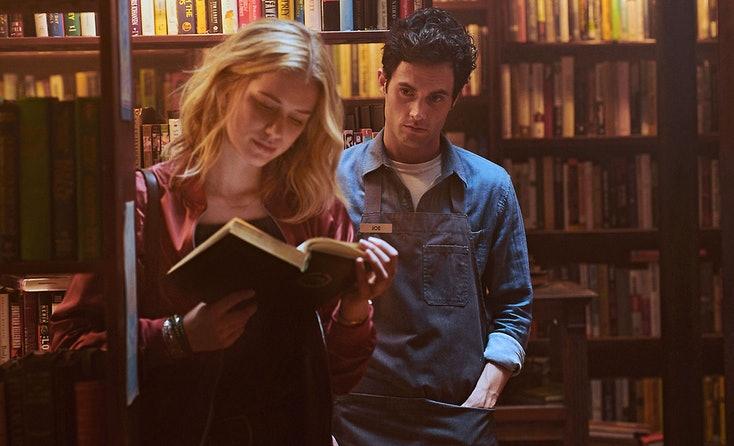
I AM HAUNTED BY JOE'S STUPID LITTLE BOOKSELLING APRON
...
The truth is that it is rare to be idle working in a bookstore, let alone stay romantic about it. Someone leaves a used tissue on the handrail, folded over and tucked onto itself like a diseased cravat. UPS just delivered a ton of shipments and half of them are either torn open or full of titles you didn’t order. The book that you love that you constantly try to push on customers hasn’t moved off the shelf in weeks. Meanwhile, you have to check if there’s any backstock of The Alchemist because, for some reason, we’re always selling out of The Alchemist. And The Four Agreements. And The Myth of Sisyphus. And, weirdly, the fifth My Struggle book (just the fifth one).
Obviously this wouldn’t make for very compelling TV, which is fine. Viewers prefer to see Penn Badgley, with his handsome, sculpted face, and his insane, incomprehensible apron idly put a few books on a shelf or ring up the odd tourist. But it irks me to no end. If anyone has to pop out it’s for some light stalking, not a run to the bank. No one is lifting heavy pieces of furniture or rearranging shelves. No one ships out orders. No one sets up book displays. No one even orders their books. At one point in You, Joe is shown opening a box of books that seem to have been teleported to him by God before putting them out directly onto the shelves. Questions abound. Why is there only one box? Why isn’t he drowning under the weight of at least ten more? Doesn’t he want to at least label the merchandise first?
Onscreen booksellers should, at the very least, be tired. Or stressed out, or pissed off, or shown to be doing something that they don’t have time for. Toilets have to be cleaned. There’s an old man on Line 1 who wants to know why we don’t sell a book that he can’t recall the title of but remembers seeing in a window once in 1998. That part in You’ve Got Mail when Tom Hanks’ Joe Fox shops at Kathleen Kelly’s store and balks at the full price? Yeah, that part, always, forever. Skull-face Bookseller Honda-san, a manga and anime featuring Japanese booksellers wearing armored helmets and plague doctor masks, is perhaps the only truly accurate depiction of bookstore life. Customer interactions are stressful, everything breaks, everything is heavy, there’s no room to put books out, there’s both too much and not enough time.The only trope more common than the perfect little bookstore is the bookstore that’s about to go out of business. People wearing shirts that say something like “My life is better with books” remind you that this book, every book, is much cheaper on am*zon and that e-readers are more convenient. All this can make a bookseller (me, I’m the bookseller) mean, which is why there is something recognizably funny and a little awful about people like Joe from You or Bernard Black from the British sitcom Black Books, who owns and runs the titular shop. Joe lords his pretentious literary authority over strangers. “These books are more alive, more worthy than anyone I know,” he says, the world’s most inept serial killer, television’s most negligent bookstore manager. Meanwhile, Bernard is constantly trying to get people out of his store. In one episode, a customer walks in during business hours and Bernard screams to his coworker, “Why didn’t you lock the door?!”
...Something about books, or the way we talk about books, stuns people into an obnoxious reverence about all the places that sell or borrow them. As my friend, who used to be a librarian and is now a best-selling author, told me recently, “Working in a library is like working in a coffee shop and by that I mean people don’t see you until they need something from you and then they ask for a sip from your mug.”In every Instagram photo of a perfectly sunlit stack of books labeled “a good bookstore is my happy place” there is someone who is extremely undercompensated just out of frame waiting to reshelve those titles they used for props. Bernard Black says, “The pay is not great, but the work is hard.” Sometimes you meet cool people, sometimes you get to push a book into someone’s hands that changes their life for a little while. You’ll likely never know if or how. You’ll likely not have a fulfilling interaction like that for many weeks or months! Then again, there’s always more work to do. Like explain to people that the new James Bond isn’t based on a novel or why we don’t have an edition of Dune with Timothee Chalamet’s face on it.
Nicholas Russell is a writer from Las Vegas. His work has been featured in The Believer, Defector, Reverse Shot, Vulture, The Guardian, NPR Music, and The Point, among other publications.
ARTICLE from NICHOLAS RUSSELL
https://www.gawker.com/culture/why-did-joe-from-you-wear-an-apron-to-sell-books"Imposing a minimum shipping cost for books would weigh on the purchasing power of consumers," am*zon told Reuters in a statement.
That is an undesirable consequence government officials are wary of at a time President Emmanuel Macron administration is scrambling to head off growing discontent over rising energy prices six months from an election.
More than 20% of the 435 million books sold in France in 2019 were bought online and the market share of France's 3,300 independent bookstores has been slowly declining because of competition from online retailers like am*zon, Fnac (FNAC.PA) and Leclerc.
French law prohibits free book deliveries but am*zon has circumvented this by charging a single centime (cent). Local book stores typically charge about 5-7 euros ($5.82-8.15) for shipping a book.
"This law is necessary to regulate the distorted competition within online book sales and prevent the inevitable monopoly that will emerge if the status quo persists," the ministry told Reuters.
Virtually-free delivery allowed book lovers in rural areas to buy books at the same price as someone who could walk into a bookstore -- precisely the spirit of the 1981 law, it said.
ARTICLE By Elizabeth Pineau
https://www.reuters.com/business/retail-consumer/france-moves-shield-its-book-industry-am*zon-2021-10-25/
REFERRING ARTICLE
https://kobowritinglife.com/2021/10/29/saving-french-indies-a-new-fsg-president-and-old-book-smell-this-week-in-book-news/
-
Alexis Henderson author of the witching Q&A on Thistle and Verse with Chloe RoseInitial
The ghosts in savannah are mostly wraiths.
2:40
Sequel writing is not for every writer but the financial environment of writers in modernity gears audiences to love getting sequels eternally, ala JAmes Bond or Statian Comic Book characters longevity or Golgo 13 , and industry loves feeding the desire they prompted cause it is easier to gauge profitability or trends than with porviding continuous new stories over a similar time.
4:12
writers at their best always reach their comfortability
5:17
a great question is offered, are the characters in young adult fiction, the main plot characters , age bounded?
I think the modern readership has been manipulated, especially in the usa, to view genres with many bounds on the characters that film them. The Neverending story isn't a children's only book.
7:08
Alexis provides hint to her next work, she says if you like the witching you will like the next work and she is in an anthology
8:05
Imagine a romance with that angel in hell boy golden army as a main character.
9:04
Yes, Chloe , the common reader is disconnected to desiring short stories. The world of telenovelas/movie series pushes the idea that every story must be this modern epic length.
12:27
Interesting, I think many females like Margaret Atwood's no nonsense style , especially in handmaids. Yes, the south has a very agrarian relationship to spiritual.
14:50
Chloe ask Alexis a question never asked before by the writers viewpoint.
17:40
Chloe asks a question I never think to ask, what edit was the toughest, I will steal that question
The structure of each of the witch's and the writers relationship to their genesis or life is good viewing/listening.
23:50
tracy chapman shout
30:38
yes, the bond villain is never alone, sympathy for the devil
I agree, making the financially poorest be the one who must work to improve a larger society is a dysfunction
32:26
She loved Ursula from the little mermaid. Alexis gives her position on witches in media.
33:53
Chloe asked Alexis who will she want to play the characters in film world
Timothée Hal Chalamet
Indya Moore for emmanuel
Nicole kidman then Tracy chapman for vera
37:56
she references her southern baptist upbringing as a potential source to a scene in the book
38:50
brianna collett is the voice actor for the audio book
42:23
an interesting sheparding fact, on jacob rams
we give rams a bad rap like all hoofed creatures cause of the early christian churches criminalization of the more ancient roman culture where the hoofed fauns and hoofed god pan were considered positive entities and thus criminalized the people of the countryside, the villains, who still worshipped greaco roman deities as christianity grew
...
GOOD SHOW
-
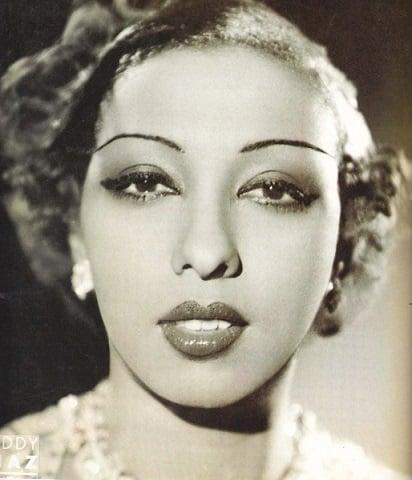
"All men can live together. If they wish to."
- Actress and civil rights activist Josephine Baker (1906-1975)
Craig gave candid thoughts, though, when discussing whether the lead should be a woman or an actor of color.
"The answer to that is very simple," Craig declared to Radio Times < https://www.radiotimes.com/movies/james-bond-daniel-craig-woman-next-newsupdate/ > . "There should simply be better parts for women and actors of color. Why should a woman play James Bond when there should be a part just as good as James Bond, but for a woman?"
https://www.yahoo.com/entertainment/daniel-craig-advice-to-next-james-bond-dont-be-s-231011388.htmlAn essay on the "lavender scare" if you don't know of it, take a look
https://www.archives.gov/publications/prologue/2016/summer/lavender.html
James Webb was head of NASA during the mentioned lavender scare, his name is being placed on a telescope, some, not most, want his name disconnected from the device, regardless of his long or fruitful stewardship of Nasa, what say you?
https://www.yahoo.com/news/nasa-advisor-quits-agency-keeps-100633698.html
-

Rapper Noname just opened an LA library dedicated to the Black experience.
By Vanessa Willoughby
October 5, 2021, 11:17am
Fatimah Nyeema Warner, otherwise known as Noname, has become a fierce advocate for literacy. The Chicago rapper, who generated buzz after appearing on Chance the Rapper’s 2013 mixtape Acid Rap, launched her synonymous book club < https://lithub.com/chicago-rapper-nonames-new-book-club-highlights-work-from-writers-of-color/ > in July of 2019. Noname Book Club < https://nonamebooks.com/ > , which operates online and in person, is dedicated to spotlighting the works and voices of people of color. Currently, the club has 12 local chapters with plans to continue growth. Additionally, the organization also sends monthly book club picks to incarcerated people through their Prison Program, which was launched in 2020.Now, following months of planning and construction, the doors of the Radical Hood Library have officially opened.
The library, which is located in the Jefferson Park neighborhood of Los Angeles, offers several categories of literature, including Prison Writings, Global Black Resistance, African American History, and How the US F*cked Up Everything. On Twitter, Noname said that her favorite sections are Fuck the Police and Black Capitalism Won’t Save Us. She added that more sections would be added in the near future and this was “just the beginning.”
This type of progressive entrepreneurship runs in the family. The artist’s mother, Desiree Sanders, opened the Afrocentric Bookstore < https://twitter.com/noname/status/1444774485723287554Unsurprisingly, Noname envisions bigger plans for the book club. According to Rolling Stone, she’s could possibly expand the club into “a government-recognized cooperative, where all of its workers own the social enterprise and have similar power in running it.”
Of course, because we can’t have nice things, some dissenters on our favorite love-to-hate bird app said the public library was a reflection of “gentrification.” (Insert upside-down smiling emoji.) I’m not really sure how anyone can come to that conclusion, though I suspect this particular reaction to Noname is based in misogynoir. Public libraries are more than just spaces to house books—they’re integral to community building, education, and economic development.
To support Noname Book Club, consider subscribing to their Patreon < https://www.patreon.com/nonamebooks > or checking out their merch < https://nonamebooks.com/Shop > . And if you’re local to the community, you can use the online catalog < https://bookclubhq.libib.com/ > to place a hold on books and pick them up at your leisure.
https://lithub.com/rapper-noname-just-opened-an-la-library-dedicated-to-the-black-experience/
James Patterson and Scholastic are joining forces to mitigate illiteracy.
Vanessa Willoughby
September 28, 2021, 1:26pmIn rather heartwarming news, bestselling novelist James Patterson is working with Scholastic Book Clubs to tackle literacy inequity. On Monday, Scholastic announced that Patterson had donated $1.5 million to help launch “The United States of Readers,” a classroom initiative created to address the needs of children in Title 1 schools. According to Scholastic, the program will get books into the hands of 32,000 kids nationwide, grades K-8, from low-income families.
“I’ve been working my entire career to get kids reading because I believe that illiteracy is one of the biggest challenges our country faces,” Patterson said in a statement. “And in many cases, kids simply need access to books—and especially books they want to read—to fall in love with reading, characters, and stories. Through my partnership with Scholastic these past seven years, we’ve made some great strides to do that. And I’m particularly excited about this new program as it will bring books to those schools and communities that need them the most, and ones that we haven’t served before.”
It’s no secret that Patterson has a dedicated interest in combating illiteracy. In September of last year, Patterson made headlines for awarding thousands of teachers with $500 grants to foster and strengthen students’ reading skills.
And in an interview for multimedia outlet Big Think, Patterson discussed his partnership with the University of Florida and expressed his sincere belief in the transformative power of literature: “I really mean it when I say that we can save lives—and thousands of lives. If we do this thing in Florida we will save thousands of lives in Florida. And any state that can solve the problem [of literary inequity] is going to save thousands of lives. Plus you can improve the economics of the state because you’re going to have that many more people who can go out into the workforce, that have choices . . . It’s a hugely important thing. And I think it’s kind of a sacred mission.”
Thus far, Patterson has donated more than $10 million to teachers and students through Scholastic.
For more information about The United States of Readers, visit the program’s website. < https://unitedstatesofreaders.scholastic.com/ >
https://lithub.com/james-patterson-and-scholastic-are-joining-forces-to-mitigate-illiteracy/
The 25 Most Iconic Book Covers in History
By Emily Temple
October 7, 2021
Iconic covers- for me, Gatsby is the best in the list
...
https://lithub.com/the-25-most-iconic-book-covers-in-history/This Virginia library is getting kids to read . . . through robot companionship.
By Walker Caplan
October 6, 2021, 2:54pmParents and educators have tried many different tactics to get children to read—games, star charts, personalized books. Now, Roanoke County Public Library is trying something new, which seems both incredibly effective and a little dystopian: encouraging children to read by having them read to a humanoid robot.
Roanoke County Public Library owns Pepper, an advanced robot which can identify faces, read human emotion, and engage in conversation. (In an interview, Tech Insider asks Pepper: “Should I be afraid of you?” Pepper responds: “Have you seen my Instagram? I’m just plain cute.”) Pepper’s eyes light up different colors to indicate what she’s doing at the time—spinning blue eyes when listening, solid green for talking or thinking, solid white for looking at an object, and solid pink for looking at a human. (This is emphasized in Pepper’s informational materials.) Families can book times for kids to read to Pepper at the library—a program called “My Robot Reading Friend.” (Guys, you could just say Klara.)
One such kid, Sadie Brannen, recommends the experience: “I’ve never read to a robot before,” Brannen told WFXR. “Go to the library. It will be fun because you can read to Pepper, the robot.” Pepper is serving her function!
As Roanoke County’s website states < https://www.roanokecountyva.gov/2046/Pepper > , Roanoke County is the first public library in the United States to recruit Pepper to serve as part of the library’s team. Yes, it feels like technology is catching up to us—we might be seeing more Peppers in libraries in the next few years—but on the bright side, I’d feel more listened to if my conversational partner had spinning blue eyes.
https://lithub.com/this-virginia-library-is-getting-kids-to-read-through-robot-companionship/This 7-year-old is advocating for more disability-centered books in libraries.
By Walker Caplan October 4, 2021, 11:53am
https://lithub.com/this-7-year-old-is-advocating-for-more-disability-centered-books-in-libraries/For Sale: Kidney Story. Never Authorized.
Lincoln Michel
https://countercraft.substack.com/p/for-sale-kidney-story-never-authorizedREFERRAL POST- Supply Chain Worries, Robot Readers, and Bad Art Friend: This Week in Book News
https://kobowritinglife.com/2021/10/08/supply-chain-worries-robot-readers-and-bad-art-friend-this-week-in-book-news/Mystery Week
https://kobowritinglife.com/2021/10/06/mystery-series-week/
-
What is an internet protocol? It is at its core a set of rules. These rules come in many forms, the security is mostly through the subset of rules concerning time or encryption.
What is blockchain? Blockchain is merely encrypted data, that requires certain information to unveil itself.
Combine these two ideas and you get the core of what projectliberty or bluesky is.
If you can make a blockchain internet protocol you allow the flow of information between computers as it is on the internet now WHILE you allow a level of handshaking between computers that is "unhackable" by most conventional means.
To that end, Frank McCourt/ the CEO of Twitter / side many others are investing money on a way to use blockchain with internet protocols or other tools for a simple objective, make a more secure way while still media saturating way to be online.
PRoject Liberty
https://www.projectliberty.io/
Blue Sky
The web. Email. RSS feeds. XMPP chats. What all these technologies had in common is they allowed people to freely interact and create content, without intermediaries.
We're focusing on re-building the social web by connecting disconnected silos and returning control of the social experience to users. Our mission is to develop and drive the adoption of technologies for open and decentralized public conversation.
We're recruiting a small team of developers and technologists for this first stage, starting with a protocol developer < https://blueskyweb.org/Bluesky-Protocol-Developer.pdf > and a web developer < https://blueskyweb.org/Bluesky-Web-Developer.pdf > . Email your resumes and ideas to join@blueskyweb.org.
Or participate in our contest. < https://blueskyweb.org/satellite >
Satellite
A bluesky contest
Our digital identities are like satellites we launch into cyberspace. You may link one to another here and there, but how would you link all of them, systematically, in a way that proves to others they belong to you?Let’s try an experiment: A contest to demonstrate how to link your accounts and content. $300 in BTC awarded to the top three submissions, to make it worth your time.
Choose at least 3 of the following. Link them in a way that anyone can verify you are the author/owner of all. Explain how you did it, and what properties you were designing for.
A Twitter account
A Reddit account
A website... or two
A Matrix account
A Mastodon account
An SSB account
A PGP key
A piece of content on IPFS
A cryptocurrency address
Another decentralized social network
Another service/platform of your choosing
Have an answer in something that already exists? Feel free to use it, but describe how it works, the tradeoffs, and how it can be improved. Implement your solutions as much as possible. If you don’t want to actually link two of your accounts, create a new one for this purpose. Include any documentation or code needed to explain it. We’ll be scoring on a rubric of: thoroughness, robustness, originality, decentralization. Download the rubric and template here. Email solutions to join@blueskyweb.org. Multiple submissions allowed.We’ll keep a leaderboard up with pseudonyms of the authors who submitted the top solutions, so you can check if you’re on it. At the end of the contest, we’ll publish the top solutions and reveal their authors. End date: Oct 15.
https://blueskyweb.org/satellite
MEDIA
Billionaire Frank McCourt is building a new internet protocol — part of Project Liberty — to open the data economy & give social media users control.
Like the telecom revolution, he says government alone cannot fix the problem. "The private sector stepped forward and innovated."
Frank McCourt and @Twitter CEO @Jack are both creating #blockchain internet infrastructures to decentralize social media. While McCourt says he is unfamiliar with the @bluesky
details, he agrees in spirit. "If Jack Dorsey has a better product…I’ll be the first to support it."
Your thoughts?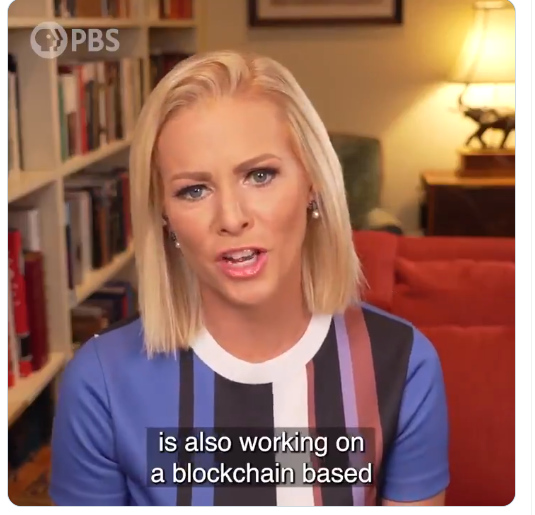
-

He explains Non Fungible Tokens very well, for those that need to hear, or do not know. Basically like all crypto currencies this is data that has been put through a arithmetic algorithm designed to be too expensive too reverse <though computing power is vital to that, if a computer can computer beyond the binary to tirary or quadry their computing power can reverse the algorithm in time, anyway...> and the result becomes a unique element. The unique element can be represented as a coin or a currency. The problem here is, going forward, what happens if someone develops a computer that can reverse the algorithms in the block chains. If said computer can do it then it can present the data in the blockchains within the peer to peer system. Is this technology available? no but if a computer has the ability to test its coins in the block chain , it can deduce. It will definitely require grand speed, way more speed than currently available but not impossible if the machine can be made. But for now blockchain ledgers are safe to use, and thus a viable currency or collectable.
-
-
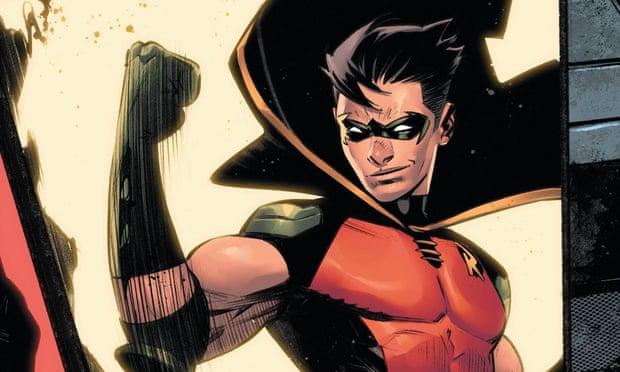
Meghan Fitzmartin has placed Robin on a sexual journey. I say this based on her words. She never said strictly Tim Drake is a member of the LGBTQ+ community. She said he is on a journey of self discovery. The endpoint does not have to be what anyone thinks.
I Quote the author in double brackets
<<
When Dave [Wielgosz] (my editor for Batman: Urban Legends) reached out about doing another Tim story, I was thrilled, ...We talked about where Tim Drake has been vs where he was at the time and came to the conclusion that it needed to be a story about identity and discovery. What was next for Boy Wonder?... Look, I don’t know if this is something that can happen, but this is the story, because it’s the only story it can be. ... I fully sat on the floor of my apartment for a solid two minutes in happiness as it sunk in. Ultimately, this wouldn’t have happened without champions at DC, like Dave and James Tynion IV, and I hope it is as meaningful for others as it has been for me. ...The greatest thing about working with an established IP, ...is that there are so many story decisions for characters that have already been made for you (often by people much smarter than you). [“Sum of Our Parts”] happened because this is who Tim is. I love this character very much, and as I went back to reread as much as I could to do Robin justice, it became clear this is the story Tim needed to tell. ... I wanted to pay tribute to the fact that sexuality is a journey, ... To be clear, his feelings for Stephanie have been/are 100% real, as are his feelings for Bernard. However, Tim is still figuring himself out. I don’t think he has the language for it all... yet.
>>
She has not written this to pabelize tim drake, even though all the articles seemed to do that.I quote the article in double brackets
<<
Kate Kane is the most prominent canonically queer member of the sprawling Bat-family. She debuted as Batwoman in 2006 in the company’s year-long weekly-TV style series 52, and immediately garnered shock headlines — even though she ultimately had a fairly minor role. Gotham City has slowly become a much queerer place since her introduction, but mostly with villains and secondary characters. The subtext of Harley Quinn and Poison Ivy was finally allowed to be text in the early 2010s. Before she (nearly) married Batman, Catwoman briefly had a girlfriend. Midnighter became a recurring supporting character in Nightwing stories. Police detectives Renee Montoya and Maggie Sawyer and the young vigilante Bluebird/Harper Row flitted in and out of continuity.
>>
I wonder, did Bob Kane leave any diaries or explicit thoughts to the world he created. I am not suggesting any artist should had been restricted. I am not suggesting any artist need to be behind a block. But, I wonder. Many artists after Bob Kane turned many members of Bob Kane's world into LGBTQ+ members, I am not certain Kane wanted that.SUB ARTICLE
https://www.theguardian.com/books/2021/aug/11/batmans-sidekick-robin-comes-out-as-lgbtq-in-new-comic
SOURCE ARTICLE
https://www.polygon.com/comics/22617395/robin-gay-queer-batman-dc-comicsMarvel and DC face backlash over pay: ‘They sent a thank you note and $5,000 – the movie made $1bn’
SUB ARTICLE
https://www.theguardian.com/books/2021/aug/09/marvel-and-dc-face-backlash-over-pay-they-sent-a-thank-you-note-and-5000-the-movie-made-1bn
PRH < Penguin Random House> and Amanda Gorman Launch Creative Writing Award for Poetry SHARE FOLKS
This year, we are thrilled to announce that we are adding the Amanda Gorman Award for Poetry to our program. This award is one of five creative writing awards given by Penguin Random House. Other categories include fiction/drama; personal essay/memoir; and the Maya Angelou Award for spoken-word. In recognition of the Creative Writing Awards previously being centered in New York City, the competition will award an additional first-place prize to the top entrant from the NYC area. Full press release here.The 2022 competition will launch on October 1. If you are a current high school seniors who attends public schools in the United States, including the District of Columbia and all U.S. territories, and are planning to attend college – either a two-year or four-year institution – in the fall of 2022, please check back in October to apply.
Contact us at creativewriting@penguinrandomhouse.com
SUB ARTICLE
https://www.publishersweekly.com/pw/by-topic/childrens/childrens-industry-news/article/87124-prh-and-amanda-gorman-launch-creative-writing-award-for-poetry.html
RULES
https://social-impact.penguinrandomhouse.com/our-awards/u-s-creative-writing-awards/Dolly Parton to publish her first novel in 2022
The country music superstar has teamed up with the novelist James Patterson to write Run, Rose, Run, which will be published in MarchI love the title
SUB ARTICLE
https://www.theguardian.com/books/2021/aug/11/dolly-parton-to-publish-her-first-novel-in-2022John Le Carré's final novel is coming in October — see the first look- I love the cover, very film noiry:)
Le Carré wrote Silverview alongside his final two novels (Agent Running in the Field and A Legacy of Spies) and left his body of work in the care of his children. This last novel will follow Julian Lawndsley as he flees the big city for a job at a bookstore in a small town; meanwhile, a London spy chief arrives to the seaside enclave to investigate a potential leak. When it hits stands, Silverview will include an afterword from Cornwell, paying tribute to his father — along with his siblings and an archivist, he's currently cataloguing all of le Carré's work.
"This is the authentic le Carré, telling one more story," his son Nick Cornwell — a novelist who writes under the pen name Nick Harkaway — says in a statement. "The book is fraught, forensic, lyrical, and fierce, at long last searching the soul of the modern Secret Intelligence Service itself. It's a superb and fitting final novel."
Jonny Gellar, the author's longtime literary agent, adds that the new novel feels like a gift left for his legions fans: "Silverview is as urgent and alive as any of his past work."
SUB ARTICLE
https://ew.com/books/john-le-carre-posthumous-novel-silverview/
BOOK PAGE
https://www.penguinrandomhouse.com/books/703350/silverview-by-john-le-carre/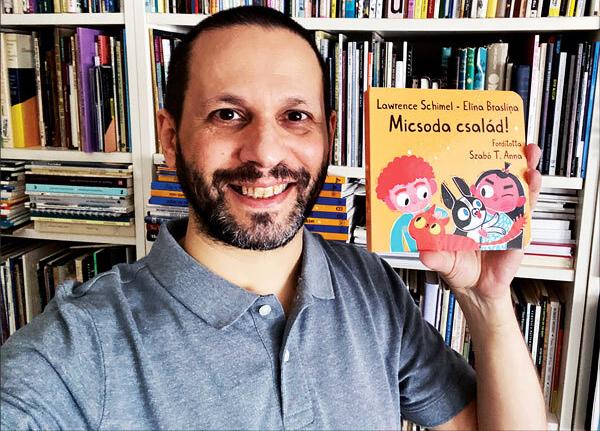
I Quote the article in double brackets
<<
...
In July, the Hungarian government imposed an $830 fine on the distributor of the Hungarian translation of Lawrence Schimel’s children’s book What a Family!, citing a law that bans the depiction of homosexuality and gender reassignment in material aimed at minors. The book tells the story of two families with young children—one with two fathers and the other with two mothers.That incident follows another in Hungary, in October 2020, when a member of parliament put a copy of Meseorszag mindenkie (A Fairy Tale for Everyone), which also features LGBTQ characters, through a shredder. “So the publisher reprinted it as a board book” said Schimel, whose book had the same Hungarian editor.
...
Schimel, an American living in Madrid, has published dozens of LGBTQ-themed works for children and adults. “It’s important for all families, not just those who are LGBTQ, to see and read these books which show just how normal these families are,” he said. What a Family! is now sold in Hungary with a sticker, warning readers that it depicts families “outside the norm.” It was originally published as two books in Spanish, and Orca Book Publishers is releasing it as two books in the U.S. in September.Russia led the way in overt European LGBTQ censorship with the passage of its “anti-LGBTQ propaganda” law in 2012. Today, LGBTQ books are routinely suppressed there, and those that make it to market are sold with warning stickers.
“The campaigns by the populist governments in Europe, such as in Hungary and Poland, against the LGBTQ community are in direct violation of the principles of inclusion and the celebration of diversity,” said Michiel Kolman, chair for inclusive publishing at the IPA. He noted that in Poland, several towns have declared themselves LGBTQ-free zones, forcing LGBTQ residents to move, while in Hungary the transgender community was first targeted, and after that the broader LGBTQ community.
“The policies manifest themselves through censorship of books and other media that directly contradict the freedom-to-publish mission of the IPA,” Kolman told PW. He added that the Hungarian laws are likely an effort to deflect attention from the country’s dismal economic and Covid-19 track record.
Following the news of the attack on Schimel’s book in Hungary, the IPA, the Federation of European Publishers, and the European and International Booksellers Federation all reaffirmed their support for Hungarian publishers and readers, and their solidarity with LGBTQ communities in Hungary.
Also in July, the government of Belarus moved to dissolve the local branch of PEN after the freedom of speech organization released a report showing 621 instances of human rights violations, including arrests and imprisonments, against culture workers in the first six months of 2021. Suzanne Nossel, CEO of PEN America, was among those around the world who issued a statement in support of PEN Belarus. “When a government silences and stomps on its writers, it reveals a level of shame and decay that leaders are aiming to hide, but instead only expose,” Nossel wrote. “Belarus’ leaders may think they can suppress the truth by muzzling those who dare tell it, but the story of the will of the people and the scale of brutal repression will find its way to the world. We stand in solidarity with the writers of PEN Belarus and are determined to ensure that their vital voices are heard and their rights to express themselves vindicated.” As recently as last week, a dissident journalist from Belarus who disappeared was found dead in Ukraine.
Nossel told PW that this type of activity is an attempt by authoritarian governments to control the narrative, both at home and abroad, in a world where information is fast moving, freely available, and difficult to suppress. She cited China and the closures of bookstores and publications that express dissent in Hong Kong as particularly egregious examples of censorship. “[The Chinese] are reaching down to destroy the remnants of any challenge to their authority,” she said. “For organizations like PEN, fighting this is an ongoing battle.”
Nicholas Lemann, director of Columbia Global Reports, a publisher that offers short books on hot political and social justice topics, noted his house has been vigilant in covering the rise of authoritarianism, the curtailing of press freedoms, and China. In May, Columbia Global Reports published The Politics of Our Time by John Judis, a one-volume contemporary history of populism, nationalism, and socialism.
Lemann, the former dean of the Columbia School of Journalism, said he routinely gets reports from former students about the rise in persecution of journalists. “In recent years, I have heard more and more often from journalists in India about Narendra Modi and in Brazil about Jair Bolsonaro and what they are doing to limit press freedoms,” he noted. “At the turn of the millennium, we thought that the triumph of the American economic system inextricably went along with the triumph of the American freedom of expression system. And we thought these would be globalized. Well, that didn’t happen,” Lemann said.
It has long been known that the Chinese government keeps a close eye on which books are distributed there and maintains control of the issuing of ISBNs. Officially, censorship is not a state policy. Publishers have long held that if a book does not become too popular or influential in China, it will be tolerated. But unofficial policy is flexible, and recent trends have shifted toward a narrowing of what is considered acceptable. For example, there’s been a crackdown in recent years on what can be published on China’s wildly popular writing websites, such as China Literature, and works that are deemed too “salacious” have been removed. Last year, Fang Fang, who lives in Wuhan and published a blog about the early days of lockdown during the pandemic, was vilified by the government. Her blog entries were collected into the book Wuhan Diary, published by HarperCollins.
In July, the Chinese government outlawed foreign direct investment in education companies. The law is aimed at companies that offer tutoring to Chinese students—a business that has ballooned to an estimated $100 billion per year. The law is likely to impact numerous foreign education publishers that have invested hundreds of millions of dollars in the sector. “The government is operating with the idea that liberal Western ideas may be damaging the children,” Nossel said.
Different countries have different means of controlling book publication and exerting censorship. In Turkey, authorities require that any book sold in bookstores has a government “banderol”—a sticker testifying to its “authenticity.” The government claims this is necessary to combat piracy, but in effect it acts as a means of regulating publishers.
In Venezuela, officially, publishers can publish anything—but they may not be able to acquire paper and ink to print certain books. The same happens in Russia, where a printer might suddenly become reticent to produce a potentially objectionable book for fear of government blowback.
IPA fights for the freedom to publish
The IPA maintains a committee that monitors freedom-to-publish issues around the world and presents an annual award, the Prix Voltaire, honoring courageous publishers that have faced oppression. To reinforce its mission to support global publishing during the pandemic, the IPA also recently launched a program to promote publishing, dubbed INSPIRE (International Sustainable Publishing and Industry Resilience). Two of the tenets of the program’s charter are maintaining that “freedom to publish is a prerequisite for diversity, creativity, prosperity, tolerance, and progress” and that “copyright and freedom to publish are mutually reinforcing fundamental rights that are essential to the practice and preservation of political culture, education, scholarship, and socioeconomic development.” The charter has garnered signatures from more than 100 organizations around the world, including Publishers Weekly.
“Many countries have introduced special laws to deal with the Covid-19 crisis,” said Kristenn Einarsson, chair of the IPA’s Freedom to Publish committee and former managing director of the Norwegian Publishers Association. “There is a growing concern that these might be maintained in the future, after the crisis has ended, and that some of them could be used to limit the freedom to publish and freedom of expression.”
Einarsson said in some authoritarian states, censorship can be internalized and become self-censorship. “The same fears that can affect publishers and lead them to self-censor can also infect authors, booksellers, and librarians. In the end, if these fears delay or stop the creation or publication of such reports and works, then it is we, the readers, who are deprived. Any discussion about what should be published is of course welcomed, but it is important that publishers stand firmly to defend the publishing of all that they deem worthy of publication, even—and perhaps especially—if those works challenge the boundaries established by the society they operate in.”
>>MY thoughts... first, governments do have the right to ban anything. all governments ban artistic content. all governments. Sequentially, suggesting any government is bad or criminal based on banning requires all governments in humanity to be imprisoned. But, communities require rules. Individualism has functional limits when one does not live alone, and each human or humanity has never been alone on earth.
Schimel's point encapsulates the problem. In most communities in humanity, the entire LGBTQ+ experience as a collection of communities or in parts is not common or public. Artist like him who want to make the activities public or common in the collective mindset have an automatic enemy in those who do not. In any community where most do not, opposition grows to where people have lgbtq+ free zones. In the usa, I don't recall any publicly touted lgbtq+ free zones.
The problem with the word populist is it means of the people. IF a government in populists and you dislike its position. You are stating you want the position that most people have under a government to be opposed. If Majority doesn't rule then who does? If minority rules, how long will the majority allow before extreme violence hits?
I wish people will stop using sars-cov-2 for everything. Every country that is doing something someone does not like is referred to in media as doing it because of the sars-cov-2 in some fashion. I wish modern media will kill that interpretation.
One thing I learned in the Ken Burns vietnam war documentary on PBS was that during the 1960s the polls was in favor of staying in the vietnam war. What is my point? Modern media makes it seem like most people didn't want to be in the vietnam war. But that is a lie. The problem with many governments in humanity is global media, global media defined as media between countries, is dominated by the usa and creates a narrative that most of the people in a country are opposed to the actions. Are most people in china, opposed to the actions by the chinese government toward HOng Kong? I don't know. I am not suggesting I support or oppose the chinese governments actions. But, I know I am not certain they are not what the majority of people in china want. And again, if the majority isn't in control, then the minority is, and how long will the majority be nonviolent to the in control minority? If the majority is in control then... what is wrong? If ninety-nine people are happy and one is not. The one person can't be in control over the other 99. The one person has to leave if they want things their way, or eat crow.
Nicholas Lemann need to define who is we, when he said :"we thought that the triumph of the American economic system inextricably went along with the triumph of the American freedom of expression system. And we thought these would be globalized. Well, that didn’t happen"
We didn't include the native american. We didn't black folk in black towns in the usa. If anything, Lemann proves why people like him failed, cause people like him assumed his agenda was similar to other people. Second, Lemann has to describe what the Statian economic system is. The USA financial model is simple. Kill a people for their land, enslave a people for their labor, and then maintain a system to maintain wealth in your community. He talks about freedom of expression. But if most black people, native americans, women in the usa circa 1865 couldn't read or write then outside talking who was expressing anything? Most of said people did not have the money<fiscal poor> or time<laborer> or situation<prison> to be at a pulpit. Lemann is wrong, Statian economic system or system of expression did become globalized. People like Lemann was confused as to what the usa was exporting.The USA is the king of using unrelated things to cover agendas. Freedom was the cover for the financially profitable drugs or arms trading zone called vietnam. Improvement of non white europeans or peace in the USA was the cover for white financed negative anti native education camps called boarding schools for native american children or the white financed colleges or associations that were fiscal class covens for black people who demand nonviolence to all in the black community against all other black people. Sars-Cov-2 is the cover for an agenda of raising the cost of living, or making media more narrower through streaming channels, deemed as the best activities to keep people safe from a virus that only a person living in a viral blockading suit can be.
SUB ARTICLE
https://www.publishersweekly.com/pw/by-topic/international/international-book-news/article/87097-censorship-on-the-rise-worldwide.html
International Publishers Association report "Freedom to Publish: Challenges, Violations and Countries of Concern"
https://www.internationalpublishers.org/images/aa-content/ipa-reports/State_of_Publishing_Reports_2020/Freedom-to-Publish-Challenges-violations-and-countries-of-concern.pdfGoodreads Ransoms, LGBTQ+ Robin, and Dolly’s Debut: This Week in Book News
MAIN ARTICLE
https://kobowritinglife.com/2021/08/13/goodreads-ransoms-lgbtq-robin-and-dollys-debut-this-week-in-book-news/
-
MAry j blige plays dinah washington,Blige is a little more chunkier but great vocal choice since they are singing all the songs. Marlon wayans may finally play another role his sister or I can watch with him. ... I think one of the most amazing things about the otis redding song is how, aretha franklin did something many black musicians did through the years, still continue to do, ala every breath you take being turned into a mortuary song. But she did it the best. She proves with her rendition of respect how underrated the way one produces an artwork gives them ownership. A person has to compose a song/write lyrics, but she proves with respect that the singing of a song is unique enough to warrant ownership. A point I think is underrated. And i know it is not legal cannon, but I think it is true musically. What would the usa anthem be without black singers? ... to the time period, ray charles/johnny cash/aretha franklin/i am forgetting the white female musican's name, the coal miners daughter, but they all came up at a time where the music industry was starting to lose its financial form from the 1800s. The days of ma rainey's black bottom where all musicians received nothing for their work was ending.
https://www.latimes.com/entertainment-arts/movies/story/2021-08-06/jennifer-hudson-aretha-franklin-respectHow Jennifer Hudson found new ‘Respect’ for Aretha Franklin in the role of a lifetime
BY LORRAINE ALITELEVISION CRITIC
AUG. 6, 2021 9 AM PT
Jennifer Hudson knew she had her work cut out for her when she agreed to play the Queen of Soul. “You just can’t wake up one morning and decide ‘I’m gonna be Aretha Franklin,’” said Hudson. “I mean, her voice. Her legacy. The songs. Who she is to all of us. It was daunting. There were times when I was like, ‘Jennifer, what have you done?’”The answer is “Respect,” the highly anticipated biopic sanctioned by Franklin, who handpicked Hudson for the role before her death in 2018. The film chronicles the late singer’s rise from her father’s church choir to international stardom, shining a light on the talent and the stories behind the songs.
“‘Respect’ is the song and the hit we all love from the gifted Aretha Franklin,” says Hudson. “But when you add her life narrative around it, it’s that much more powerful. Understanding the era she grew up in and the courage that she had and her activism. Her relationship with Dr. King and Angela Davis. It’s like, wow, you see all sides of the human and the way she used her art to reflect herself and support others and be an advocate. So now it’s more than just the song. It’s more than just the artist. Knowing her history helped me understand her legacy and understand why her impact has been so great.”
The film, which hits theaters Aug. 13 after decades of planning and a year of COVID-related release delays, moves from Franklin’s religious upbringing with the charismatic but controlling Reverend C.L. Franklin to her hard-won stardom of the 1960s to a spiritual return to gospel music with her highest-selling album ever, 1972’s “Amazing Grace.”
Rather than lip sync to pre-recorded tracks, Hudson belted out The Queen’s material live on set during filming (“Aint No Way,” “Chain of Fools,” “Think”) as did the rest of the cast — which includes Tony award winner Audra McDonald portraying young Aretha’s mother and Broadway talents Hailey Kilgore and Saycon Sengbloh playing her sisters Carolyn and Erma Franklin (the women’s harmonizing alone is worth the price of admission).
But Hudson is a singular force. The former “American Idol” contestant, who like Franklin grew up singing in church, emotes with the same passion that won her an Oscar for 2006’s “Dreamgirls,” using her powerhouse vocals to re-create iconic moments in music history including the birth of Aretha’s own sound in Muscle Shoals’ Fame studio and a knock-‘em-dead performance of the film’s namesake at Madison Square Garden. With Hudson and other music-minded folks on board, “Respect” is the rare biopic where the celebrated artist’s compositions also land a starring role.
“I wanted to make a movie where music was front and center,” said director Liesl Tommy. Known for her work on Broadway, including her Tony-nominated direction of the play “Eclipsed,” “Respect” marks Tommy’s first time directing a feature film. “Aretha was capable of so much power when she sings and so much delicacy and nuance. I wanted the way that we feel listening to her music to be the way that we felt watching the film. Another thing that guided me is that she has so much emotion in her singing. I felt that the film should be emotional too because that’s who she was. And even though she was very protective of her private life, her private life is all over her music.”
Written by Tracey Scott Wilson (a playwright who has also written for TV series including “The Americans” and “Fosse/Verdon”), “Respect” stars Forest Whitaker as Franklin’s father, Marlon Wayans as her husband and manager, Ted White, and Tituss Burgess as the gentle Reverend Dr. James Cleveland. Mary J. Blige plays diva Dinah Washington and Marc Maron is pushy Atlantic Records exec, Jerry Wexler.
“Respect” follows in the footsteps of other biopics, such as “Coal Miner’s Daughter,” “Ray” and “Walk the Line,” that dared to tackle the legacies of treasured singers. And as American icons go, Aretha is right at the top. .
The pressure of portraying her was not lost on Hudson. “I was calm on set. The freakout came later,” said Hudson recently while in Los Angeles to promote the film. She arrived to the interview wearing a necklace that spelled out “R.E.S.P.E.C.T” in gold letters. She had it made as a memento of the film because “it’s not every day you get to be the Queen of Soul,” she said, slipping on pink, fuzzy slippers after shedding a pair of deadly high stilettos she donned for a photo shoot.
Hudson worked with acting and dialect coaches for the role, and she turned to the legendary Patti LaBelle for insight into the experience of Black female artists in the 1960s. “They had a lot less freedom and women took up less space” says Hudson. “Ms. Franklin spoke up with her music.”
Hudson took her job seriously, learning to play piano for the role: “I’m really still trying to get’ Dr. Feelgood.’ I got the piano part, but now I’ve got to figure out how to sing it while playing it. It’s a process.” Slipping into fabulous reproductions of Aretha’s wardrobe was easier, though Hudson counted 83 costume changes and 11 different wigs (the beehive was her favorite). “And I loved her clothes in the birthday scene. She’s wearing a gold dress and a big fur. I couldn’t help but feel royal.”
Hudson grew up in 1980s Chicago worshipping Whitney Houston, but by the time she auditioned for “American Idol,” her song of choice was Franklin’s version of “Share Your Love With Me.” Even the jaded Simon Cowell was impressed (still, she lost the competition in 2004 when she came in seventh). But Hudson’s personal associations with The Queen’s catalogue had its disadvantages when she was prepping for the film.
“Playing her is a completely different thing from being a singer and fan who sings her songs,” said Hudson. “I mean, thank God I already knew the majority of her material. That was one less thing I had to worry about. But I remember saying on the set, ‘She doesn’t know this song yet.’ Jennifer Hudson knows the song. We all know the song. We know what it became. But in Aretha’s life, in that moment, she doesn’t. She’s learning it. It hasn’t manifested yet. We can’t overshoot the story and speak of her as who she became because we’re in the beginning phases of the making of Aretha.”
Tommy said she too had to break from her own personal associations with Franklin’s work in order to approach the story with a fresh perspective. “When you listen to music and there’s a song that you love, you’re bringing yourself to that,” said Tommy. “It’s like it becomes your personal soundtrack and it’s about your life. So there’s a detaching from how I felt when I was 8 years old that I first heard ‘Natural Woman.’ It’s not about me sitting in a window looking at the rain. It’s something else. You just have to give over to her and her story and her history and that was the great joy of this — discovering the music in a brand new way.”
Tommy and Wilson did extensive research into Franklin’s life to ensure the film was as accurate as possible, from her pregnancy at age 12 to her plight in the studio as the only female musician to her friendship with the Reverend Martin Luther King Jr. For the religious and gospel references, it helped that Wilson’s father and grandfather were Baptist ministers.
Franklin herself had also reportedly been involved in the planning of her biopic up until a week before her death, and more recently, her family and estate made themselves available to the filmmakers. The scenario was quite different for another recent television biopic, National Geographic’s four-part limited series “Genius: Aretha,” which earned an Emmy nomination for star Cynthia Erivo but was blasted by Franklin’s family for its apparent inaccuracies.
“[Franklin’s family] really trusted us, which is a great gift,” said Tommy. “I will never stop being grateful to them for how they sensed our care and sensed that we were two Black women who would die before we let anything not be right in this film. ... In the past, these stories about Black people were pretty often written and directed by white men. Aretha was so real. She was so authentic. I wanted this film to feel like it was undeniably her world and it wasn’t from some kind of voyeur’s perspective. It was from a lived-in perspective. It was really important that her realness be present inside of the film.”
Hudson met Franklin when both women were doing what they loved best: performing on stage. “I got to open up for her in Merrillville , Ind. in 2003 at one of her concerts,” says Hudson. “It was like, ‘Oh my God, I get to sing at Aretha Franklin’s show. She allowed me to do this!’ That was a moment in itself. And then after I won the Oscar for ‘Dreamgirls’ [in 2007] we had a meeting about the possibility of me [portraying] her. ... Years later she called me when I was doing [the Broadway revival of] ‘The Color Purple’ and she said, ‘I’ve made my decision on who I want to play me. It is you. Don’t say anything to a soul.’ And I’m like, ‘Yes, ma’am. I won’t.’ Now here we are. It was like holding my breath for 15 years.”
During that time, Hudson has released three albums, appeared in countless TV series and films (“Sex and the City,” “Empire,” “The Secret Life of Bees,” “Cats”), did Broadway and had a son with professional wrestler David Daniel Otunga. She also overcame the 2008 murder of her mother, brother and nephew by her sister’s estranged husband. Hudson has said she made it through the tragedy thanks to her faith.
The church is embedded in Hudson’s soul. And apparently, so is Franklin’s influence. “I didn’t realize until researching and even shooting ‘Respect’ that ‘Amazing Grace’ and ‘Precious Little Words,’ songs from her ‘Amazing Grace’ album, they were the same versions I grew up singing in church. I was brought up in a church too. We sang ‘Amazing Grace’ every Sunday. But to learn it was her renditions, it’s like wow. So she’s always been there.”
Hudson sang “Amazing Grace” at Franklin’s funeral, 50 years after Franklin sang “Take My Hand, Precious Lord” at King’s memorial. “She was courageous enough to take a stand,” says Hudson of Franklin’s involvement in the civil rights movement. “She used her platform to respond to the times. She fought so hard to get there, and that could have taken her down, but she did it. She left us an example — for us to keep pushing. That’s what got me through this whole thing — her saying, ‘Jennifer, go on.’ I’m like, ‘I don’t know if I’m as courageous as you, but if you think I can, I’m going to give it a try.’”
-
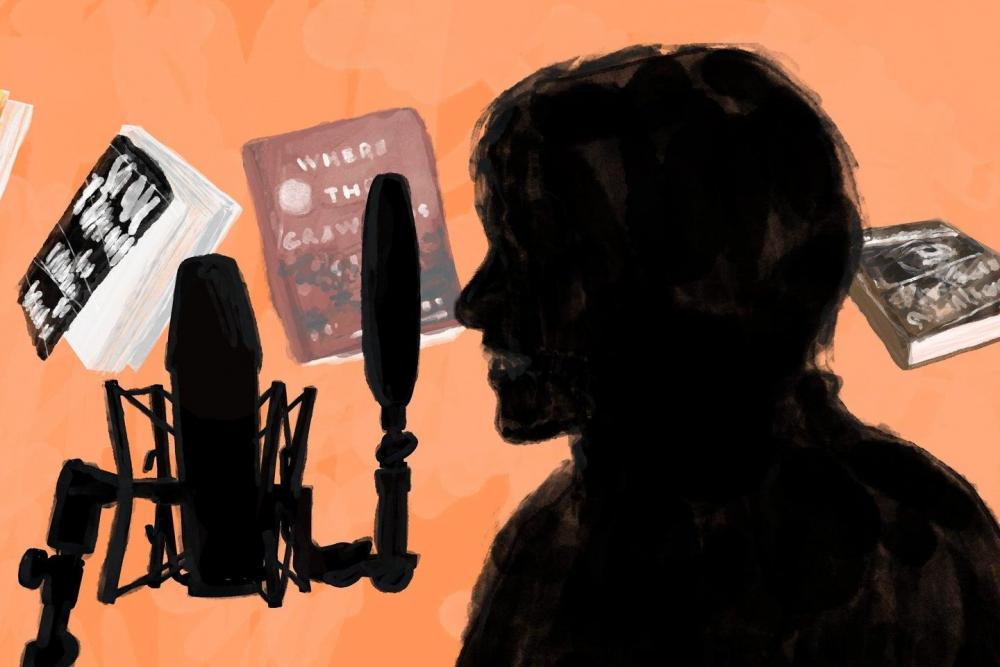
“I Probably Modeled Him on Something I’d Heard on The Wire”
The audiobook industry is collectively squirming through the cultural debate on representation and casting.
BY LAURA MILLER
Twenty years ago, Grover Gardner began narrating a series of comic mysteries whose title character is a white lawyer named Andy Carpenter. In the series—written by David Rosenfelt—Carpenter also has a partner, Willie Miller, who’s a Black ex-con, which means Gardner had to voice Miller too. Back then, he hardly gave any thought to the fact that he was a white narrator voicing a Black man. “I probably modeled him on something I’d heard on television, on Hill Street Blues, or The Wire,” Gardner said. Today, 14 books later, he’s still voicing Willie—but he’s changed his approach. “I’d think very hard about doing that kind of accent now,” he said.
In an era of heightened sensitivity to issues of representation and misrepresentation, it’s no longer acceptable to cast a white actor as a character of color in a movie or TV show. But audiobooks play by different rules. It’s customary now in the audiobook business to try to match a book’s narrator to the gender, race, and sometimes sexual orientation of a novel’s author or main character. Yet most novels feature characters with an assortment of different backgrounds, and this can require narrators to voice characters with identities very different from their own.
When audiobooks first rose to popularity in 1980s, the field was overwhelmingly white. Gardner, who has been an audiobook narrator for four decades and also works as a producer, recalls that, for the first couple of decades of his career, “the whole industry was geared toward middle-aged white businessmen” who listened to “books on tape” while on the road for work. There were hardly any narrators of color, and few female narrators back then, Gardner said. “I recorded Scott Turow’s [1990 novel] Burden of Proof. The narrator of that book is a Latino lawyer,” he told me. “I did it. We did whatever they sent us back then. But I wouldn’t do that book today. You would find a Latino narrator to do it.”
Apart from the amused response to the cartoonish accents Ronan Farrow rolled out when narrating the audio version of his 2019 exposé Catch and Kill, the audiobook world has so far been largely free of the sort of scandals that have triggered reckonings about representation in other creative industries, like magazine publishing and television. This is partly because it’s a low-profile, unglamorous field that doesn’t attract a lot of attention from the press. But many who work in the industry still feel the tensions around casting acutely. Amid a publishing boom in literature by writers of color, nonwhite narrators are being offered more work than they once were. Meanwhile, like most narrators, they find themselves getting asked to voice marginalized characters from backgrounds that bear no resemblance to theirs. January LaVoy, a biracial narrator who identifies as Black, said that cross-cultural audiobook narration is freighted in different ways for white narrators and narrators of color. “For many white narrators, it’s difficult because of fear [of backlash]. For many narrators of color, it’s difficult because of the weight of responsibility.” The industry is grappling with these issues daily. “It’s difficult for everyone,” LaVoy said.
Although some publishers have audiobook divisions, they usually function separately from the print division, and the audio rights for many titles get sold to separate companies such as Brilliance or Blackstone. The producer of an audiobook, who is employed by the publisher, acquires the rights and oversees casting and other big-picture decisions, such as opting for multiple narrators on a novel that often switches points of view.
Michele Cobb, a producer and the executive director of the Audio Publishers Association, told me that she and her colleagues have tried to figure out how they can sensitively ask narrators to provide producers with information about their backgrounds—such as gender identity, sexual orientation, and disability—that can be helpful when casting. Cobb explained that it’s an ongoing challenge to cast appropriate narrators for books by authors of color, while avoiding typecasting. In her own company, which publishes romance audiobooks, “I’ve definitely had authors come back and say, ‘Well, this character is white so I wouldn’t go with a Black narrator,’ ” a choice she feels obliged to respect.
Traditionally, both a director and an engineer, usually both freelancers, work on the recording with the narrator. Director Simone Barros outlined an exhausting list of tasks to me, from making sure the narrator doesn’t skip or add words to researching accurate regional pronunciations and maintaining continuity. “You can get to the last page of the book, and it will mention that a character had a German accent the whole time,” said Barros, speaks with the mile-a-minute lucidness of a person whose job is anticipating every contingency. Barros is of Cabo Verdean descent and identifies as Black.*
In the case of some first-person narrators, such as the one in Charlie Kaufman’s Antkind, an audiobook Barros directed, the book is “written so much within the perspective of the first person that the ethnicity of other characters are specifically heard from the narrator’s perspective of them. More specifically in Antkind, the author’s very point is this shifting, mutable and even unreliable perspective, to shine a light on how too often minority characters go unseen, or only seen or heard through a bias cipher.” But with a book written in the third person, she and her narrator will work up a full voice profile—a cache of recorded dialogue and biographical information—for each speaking character. That way, if, say, a villain appears in a novel’s first few pages only to disappear for several chapters, the narrator and director can remind themselves of what he sounds like. Such profiles are particularly helpful with recurring characters in sequels and series, which may be recorded years later.
In the past, it was largely left up to the professionals behind the scenes to anticipate and head off any problems. Ten years ago, it wasn’t uncommon for a book’s author—the person most intimately acquainted with a title—to have no input at all in the audiobook production. But as audiobooks became a more mainstream and high-profile format, authors began seeking more oversight. Today, writers often get the final say on casting, and are often invited to choose a narrator from a selection of sample recordings and encouraged to provide crucial information about how characters ought to sound. Nathan Harris, a Black writer whose debut novel, The Sweetness of Water, is set at the end of the Civil War, knew the accents of his multiracial cast of characters, who include freed slaves, would be a challenge. “You can go down a very precarious road with how they sound,” he said. “That’s why I didn’t want to do it myself.” His publisher presented him with an audition recording by William DeMeritt. “They told me they could go in all sorts of different directions if that’s what I wanted,” Harris said. “But he just nailed it.”
Over the past few years, the crew of professionals who work on a given book has increasingly been whittled down to a bare minimum, putting greater pressure on narrators’ judgment—even though a narrator, who is in most cases a freelance contractor, doesn’t have much time to carefully screen a book for potential stumbling blocks before agreeing to the job. The exploding demand for audiobooks with the advent of digital downloads and, most recently, an increasing number of home studios built during the pandemic also means that more narrators have ended up doing most of the production work and key decision-making on their own.
Some narrators say they now turn down jobs when they feel unsure about voicing major characters. Cassandra Campbell—narrator of, among other things, Delia Owens’ bestseller Where the Crawdads Sing, a novel featuring several Black supporting characters—recalled narrating the first two in a series of books, which made her the automatic choice for the third. But when she discovered that the third book was told from the point of view of a young Burmese boy, Campbell, who is white, bowed out. “I just didn’t feel comfortable with it,” she said.
A multitude of minor characters can turn an audio book into a minefield for its narrator. Edoardo Ballerini, who was profiled in the New York Times Magazine last year as “a go-to voice for intelligent, subtle but gripping narrations of books,” says he’s now most often asked to narrate books requiring European accents. (His father is an Italian poet, and he was raised in New York.) Still, challenges do arise. “Take a James Patterson book,” he explained. “Let’s say it’s set in New York City and the detective is hard-boiled, an Italian-American. I can do that. His partner is a feisty woman and I think I can handle that.” But then the minor characters start showing up, sometimes slotted into uncomfortably stereotypical roles: “They get in a cab and there’s the cabbie, or they run into a perp who happens to be Black, or whatever it is. You have to voice them as well. And there’s really no way for anyone to say, ‘Well, I’m not going to do this book because there are a handful of lines by an Indian cabbie.’ ”
Meanwhile, many narrators of color—extra-conscious of the weight of representation—find themselves engaging in a lot of extra, unpaid work researching characters and voices that they may ultimately decide they can’t do justice to. Recently, LaVoy bowed out on a title in a children’s series she narrates about a group of middle school students who travel the world with their eccentric professor, encountering mythical creatures from the cultures they visit. “When we did one that took place in the Pacific Northwest,” she said, “we got a Native American linguist from the Muckleshoot tribe to work with me. I felt really comfortable,” she said. “But this one particular book took place in Cuba, and it was very heavily written in Spanish,” a language LaVoy doesn’t speak fluently. When she got to a part where the whole group begins singing the Cuban national anthem, she decided to pass. “They needed someone with a different mouth,” she concluded.
A character’s accent can be an evocation of her origins and identity, but it can also be—as was the case with Apu, the Indian-born convenience-store clerk on The Simpsons, voiced by white actor Hank Azaria—a mocking caricature. (Azaria recently announced that he would no longer voice Apu and expressed a desire to “go to every single Indian person in this country and personally apologize.”) “Actors love to do accents!” Campbell told me. “It’s fun to do vocal gymnastics, but we have had a moment of recognizing that there are certain accents where you’re appropriating someone’s culture.”
The one motto that nearly every audiobook professional I interviewed repeated to me when I asked about their strategies for dealing with accents is “less is more.” Kevin R. Free—a Black theater actor who began narrating audiobooks 20 years ago and has become the voice of both a soap opera–addicted cyborg in Martha Wells’ Murderbot series and of Eric Carle’s iconic picture books (The Very Hungry Caterpillar, etc.)—laughingly recalled reporting for his very first recording session armed with a set of theatrically bold character voices, only to be told by his director: “I don’t want you to think of doing this book as doing a solo show. … There’s no reason for you to go all the way there.”* That holds especially true for cross-cultural accents. If Ballerini feels that “maybe I’m not the right person to give a voice to this particular character, let me just do it as plainly and as simply as I can. I think that’s a general trend that’s happening in the industry.”
Campbell explained that when voicing characters of color, she uses an acting technique that focuses on the character’s intentions rather than on more superficial markers of identity like accent. “What does the character want from the other person in the scene? What is the conflict of the scene? Play that fully without relying on cultural stereotypes.” In Campbell’s recording of Where the Crawdads Sing, she audibly dials the rural North Carolina accents of the Black characters further down than the accents of the white characters they interact with.
Sometimes, however, an accent shouldn’t be underplayed, because it serves a crucial role in the story. That can create conflict with the production or postproduction staff, if they’re not familiar with or sensitive to the cultural context of a book. Barros directed the audiobook of Simon Han’s 2020 novel Nights When Nothing Happened, about a family of Chinese immigrants living in Texas. The wife in the book becomes annoyed when her husband leaves an outgoing message on their answering machine pronouncing the family’s surname as “Chang,” as the Texans around them say it, rather than using the Mandarin pronunciation, which is closer to “Cheng.” When narrator James Chen’s recording went through a postproduction process called quality control, or QC, Barros and Chen received orders for “pickups” (short rerecordings edited into the final audiobook to correct errors) on every instance of the family’s name, instructing them to pronounce it the Anglicized way—as the Texans do. This was, as Barros put it, “not only totally wrong,” but a literal replication of the assimilation that so bothers the main character’s wife. In that instance, the producer backed Barros and her narrator, but that’s not always the case; January LaVoy wincingly recalled the time that, at a director’s insistence, she recorded pickups replacing her correct pronunciation of Latinx with latinks.
Deciding whether to use the Anglicized or loanword pronunciations can be fraught for bilingual performers. Emily Woo Zeller, a Chinese American narrator, has sometimes clashed with directors and QC over whether to Anglicize the pronunciation of words taken from other languages, such as tofu or kung fu. She is also one of the few narrators I spoke with who took the step of contacting the author of a book that she found objectionable. “I won’t name names,” she told me, “but it was a white author,” and the scene involved what Zeller called “misplaced comedy,” in which the author “mixed up Chinese and Japanese culture, and the comedy was about the way characters looked and the fact that wanted to do kung fu and they were Communists.” Deciding “this can’t come out of my mouth,” Zeller brought her concerns to the author, who, she said, was “very apologetic and willing to change it.”
Hers was an unusual move. Audiobook narrators tend to see their role as strictly interpretative. Their job is to convey the book from the author to the reader in a way that remains true to the author’s intent. This includes texts like classics, books whose authors can’t be appealed to for changes, and books that contain words, passages, and characters that are now deemed offensive. There also remain plenty of contemporary authors who, as Cobb tactfully put it, “haven’t caught up yet,” and narrators will continue to have to figure out how to perform those books.
For Grover Gardner, four decades in the audiobook industry have taught him that “where there’s ignorance, you fall back on the only things that you’ve seen or heard, and chances are very good that, if you’re an older person, you’re drawing on a stereotype.” He’s had to work to transform some of his ongoing roles from vocal clichés into full characters. In the case of the former convict Willie in the Andy Carpenter mysteries, for instance, he has consciously tried to lean less on an exaggerated accent as an actorly crutch. “I’ve tried to focus more on attitude,” Gardner said, “on the real person.”Correction, June 23, 2021: This article originally misstated that Simone Barros is Black. Barros is of Cabo Verdean descent and identifies as Black.
Update, June 23, 2021: This article has been updated to add additional comments by Barros about the narration and perspective in Antkind.
Correction, June 22, 2021: This article originally misstated that Kevin R. Free began narrating audiobooks five years ago. Free began narrating audiobooks 20 years ago.
How Stories Change When They Move From Page to Voice
Laura Lindstedt on the Different Ways We Read a Book
By Laura Lindstedt, translated by David Hackston
June 14, 2021To all intents and purposes, a psychoanalyst’s couch is in fact a bed—after all, it lacks a back and armrests. And yet, this item of furniture must be called a couch. Nobody would offload their traumas on a psychoanalyst’s bed unless, that is, they were in a relationship with said psychoanalyst.
In October 2019, I found myself sitting in the Silencio recording studios, headphones over my ears, reading aloud my novel My Friend Natalia, which had been published in Finland six months earlier.
“‘Natalia’ was one of my first clients to lie on her back without prompting,” I read and continued: “When I showed her round my office, which I had rented in an apartment next to my house, I told her about the couch.”
These two consecutive sentences are from the opening chapter of the novel. Reading these sentences aloud irrevocably sprained something in my brain.When one reads a book aloud as an audiobook, the visual aspects of the text all disappear. Of course, one could read the word couch, which appears in italics, in a slightly different way, perhaps by holding a short, artistic pause before the word. But this is not the same thing. Italics are not the same as a short pause.
The therapist, the book’s narrator, gives the patient the code-name “Natalia.” Under the cover of this anonymity, the therapist then proceeds to divulge intimate details of Natalia’s life to the reader, then at one point removes the inverted commas from Natalia’s name “as I might remove the safety catch from a gun”. When read aloud, this sentence is absurd: the listener cannot hear the inverted commas around Natalia’s name.
*
Let’s be clear: I am very skeptical about the practice of turning works of literature into audio recordings.
If audiobooks become the primary way in which we interact with books, it would be strange if at some point this did not have a direct impact on how people write literary works.
Will writers—either consciously or subconsciously—start writing books so that they sound good when read aloud? The succinct speech between Me (the writer) and You (the reader) works well when spoken aloud, so the current appetite for autofiction is unlikely to dwindle any time soon. A linear narrative, in which we already know (or think we know) something about the end point, is also easy to listen to. For this reason, celebrity autobiographies and so-called true stories make for successful audiobooks.
However, complex narrative structures, shifting perspectives, narrative polyphony, long, meandering sentences and the visual aspects of a text find themselves increasingly under threat from a medium that relies solely on hearing. If linear narrative becomes the only acceptable form of complex literary expression, our thoughts will be the poorer for it. Imaginary worlds and possibilities will shrink because such worlds and possibilities are not “content” that can be detached from “form,” they are not statements, suggestions or questions isolated from their rhetorical devices.*
That being said, I’m not a militant opponent of audiobooks. To my mind, it is simply important to recognize that there is a significant difference between the printed book and the audiobook. Written material turns into vibration, letters become sound waves. They always come from a concrete source that guides our interpretation, a source that is completely different from the reading process heard through our “inner voice.”
A new element appears between the book and its recipient: a voice that shapes how we receive the text. It is a sound born of a human body in a unique way and that is (generally) readily identifiable as the voice of a man or a woman.
In the audiobook of My Friend Natalia, this unavoidable fact becomes a poetic problem in its own right. Throughout the text, I have scattered conflicting clues as to the sex of the therapist, the novel’s first-person narrator, but I was careful never to define the therapist as either a man or a woman. With certain exceptions, in many languages a writer and a translator can easily disguise or at least avoid the matter of the narrator’s sex. A writer can also play with this ambiguity, as is the case in my novel My Friend Natalia.
Some readers have been convinced that the narrator is a man, others have considered the therapist a woman. Several readers have told me that their perception of the matter changed as they were reading. Readers always read a text through the prism of their own experiences, preconceptions and cultural stereotypes.
For this reason, I wanted to read the Finnish audiobook of My Friend Natalia myself. I am a woman, but because I am the book’s author my voice is above all an authorial voice, and in this way I feel I managed to resolve the dilemma described above.But my relief was somewhat premature. I was once again forced to confront this matter in early 2021 when Penguin Random House Audio began to produce the English-language audiobook of David Hackston’s translation of My Friend Natalia (W.W. Norton/Liveright).
PHR Audio’s producer kindly sent me a number of audio samples to listen to. All these samples were very professional and of the highest quality, but still they were unsuitable for my novel’s narrator. I started to lose hope. Was it at all possible to find an actor whose voice was neither that of a man nor a woman, a voice that wasn’t too young as it should be a voice that conveys the therapist’s wealth of professional experience? The voice also needed dash of pompous embitterment, stemming from the fact that nobody seems to value the therapist’s subtle genius.
But we were lucky, and eventually we found an excellent voice, that of the actor TL Thompson, who identifies as non-binary and whom I chose as the English-language reader for My Friend Natalia.
Thompson’s voice is characterful, mesmerizing and unforced. To my own ear, Thompson’s voice sounds more masculine than feminine, or perhaps it’s the whisky baritone of an elderly lady. However, the voice is not remotely “gender-neutral,” a voice-type that we tried to look for at first and whose very existence I have seriously begun to doubt. Thompson’s voice made every sentence oscillate between the two. I have not written such oscillation into my novel, let alone a gender-neutral narrator’s voice: the question of the therapist’s identity opens up—if, indeed, it opens up at all—when readers find themselves indulging in assumptions that the text does not affirm.
I can say quite whole-heartedly that I love Thompson’s reading. Yet in the same breath, I must reiterate what I have already said: an audiobook is a different entity from a printed book.
*
For me, the act of interpretation is specifically that of thinking with the book. It requires stops, pauses, flicking through the pages, making notes in the margins. The book takes on markings, layers that are missing from digital products, which are perpetually new.
We can browse with our eyes but not with our ears, as my partner, who works with sound, would put it. The ear is more sensitive to chaos and clamor than the eye. Sound operates like a one-directional timeline, a surge that is hard to control. A detailed auditive perception of a large space is simply impossible.It is to these very layers that I return when trying to form an understanding of the kind of book I am reading. I can easily locate markings I have made by flicking through a book, even if it is a book I read 20 years ago.
The various temporal strata of my home library provide a shadow story of what has touched me and who I have been throughout my reading life. Last summer I awoke to the immeasurable value of these little scribblings when going through my grandmother’s estate after she died at the age of 100. From the collection of religious books, treatises and notebooks, I saved those in which my grandmother had left some kind of mark—and exclamation mark, a line under a section of text, or a Biblical verse in the margin. These markings reveal not only what touched her and who she was; they also say a lot about where I have come from, what kind of supra-generational reality I carry with me.
New works from Dr. Martin Luther King Jr.’s archives will finally be published, starting next year.
By Dan Sheehan
June 23, 2021, 11:21amThe publishing giant HarperCollins has reached an agreement with the estate of Dr. Martin Luther King Jr. to acquire world publishing rights to the late Civil Rights leader’s entire archives—a collection which contains some of the “most historically important and vital literature in American history.”
As reported by Publishers Weekly earlier today< read below > , the mega-deal gives HarperCollins world rights “to publish new books from the archives across all formats, including children’s books, e-books, audiobooks, journals, and graphic novels in all languages.”
Given the significance of the books in question, it seems strange that a deal like this one wasn’t made sooner, but this is welcome news nonetheless.
More welcome still is HC’s assertion that it will hire a dedicated archivist to oversee the project, and “engage prominent Black scholars, actors, artists, performers, and social activists to help bring Dr. King’s works to life.”
Way back in 1958, HC’s predecessor company Harper & Brothers published Dr. King’s very first book, Stride Toward Freedom: The Montgomery Story, which detailed the 1955–56 Montgomery bus boycott and described the conditions of African Americans living in Alabama during the era.
The first MLK titles to be published by HC are scheduled to drop in January 2022, to coincide with Martin Luther King Jr. Day.
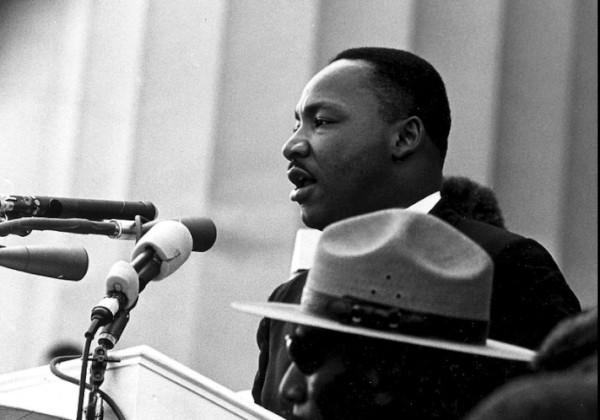
HC Inks Deal with MLK Jr. Archives
By Rachel Deahl | Jun 23, 2021In an agreement with the estate of Dr. Martin Luther King, Jr., HarperCollins has acquired world publishing rights to the archives of the civil rights leader. The publisher said the collection features some of the "most historically important and vital literature in American history."
Judith Curr, president and publisher of HarperOne Group, negotiated the deal with Amy Berkower, president, Writers House and agent for the King estate; and Eric D. Tidwell of Intellectual Properties Management, manager of the King estate. The deal gives HC world rights to publish new books from the archives across all formats, including children’s books, e-books, audiobooks, journals, and graphic novels in all languages.
HC said it plans to hire an archivist who will oversee the material in the archive and make it "available to all HarperCollins editors globally." HC added that it intends to "engage prominent Black scholars, actors, artists, performers, and social activists to help bring Dr. King’s works to life."HC also has history with King. A predecessor company to HC, Harper & Brothers, published King's first book, Stride Toward Freedom: The Montgomery Story, in 1958.
All current his King titles, including those published by Beacon Press, will continue to be publishing by their current rights holders.
“We are thrilled to be the official publisher of Dr. Martin Luther King Jr.’s archives,” said Curr in a statement. “We view this as a unique global publishing program."
The first King titles to be published by HC are scheduled to drop in January 2022, coinciding with Martin Luther King Jr. Day.
SOURCE ARTICLE
Kobo Emerging Writer Prize, Books for Palestine, and an Intro to Booktok: This Week in Book News
https://kobowritinglife.com/2021/06/25/kobo-emerging-writer-prize-books-for-palestine-and-an-intro-to-booktok-this-week-in-book-news/
-


Following Naver's $600 million acquisition of Wattpad earlier this year, Wattpad and Naver's Webtoon are merging their film and television production studios under the name Wattpad Webtoon Studios. Aron Levitz, who previously oversaw Wattpad Studios, will serve as president of combined group.
"One of the best things about Wattpad Webtoon Studios is that we’re format agnostic, we have incredible IP with built-in fans in every genre, and stories that already travel across borders," said Ashleigh Gardner, deputy general manager for publishing of Wattpad Webtoon Studios. "We have access to some of the biggest libraries of stories and digital comics on the planet, with stories in every genre you can imagine."
Naver is supporting the new studio with an investment of $100 million in content development and production financing. The studio will use data to determine the most popular stories and attempt to ascertain their potential for success in the broader marketplace as TV shows, films or books.
"This commitment reflects Naver’s confidence in our team’s ability to create incredible books and industry-leading entertainment that fans will love in any format," Gardner said, adding that the formation of the studio and investment will enable Wattpad to move faster, to adapt stories for new formats and audiences.
-

OverDrive to Acquire Kanopy
June 9, 2021
2021, PRESS RELEASES
OverDrive Library and College Partners to Benefit from Kanopy’s Acclaimed Video Catalog, Platform and Apps
CLEVELAND – June 9, 2021 – OverDrive, the leading digital reading platform for libraries and schools worldwide, announced today that it is acquiring Kanopy, a leading video streaming service for public and academic libraries.
OverDrive to Acquire Kanopy - OverDrive
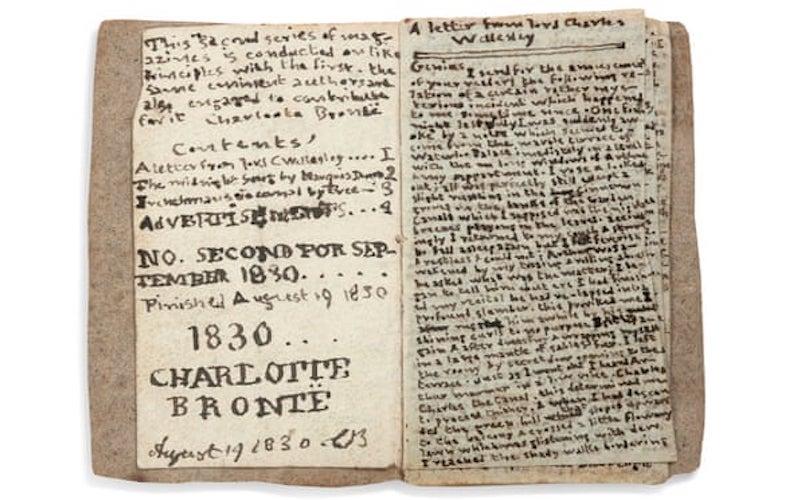
Brontë enthusiasts have banded together to stop Sotheby’s from auctioning off rare manuscripts.
By Walker Caplan
June 22, 2021, 1:37pm
Last month, Sotheby’s announced that a collection of rare Brontë-affiliated manuscripts, most notably a volume of 31 handwritten poems by Emily Brontë, was slated for auction along with other manuscripts by Robert Burns and Walter Scott. Now, Sotheby’s has agreed to delay their auction, as a group of British libraries and museums have announced their attempt to purchase and preserve the collection for the public. The time frame of the auction delay has not been publicly announced.
The aforementioned manuscripts are all part of a private library, the Honresfield Library, collected and kept in the 1800s by Alfred and William Law; after Alfred’s nephew, inheritor of the library, died, the collection disappeared from public view and was thought to be lost to the ages.
-

BEFORE YOU READ THE ARTICLE BELOW, I have a question
Where are the publishers for thoughts from non white communities in the usa, that are negatively biased toward others?
THE GREAT RIGHT-WING PUBLISHING DIVIDE WIDENS
Mike Pence and Jared Kushner are writing for establishment players, as Mark Meadows and Peter Navarro head to a conservative upstart. So where does Donald Trump end up?
BY CALEB ECARMA
JUNE 17, 2021
Right-wing authors struggling to ink book deals—like Missouri senator Josh Hawley, whose deal with Simon & Schuster was nixed after he seemingly cheered on the January Capitol riot—can take heart: A pair of conservative publishing executives have united to bring them hope. Louise Burke, a former top publisher at Simon & Schuster, and Kate Hartson, the former editorial director at Hachette Book Group’s Center Street imprint, are launching All Seasons Press, a company that, by its own definition, is “open to welcoming those authors who are being attacked, bullied, banned from social media, and, in some cases, outright rejected by politically correct publishers.”
Uproar over right-wing figures’ publishing deals has come to a head of late. In April, about 14% of Simon & Schuster employees signed a petition calling for Mike Pence’s book deal to be dropped, saying that publishing the former vice president amounted to “legitimizing bigotry.” (Simon & Schuster CEO Jonathan Karp ultimately ignored the petition request, writing in a letter to staff: “We come to work each day to publish, not cancel, which is the most extreme decision a publisher can make.”) Burke told the Wall Street Journal that she is “increasingly concerned and somewhat outraged about what’s going on in terms of free speech and free press” and fears the “canceling of voices that…are meeting resistance from mainstream publishers, particularly former [Donald] Trump administration members.”
While Burke noted that there is already “competition” in the conservative publishing industry, which includes Regnery and Random House’s Crown Forum imprint, she still believes there’s “room for another publisher, especially one that will be as independent as we are.”
Already, All Seasons Press has illuminated an interesting dividing line in terms of the Trumpers it plans to publish. There are those like former Trump chief of staff Mark Meadows, former White House adviser Peter Navarro, and ex-Rush Limbaugh producer James Golden who have migrated to the publisher, according to the Journal. (Hawley, for his part, found an alternative publisher in Regnery.) In an email to the outlet, Navarro claimed the publishing world has “devolved into a Cancel Culture, Virtue Signaling cesspool,” adding, “it is refreshing to see a new publishing house emerge willing to print books such as my forthcoming volume in the Fall that will speak truth to power.” Then there are those like Pence and Jared Kushner, whose deal with Broadside Books, an imprint of HarperCollins, was announced this week—the names so recognizable that publishers have seemingly calculated that the headache of printing their work is, financially speaking, worth the hassle of potential blowback.
Still up in the air is Donald Trump himself. The former president claims he is “writing like crazy,” working on a memoir of his time in office. He also claims he’s rejected offers from two unnamed major publishing houses. But sources at Penguin Random House, Hachette Book Group, HarperCollins, Macmillan Publishers, and Simon & Schuster—the Big Five publishers—recently told Politico they were unaware of any such offers. The outlet also reported that publishing executives are concerned that signing a deal with Trump could result in a staff uprising and other signed authors walking out in protest.
Books about Trump and his presidency, however, are still in demand. Michael Wolff’s Landslide: The Final Days of the Trump Presidency will be released on July 27, and Wolff said on Twitter that an excerpt of the book will appear in a New York magazine cover story on July 5. The book’s publisher, Henry Holt and Company, described it thusly: “In Landslide, Wolff closes the story of Trump’s four years in office and his tumultuous last months at the helm of the country, based on Wolff’s extraordinary access to White House aides and to the former president himself.”
The Great Right-Wing Publishing Divide Widens | Vanity Fair
-
-
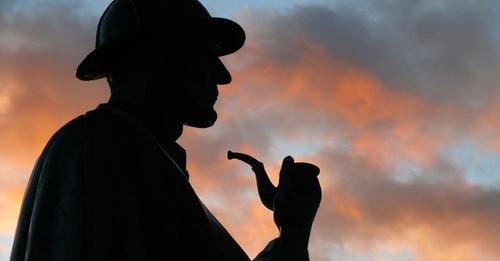
Are Fictional Characters Protected Under Copyright Law?
July 14, 2021 by Kathryn GoldmanToday’s post is from intellectual property attorney Kathryn Goldman (@KathrynGoldman) of the Creative Law Center.
Jack Ryan, the analytical, yet charming CIA analyst, made an appearance in federal court in Maryland earlier this year. The heirs to Tom Clancy’s literary legacy are fighting over him. Unlike in the movies, he’s not in a great position to fight back.
It all started when Clancy signed the publishing deal for The Hunt for Red October where Jack Ryan made his debut in 1984. In a departure from common practice, Clancy transferred his copyright in Red October to the publisher. A few years later, Clancy realized his mistake and was able to negotiate return of the copyright for the book. He immediately transferred the reverted copyright to his company.
Here’s the crux of the current court battle: When Clancy mistakenly transferred his copyright in the book Red October to the original publisher, did the copyright to the character Jack Ryan go with it? Or did Clancy retain the character copyright? In normal practice, the sale of the right to publish a copyrighted story does not stop the author from using its characters in future works.
If Clancy retained the rights to the character when he signed the initial publishing contract, then the rights that reverted from the publisher would not have included the copyright for the character. The reverted rights Clancy turned around and transferred into his company would not have included the character rights. All of which means that the character, Jack Ryan, is part of Clancy’s estate and not controlled by the company he set up.
Jack Ryan is a valuable character with his own copyright separate from the copyright in the book. Everybody concerned, the owners of the company and the heirs to the estate, wants a piece of him, or all of him. And it’s not clear where Mr. Ryan currently resides.
Fictional characters are not listed in the copyright statute as a separate class of protectable work. There’s no application at the Copyright Office for them. But over the years, the law on character protection has evolved.
Courts have held, in certain circumstances, that fictional characters are protectable in their own right.
This is important because characters with independent copyright can be licensed separately from the stories in which they originally appeared. It’s another way for authors to divide their rights to create multiple income streams. That’s the beauty of copyright. It’s divisible. An author can keep some rights and license others. It’s what Clancy did and his company/estate is still doing with the Jack Ryan franchise.
Not every character can be protected by copyright. Stock characters cannot be protected—a drunken old bum, a slippery snake oil salesman, a hooker with a heart of gold, a wicked stepmother, a gypsy fortune teller, and so on. They are essentially ideas for characters, vague and lightly sketched. Copyright does not give anyone a monopoly on ideas. Protecting stock characters would prevent as yet untold stories from being told. Depriving the world of new stories is exactly the opposite of what copyright is intended to promote—the creation of more stories, more art.
A character must be well delineated to be protected.
It must have consistent and identifiable character traits and attributes so it is recognizable wherever it appears. Think James Bond and his distinctive character traits: his cool demeanor; his overt sexuality; his love of martinis “shaken, not stirred”; his marksmanship; his “license to kill”; his physical strength; and his sophistication. Bond is protected by copyright. The Bond character is identifiable regardless of who depicts him.Defining the well-delineated character can be difficult. Characters that are central to a story tend to change. They evolve. They are built up throughout the book until they are fully formed in the mind of the reader. Without character transformation there is no hero’s journey, no story. Characters can become more delineated and more protectable over the course of a series of books. Bond developed over the course of 14 books written by Ian Fleming and continues to develop on film.
Characters that are less developed are less likely to be protected. Those characters are less expression and more idea. There’s a gray area that needs to be navigated when balancing the protection for original characters but leaving character ideas in the public domain free for all to use.
Public domain characters cannot be protected
But new characters created from public domain works can be protected. Consider Enola Holmes, the younger sister of Sherlock. The Sherlock Holmes stories have been slipping into the public domain for years now, to the chagrin of the estate of Arthur Conan Doyle. The creative elements of Sherlock Holmes stories that are in the public domain can be used by others to build new stories.Enola Holmes was introduced to readers in a series of young adult books written by Nancy Springer. Enola does not exist in the Conan Doyle canon; she was created by Springer. She has distinctive traits (high intelligence, keen observational skills and insight, skills in archery, fencing, and martial arts, an independent thinker who defies Victorian norms for women) that combine to make her well delineated and protectable.
Another wrinkle: “The story being told” test
The “well delineated character” is the most widely accepted legal test used to decide whether a fictional character is protected by copyright, but it is not the only one. The other is “the story being told” test. Sam Spade is responsible for this test.Dashiell Hammett created Sam Spade when he wrote The Maltese Falcon. Hammett licensed the exclusive rights to use the book in movies, radio, and television to Warner Brothers. Hammett later wrote other stories with Sam Spade. Warner Bros. complained that it owned exclusive rights to the character and Hammett couldn’t write about him anymore.
Ironically, the court protected Hammett’s right as the creator to use Sam Spade in future stories by deciding that the character was not protected by copyright. Sam Spade is just a vehicle for telling the story and is not the story itself. He is the chessman in the game of telling the story. It was the story that was licensed to Warner Bros., not the chessman.
A character is protected under the “story being told” test when he dominates the story in a way that there would be no story without him. This test sets a high bar for character protection. To protect the character, the story would essentially have to be a character study. The Maltese Falcon is not a character study of Sam Spade.
An example of character protection using the “story being told test” is the Rocky franchise. A screenwriter wrote a story on spec using the characters Rocky, Adrian, Apollo Creed, and Paulie. The work was considered to be an infringing use of the characters. The characters were protected because the movies focused on the characters and their relationships, not on intricate plot or story lines. The characters were the story being told. The writer could not avoid the infringement touchpoint of substantial similarity when he took the characters and used them in a new storyline.
In summary
Fictional characters can lead a new and independent life completely separate from the original work in which they appear. They are an additional creative asset in a writer’s intellectual property portfolio. There is no straight forward way to register for character protection with the Copyright Office other than as part of the larger work. Authors will be well served to think about protecting the rights in their characters when signing publishing contracts and licensing agreements.Kathryn Goldman
Kathryn Goldman is an intellectual property attorney and Editor-in-Chief at the Creative Law Center. She represents, writes for, and teaches creatives and entrepreneurs about copyright and content protection, trademark basics and branding, and business building. She can be reached at Kathryn@creativelawcenter.com.ARTICLE LINK
https://www.janefriedman.com/are-fictional-characters-protected-under-copyright-law/COMMENTS IN ARTICLE
Fan fiction is a hot button for many professional writers. Broadly speaking, if the fan fiction is written by a non-professional and is non-commercial then it is more likely to be considered fair use, an exception to infringement. However, even if the work is not professional and not commercial, many writers consider fan fiction an infringement.
My purpose in writing this post is to make writers aware that their characters can have individual protections. It is a concept that should be considered when licensing the work, in an option agreement for instance. I have seen requests from producers to option not just the work, but certain characters in the work. Writers need to consider how they want to deal with those requests when they come. You do not need a multi-million dollar franchise to start thinking about it.I will say one thing first, lawyers always reveal the most interesting legal battles in various subjects. I knew of none of these incidents. Thank you Ms/Mrs Goldman and as always thank you Jane Friedman for sharing.
I admit I wanted to have my first fan fiction this year and I failed. I like to create something I never did before each year. But this article made me realize I made two errors.
My first error was my inability to make a fan fiction. I am an original creator and every time I tried i kept making a world or characters that have no plot connection to the source fiction or characters. Imagine a story supposed to be set in the same world as harry potter but is primarily concerned with a magical detective agency in calcutta during the mughal era where the magicians don't use wands and the plot never goes to europe or the usa or mentions any spells in harry potter or any of the references of the movies or books. Is that fan fiction? or merely fiction that a writer has to say is based in the harry potter world?
But after this article, I made a second. I didn't put enough thought into the whole activity of fan fiction, especially to work that is not in a public domain. I am glad I failed to continue the use of the world or characters in the material I wanted to make fan fiction for. I still will like to try it. but I will start with a better dialog with the author. that is first
COMMENT ON FACEBOOK POST
Wiley Saichek
Jane Friedman My client Chelsea Quinn Yarbro (we ran an excerpt from her book on writing a few years ago) is one of those writers who are extremely protective of her characters and does not grant anyone the usage of her characters in fan fiction, even in amateur publications, not for profit outlets. From her point of view and her lawyers at the times, distribution is a key factor, not whether the infringing fan writer makes any money off of it.
My personal suggestion is if anyone wants to use a character they did not create, ask the copyright holder's permission and respect their decision. I.e. Quinn has written stories in the Holmes universe but got permission from the estate and had rules to follow.
Quinn's most serious case of infringement happened in the 1990s, she wrote two essays about it in a SF publication in 1992. In her case she was asked and said no, and the fan writer wrote it anyway and it ran in a fanzine with a note acknowledging CQY declined permission but they were going to run it anyway and hope she will forgive them. I think they actually used three of her recurring characters.
Many fans and writers disagree with how she handled it, but she has zero sense of humor about it. -
James Baldwin’s Advice on Writing
BY MARIA POPOVAIn 1989, Paris Review founding editor and trailblazing interviewer George Plimpton edited a wonderful collection titled The Writer’s Chapbook: A Compendium of Fact, Opinion, Wit, and Advice from the 20th Century’s Preeminent Writers (public library) < https://www.worldcat.org/title/writers-chapbook-a-compendium-of-fact-opinion-wit-and-advice-from-the-20th-centurys-preeminent-writers/oclc/19130744&referer=brief_results > . Among them was novelist, poet, essayist, and playwright James Baldwin (August 2, 1924–December 1, 1987), whom Plimpton had interviewed on two separate occasions in early 1984, half a century after Baldwin read his way out of Harlem < https://www.brainpickings.org/2015/04/10/a-rap-on-race-james-baldwin-reading/ > and into the pantheon of literary greatness.
In a fantastic addition to the collected wisdom of celebrated writers, Baldwin looks back on his formidable career and shares what he has learned about the creative process, the psychological drivers of writing, and the habits of mind one must cultivate in order to excel at the craft.
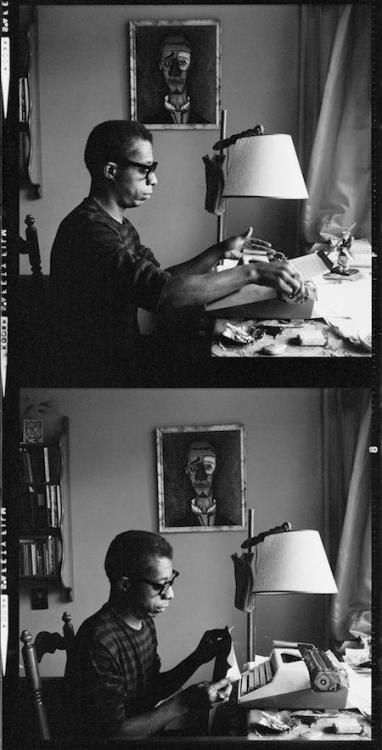
Reflecting on what motivates great writers to write — an enduring question also addressed beautifully by George Orwell, David Foster Wallace, Italo Calvino, and William Faulkner — Baldwin sides with Bukowski and argues that the supreme animating force of the writer is the irrepressible impossibility of not-writing:"Something that irritates you and won’t let you go. That’s the anguish of it. Do this book, or die. You have to go through that. Talent is insignificant. I know a lot of talented ruins. Beyond talent lie all the usual words: discipline, love, luck, but most of all, endurance."
Endurance, indeed, is perhaps the sole common denominator among successful authors. Any aspiring writer, he admonishes, should have no illusion about the endurance required but should want to write anyway. A generation after Jack Kerouac considered the vital difference between talent and genius, Baldwin notes:
"If you are going to be a writer there is nothing I can say to stop you; if you’re not going to be a writer nothing I can say will help you. What you really need at the beginning is somebody to let you know that the effort is real."
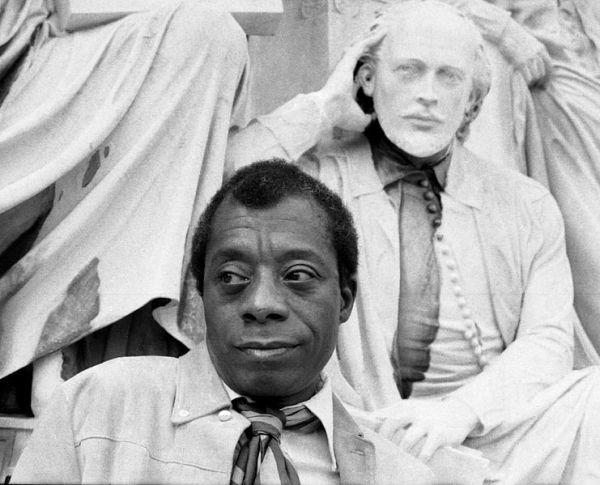
In a sentiment reminiscent of Joan Didion’s observation that she writes in order to gain better access to her own mind, Baldwin speaks to the consciousness-clarifying function of the creative impulse:
"When you’re writing, you’re trying to find out something which you don’t know. The whole language of writing for me is finding out what you don’t want to know, what you don’t want to find out. But something forces you to anyway."
Much of that self-revelation, Baldwin points out, happens not during the first outpour of writing but during the grueling process of rewriting. Echoing Hemingway’s abiding wisdom on the crucial art of revision, he adds:
"Rewriting [is] very painful. You know it’s finished when you can’t do anything more to it, though it’s never exactly the way you want it… The hardest thing in the world is simplicity. And the most fearful thing, too. You have to strip yourself of all your disguises, some of which you didn’t know you had. You want to write a sentence as clean as a bone. That is the goal."
But as essential as that sense of incompleteness may be in guiding the revision process, it must be mediated by the awareness that completeness is a perennial mirage. (Decades later, Zadie Smith would observe in her ten rules of writing: “Resign yourself to the lifelong sadness that comes from never being satisfied.”) Baldwin offers:
"When you’ve finished a novel, it means, “The train stops here, you have to get off here.” You never get the book you wanted, you settle for the book you get. I’ve always felt that when a book ended there was something I didn’t see, and usually when I remark the discovery it’s too late to do anything about it."
Adding to the endlessly fascinating daily rhythms of great writers, which reflect the wide range of differences in the cognitive conditions of the ideal writing routine, Baldwin shares his work habits:
"I start working when everyone has gone to bed. I’ve had to do that ever since I was young — I had to wait until the kids were asleep. And then I was working at various jobs during the day. I’ve always had to write at night. But now that I’m established I do it because I’m alone at night."
Complement The Writer’s Chapbook — a treasure so wisdom-packed that it is a tragedy to see it fall out of print — with Joseph Conrad on what makes a great writer, Willa Cather on the life-changing advice that made her a writer, and Jane Kenyon on what remains the finest ethos to write and live by, then revisit Baldwin on the artist’s role in society < https://www.brainpickings.org/2014/08/20/james-baldwin-the-creative-process/ > and his terrifically timely conversation with Margaret Mead about race and identity. < https://www.brainpickings.org/2015/03/19/a-rap-on-race-margaret-mead-and-james-baldwin/ > Public Library Link < https://www.worldcat.org/title/rap-on-race/oclc/140398&referer=brief_results >
ARTICLE
https://www.brainpickings.org/2016/02/08/james-baldwin-advice-on-writing/ -
I concur with the article but I want to add one question the article doesn't go into. Why was the work of the Reids not popular? the Cosby show was around? why wasn't the work of the Reid's popular? I think I know. The Reid's work like Good Times in its John Amos side Esther Rolle years tackled issues. And, the sad truth is, the black audience that as enamored with the cosby show was ashamed /disinterested/wanted freedom from/didn't want to tackle issues that go beyond, feel good/feel better/all you have to be is about you
Tim And Daphne Maxwell Reid's Pioneering Work In Film And TV Was Ahead Of Its Time
Tim and Daphne Maxwell Reid probably haven't quite gotten the appropriate acknowledgment for their pioneering work in TV, over the course of about a decade (late 1980s to 1990s), with 3 TV series created over that time period, on 2 different networks (they both appeared in other TV shows, but I'm emphasizing those that originated with them). In a time when showrunners of African descent like Shonda Rhimes and John Ridley are common, and who are celebrities in their own right, it might be easy to forget the likes of the Reids, who came before them, and, we could even say, paved the way.In addition to the critically-acclaimed Frank's Place, which aired on CBS, but didn't last long due to weak ratings, the Reids also created a Showtime half-hour dramedy series titled "Linc's" which was set in a black-owned Washington, D.C. bar and grill. And there was also Snoops, a Hart to Hart-esque scripted dramedy series that centered on a crime-solving couple, which also aired on CBS, and, like "Frank's Place" and "Linc's," didn't last very long.
Frank's Place tackled sensitive issues and was a hit with critics, but it just never found a big enough audience, which was unfortunate.
Snoops wasn't as critically-acclaimed, but was fresh enough (how many other series in the late 1980s, early 1990s centered on a black husband and wife criminologist couple who solved crimes?). However, it too never caught on with audiences. I like to say that, with both series, the Reids were maybe a bit ahead of their time. I'd like to believe both series (especially Frank's Place) would've been far more successful a decade+ later. I think revisiting/rebooting them today might be worth a consideration, especially as TV networks are remake/reboot happy currently.
And Linc's, which came years after the first two series, was an ensemble comedy starring Steve Williams in the title role as the pub's conservative owner; also Frank's Place alum Pam Grier co-starred, playing Eleanor, a children's activist and Linc's liberal love interest; and Georg Stanford Brown played Johnnie, an ethically challenged lobbyist. Also, Golden Brooks would make her TV series regular debut on "Linc's" which also featured numerous guest-appearances including Phylicia Rashad, Kadeem Hardison, Dennis Rodman, Richard Roundtree, and many others.
Tim Reid stayed behind the camera while Daphne appeared in a few episodes.
Linc's was the first TV series to be shot at Reid's own New Millennium Studios, a stand-alone movie and TV studio in Petersburg, Va., he had up and running for a year at the time. And that's another noteworthy item to consider as part of their legacy - they owned a physical studio where films and TV shows were sometimes shot. However, as we mentioned a couple of years ago on this blog, they had to sell the studio because business wasn't as active as they needed it to be, to continue to own the lot. As I recall, Reid spoke of a lack of incentives to attract filmmakers to Virginia, so business overall was dry for them, and they sold New Millennium - a 60-acre backlot - to a company that said they'd use the space for storage. Except for Tyler Perry's studio in Atlanta, throughout recent film and TV history, there haven't exactly been many black owners of massive studio lots, where Hollywood and non-Hollywood films and TV series have been filmed.
Dozens of studios that made so-called race movies flourished early in the 20th century, however, Reid's was really the first attempt in the previous 50 years to replicate that brand of self-reliance. Linc's was filmed at New Millennium Studios.
They also produced a few feature-length films, like Once Upon a Time... When We Were Colored, which Tim Reid directed as well.
The Showtime series gave the husband and wife team some freedom in terms of what they could do, since it was on a premium cable TV channel. So there's obviously some adult language use, "sexual situations," although nothing explicit (but to see an ensemble cast of mostly 50-something-year-olds being sexually active in a TV series isn't exactly common); and they also took the opportunity to be "politically incorrect," and, like Frank's Place, tackled a variety of issues of importance to the black community, not necessarily afraid to be controversial - at least, as controversial as Tim and Daphne Reid could be.
Like Frank's Place, Linc's had no laugh track, which was a good thing. It aired on Showtime for two seasons from 1998 to 2000 before being canceled. After cancellation, it was briefly syndicated on BET.
But like Frank's Place and Snoops, Linc's isn't available on any home video format at this time - at least, nothing easily accessible. I recall that, in the case of Frank's Place, Reid mentioned some music rights issues which were getting in the way of a proper DVD/Blu-ray release of the series. That was at least 7 years ago; and nothing's been done (nothing that I'm aware of) since then, despite the fact that there's an audience for it today - those who remember it, and those who have never even heard of it, but who may want to visit it, especially in this era of binge-watching old TV series on Netflix, am*zon, Hulu, etc.
This is recent black TV history that's being entirely unacknowledged, and I think that's unfortunate. Some props are due here for what the Reids accomplished as TV content creators who came before the current crop, creating and producing 3 different series over a decade, affecting the landscape in terms of representations of black people on-screen, and owning a massive studio lot as well.
Editor's note: This post was originally published by Shadow and Act founder Tambay Obenson in 2016.
-

Oxford University Press to end centuries of tradition by closing its printing arm
Oxford University’s right to print books was first recognised in 1586, in a decree from the Star Chamber. But the centuries-old printing history of Oxford University Press will end this summer, after the publishing house announced the last vestige of its printing arm was closing.
The closure of Oxuniprint, which will take place on 27 August subject to consultation with employees, will result in the loss of 20 jobs. OUP said it follows a “continued decline in sales”, which has been “exacerbated by factors relating to the pandemic”.
Oxuniprint’s closure will mark the final chapter for centuries of printing in Oxford, where the first book was printed in 1478, two years after Caxton set up the first printing press in England. There was no formal university press in the city over the next century, but the university’s right to print books was recognised in a decree in 1586, and later enhanced in the Great Charter secured by Archbishop Laud from Charles I, entitling it to print “all manner of books”.
OUP has existed in a recognisable form, with its own printing division, since the 17th century, printing everything from the King James Bible to scholarly works. It has outsourced the printing of its own books since 1989, with subsidiary Oxuniprint in Kidlington the last vestige of its rich printing history, working for clients including Oxford University and the NHS, as well as supplementary material for OUP itself.
“Oxuniprint is the latest iteration of OUP’s print division which has been around for centuries,” said Dr Jude Roberts, chair of the Unite union branch at Oxford University Press. “The idea of Oxford University Press as a press has always been fundamental to what we do. It’s not just about the content, although obviously that is important, it’s also about the quality of our publications as cultural artefacts. It’s much more difficult to control that quality when the physical books and journals are produced by somebody else.”
Oxuniprint’s closure was condemned by Unite, which blamed OUP’s increasing outsourcing abroad and its failure to take up the government’s furlough scheme.
“This is the final chapter in a distinguished printing history at the OUP, but we feel that there could have been a different outcome if OUP bosses had not been hell-bent on pursuing their outsourcing agenda,” said Unite regional officer Kevin Whiffen. “There is not much loyalty to the centuries-old printing heritage, and those who have given their working lives to it.”
Roberts said that the 20 affected staff are now all in individual consultations about their own redundancies. “The press has said that they are going to attempt to find alternative roles for them. But the fact is that the work that these guys do is so specific, it’s so highly skilled in this particular area, and we don’t do any of that work now without them, so it’s hard to imagine where they could be placed elsewhere in the press. It’s absolutely awful.”
A spokesperson for OUP said: “This decision follows a recent business review of our operations. This has not been an easy decision for us, and we thank the team for the support and dedication to OUP, and their clients, over the years.”



